(NUPRC)
Coast Now Clear for Fubara, State Lawmakers’ Return


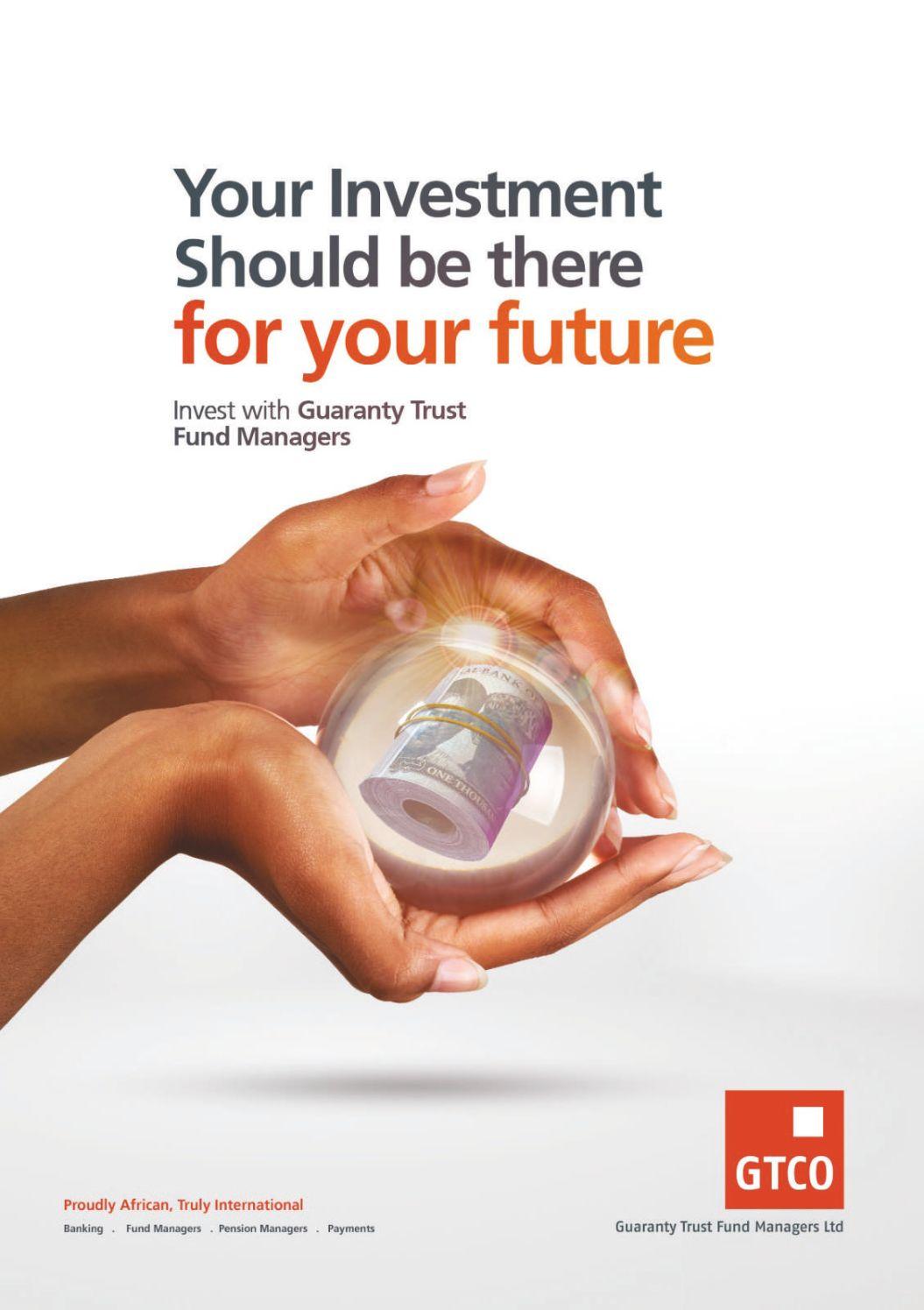



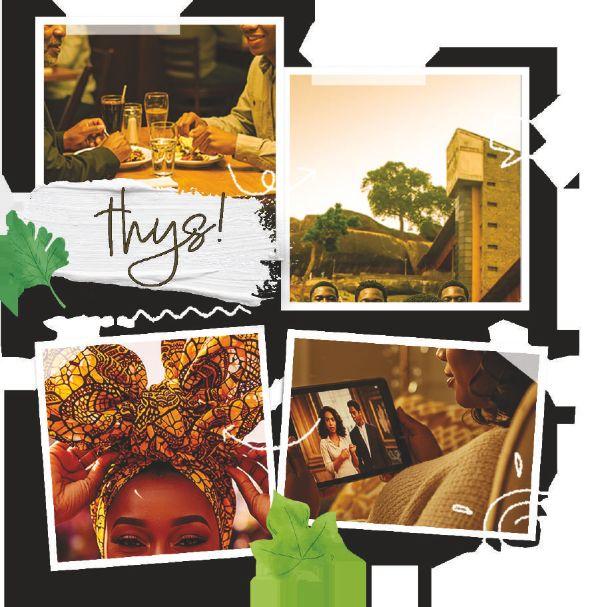
Amid Excess Liquidity in Financial Sector, Banks’ Borrowing from CBN Slumps 28.2% to N2.9tn in August 2025
Kayode Tokede
Amid excess liquidity in the financial sector, banks' borrowing from the Central Bank of Nigeria (CBN) dropped by 28.2 per cent Year-on-Year (YoY) to N2.9 trillion in August 2025 from the N4.04 trillion recorded in August 2024.
The sustained increase in the Federation Accounts Allocation Committee (FAAC) disbursements to the federal,
Blessing Ibunge in Port Harcourt
The Minister of Federal Capital Territory (FCT), Mr. Nyesom Wike, yesterday declared that with the successful conduct of the local government elections in Rivers State, the coast was clear for the return of Governor Siminalayi Fubara and the members of the state House of Assembly to power at the expiration of the state emergency in the state on September 18.
This is as Wike hailed the residents and the Rivers State Independent Electoral Commission (RISEC) for what he described as peaceful elections, despite the low turnout at yesterday’s council polls in the state.
Similarly, the Administrator of Rivers State, Vice Admiral Ibok-Ete Ibas (rtd), also expressed satisfaction with the orderly conduct of the elections, describing it as a decisive and positive step toward restoring full democratic governance at the grassroots level.
states, and local governments, and broad money supply (M2), were some of the factors that contributed to excess liquidity in the financial sector.
Banks access credit from the apex bank using the Standing Lending Facility (SLF) window and deposit excess cash using the Standing Deposit Facility window (SDF).
The CBN lends money to banks and merchant banks through the SLF at an interest
However, Fubara and some of his loyalists boycotted the elections.
the event, condemned the attack on the political gathering, calling it “a dangerous descent into lawlessness.”
The violence, according to a statement issued yesterday by the command’s Police Public Relations Officer, DSP Mansir Hassan, occurred after a political gathering said to have been convened under the platform of the African Democratic Congress (ADC) without prior notification to security agencies.
The statement noted that despite repeated warnings, the organisers went ahead with the meeting, a development that allegedly created a fertile ground for thugs to unleash violence.
Hassan explained that preliminary findings showed that “political gangsters and thugs attached to the former governor” were involved in the shooting that disrupted public peace and order in the state.
“Preliminary findings indicate that the gathering led to a clash,
growth over the past three years, with daily average production hitting 7.59bscf/d in July 2025.
"The 7.59bscf/d daily average also represents a 9.84 per cent increase from the 6.91bscf/d posted in the full year of 2023, which shows a sustained rise in gas production.
"Despite an increase in production, the commission also reported a continued reduction in gas flaring, which fell to 7.16 per cent in July 2025, down from 7.55 per cent in 2024 and 7.38 per cent in the corresponding
rate of 500 basis points (bpts) above the Monetary Policy Rate (MPR).
Similarly, the apex bank accepts deposits from the banks through its SDF, and pays an interest rate of MPR minus 100 basis points.
According to the apex bank’s financial data, between January-August 2025, the banks accessed an estimated N68.43 trillion, representing a decline of 13.6 per cent from the N79.22
But the suspended Speaker of the state House of Assembly, Hon. Martin Amaewhule, also described the election process as smooth and commended the electoral umpire for conducting a transparent election.
The Chairman of RSIEC, Dr. Michael Odey, stated that while results would be counted at the polling units, winners would only be announced at the RSIEC office after final collation.
Wike, who spoke to journalists shortly after casting his vote at his polling unit 007, Ward 9, Rumueprikom in Obio/Akpor Local Government Area (LGA) in the state, expressed the optimism that by September 18, the emergency rule would be lifted and all the elected political office holders who were suspended would return to their positions.
Speaking on the turnout of voters to the polls, Wike said: "I have to say this, I watched your outfit, particularly when they said there is apathy. That is not correct. We should have the experience of Nigerian voters in elections. So, when you go to the polling point by 9, you
during which thugs and political gangsters attached to the former governor allegedly fired gunshots, causing chaos and disruption of public order and peace in the state,” he said.
Hassan noted that the command would not spare anyone found culpable, no matter how highly placed, warning that nobody was above the law.
The police further disclosed that it had approached the ADC leadership to clarify the issue, but the party officials denied knowledge of such a meeting and distanced themselves from any gathering allegedly linked to El-Rufai.
“The command wishes to state categorically that the investigation is ongoing, and anyone found culpable, irrespective of his personality and no matter how highly placed, if he acted contrary to the law, will face the full weight of the law.
“The police command further launched an inquiry from the ADC
period of 2023.
"The reduction in gas flare was recorded despite the steady increase in gas production, which reflects the Commission’s commitment to end routine gas flaring by 2030", the agency said.
The commission had embarked on gas reduction programmes like the Nigerian Gas Flare Commercialisation Programme (NGFCP).
Other initiatives include developing a Decarbonisation and Sustainability Blueprint, promoting Carbon Capture and
trillion they accessed between January-August 2024.
Data from the money and credit statistics of the CBN showed that the country’s M2 surged by 15.8 per cent yearon-year to N117.5trillion as of June 2025, as against N101.45 trillion in June 2024.
M2 includes cash, demand deposits, savings deposits, money market deposits, and time deposits, and these provide a comprehensive measure of
expect people to be out by that time; that's not the usual case.
“I only expect that you go to the rural areas like the Etche, Ikwerre, Emuoha, Abodua, like Ahoada East, Ahoada West LGAs, and see what is going on. We have about 7,000 polling units, and you just go and take two polling units in the commercial city that you know, that there are no residents there, and then you judge that there is apathy, but you see what has happened there now,” Wike said.
Wike commended security agencies and RSIEC for a nonviolent election in the state.
“Look at the security agencies; you haven't heard of any violence; you've not heard of carrying of the ballot boxes; you see election materials are where people are casting their votes; commend them!” Wike said.
Speaking further on the emergency in the state, the FCT minister stressed: "I do know that on the 18th of September, the state of emergency would expire, and then, that would mean that the state governor and state assembly will come back to their job, and then, we
party secretariat to keep the records straight. “According to the party officials, they denied knowing of any meetings and refuted the claim of the organisers. The ADC leadership reaffirmed their commitment to the rule of law and distanced themselves from the claims of the former governor,” the spokesman said.
He also warned that hotels, event centres, and similar facilities would henceforth be held liable if they host political gatherings without first notifying security agencies.
“Any hotel, event centre, or similar facility that permits political meetings or gatherings without prior notification to the Police or other relevant security agencies will equally be held liable.
“This measure is to ensure due process is followed and to prevent thugs or miscreants from hijacking such gatherings to cause mayhem or breakdown of law and order,” he added.
Storage (CCS), and integrating sustainability into project planning through the Upstream Petroleum Decarbonisation Template (UPDT).
In terms of Domestic Gas Delivery Obligation (DGDO) performance, NUPRC revealed that the sector delivered 72.5 per cent in July 2025, up from 71.8 per cent in June.
The commission further stated that the DGDO performance stood at 72.2 per cent in January, rose to 73.5 per cent in February, and dipped slightly to 70.8 per
liquidity in the economy.
While the rising liquidity supports economic activities, it also stresses the need for balanced fiscal and monetary policies to sustain economic growth without exacerbating inflation.
In terms of deposits, in August 2025, the banks deposited N15.62 trillion, representing an increase of 92.3 per cent from N8.12 trillion reported in August 2024. Meanwhile, between January
will have a representative at the grassroots level.
“Remember the Supreme Court, and if the LG election was not conducted, it would mean that there is no representative at the grassroots level, which would not be acceptable to the people of Rivers State. So, having done this, the coast is clear for the state of emergency to be lifted. It means that the LG has representatives, and the state government has its own representatives. So, we are good to go," Wike added.
Fubara, Loyalists Shun Elections
Meanwhile, Fubara and some of his loyalists boycotted yesterday’s elections.
Some of the loyalists of the suspended governor, who were absent at their polling units include: Chief of Staff to the Governor, Edison Ehie; the Secretary to the State Government, Dr. Tammy Danagogo; and the sacked 23 LGA chairmen.
Also, the members of the Simplified Movement, a sociopolitical organisation, loyal to Fubara, were not at the voting
The state police command’s spokesman stated that the police have suspended all unauthorised political gatherings across the state until due process and proper security arrangements are ensured, noting that the move was in the overall interest of peace and public safety.
“In the interest of peace and public safety, the command further announces that all such unauthorised gatherings are to be suspended until due process and proper security arrangements are ensured,” Hassan added.
Violence erupted at the official inauguration of a transition committee jointly set up by opposition parties in the state when suspected political thugs stormed the event, attacking participants and vandalising property.
The event was said to have descended into violence when hoodlums armed with cutlasses, clubs, and stones disrupted the proceedings.
cent in March, before rising again to 73.7 per cent and 73 per cent in April and May, respectively.
On gas production by contract type, the agency reported that 63 per cent of output during the review period came from Marginal Sole Risk (formerly Marginal Fields), while Production Sharing Contracts (PSCs) accounted for 24 per cent.
It added that Joint Venture (JV) contracts contributed 10 per cent, and Sole Risk (SR) operators delivered the remaining three per cent.
and August, bank deposits with CBN stood at N95.5 trillion, a significant increase of 417 per cent from the N18.5 trillion recorded between JanuaryAugust 2024.
The Monetary Policy Committee (MPC) of CBN, since November 2024, hiked MPR to 27.50 per cent from 27.25 per cent in a bid the tackle inflation and stabilise Naira at the foreign exchange market.
centres.
Voting started at Fubara’s unit in ward 5, Opobo, in Opobo/ Nkoro LGA, around 11 am, and ended around 3:30 pm, without the suspended governor participating in the exercise.
There were strong indications that Fubara may have travelled outside the country before the polls took place.
Ibas: Rivers on Path of Full Democracy
Also, the state’s Administrator, Vice Admiral Ibok-Ete Ibas (rtd), expressed satisfaction with the orderly conduct of the elections, describing it as a decisive and positive step toward restoring full democratic governance at the grassroots level.
Ibas, who monitored the elections across several local government areas, commended the conduct of voters and election officials for creating a calm and secure atmosphere for the exercise.
The administrator visited the Emohua Council Secretariat, the Okporowo/Ogbakiri community, Igbu Ogbo village in Ahoada East, and Ogbunuabali town in
Several attendees were injured, and vehicles were destroyed.
Despite the attacks, the inauguration continued, though under tense and volatile conditions.
El-Rufai Condemns Thuggery, Lawlessness
Meanwhile, El-Rufai, who attended the event, condemned the attack, describing it as “a dangerous descent into lawlessness.”
He warned that political thuggery in the state must be stopped, alleging that senior police officers at the scene, including an Assistant Commissioner of Police, “stood by and watched” as the violence unfolded.
“If the authorities don’t end the introduction of thuggery into Kaduna politics, God help us. Nobody has a monopoly on violence or thugs.
“We will take decisive steps to ensure this does not repeat itself,”
The commission's gas utilisation data showed that, year-to-date as of July 2025, 35.88 per cent of production was channelled to export sales, 27.82 per cent supplied to the domestic market, while 29.13 per cent was utilised for field and plant operations (own use).
It said companies deployed gas mainly for in-house purposes such as fuel, gas lifting, and reinjection for pressure maintenance.
In addition, NUPRC disclosed that Gas-to-Power supply hit its strongest level in three months,
Port Harcourt City LGA, where he observed proceedings and interacted with citizens.
Speaking with journalists in Port Harcourt, Ibas described the peaceful environment at the polling units as clear indicators that the people of Rivers State were eager to reclaim and participate in grassroots governance.
He further confirmed that situation reports from across the state’s 23 LGAs corroborated his first-hand observations, pointing to a smooth, credible, and largely incident-free exercise.
“Generally, the situation has been calm and seamless across the state. We have not received any major negative reports, which is a testament to the collective desire for peace and normalcy,” he said.
The administrator stressed that the people of Rivers have shown their desire to elect a legitimate leadership that they can identify with at the local level.
He insisted that the successful polls were in direct alignment with the primary objective of his mandate to stabilise the state and return it to democracy.
El-Rufai said.
He also vowed to escalate the matter to the Police Service Commission (PSC), claiming that the police had violated regulations by failing to intervene.
Reacting, ADC National Vice Chairman (North-West) Jafaru Sani described the attack as “sad and unfortunate,” noting Kaduna’s long history of political violence.
“We will never be intimidated or forced to retreat. We will continue to pursue our political activities with all the energy and commitment we have,” he added.
However, the Kaduna State APC Secretary, Alhaji Yahaya Baba-Pate, denied any involvement by the ruling party, insisting that the APC does not sponsor or support political thuggery.
“The ADC and other opposition groups are free to carry out their activities without harassment,” he said.
with average daily deliveries rising by 3.48 per cent monthon-month, from 833.86 million standard cubic feet per day (MMSCF/D) in June to 862.86 MMSCF/D in July 2025, the highest in three months. Over the first seven months of the year, NUPRC maintained that Gas-to-Power supply stood at 780.23 MMSCF/D in January, increased to 849.37 MMSCF/D in February, and rose further to 886.83 MMSCF/D and 886.7 MMSCF/D in March and April, respectively.
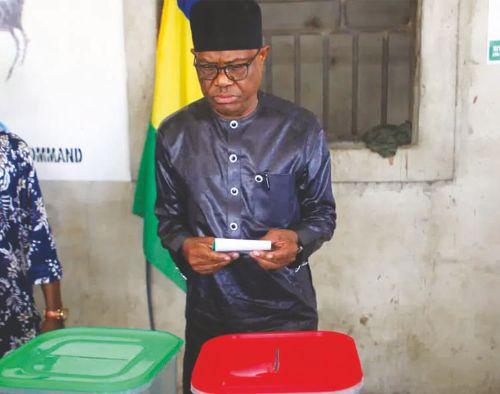
WIKE, PERFORMING HIS CIVIC DUTY...
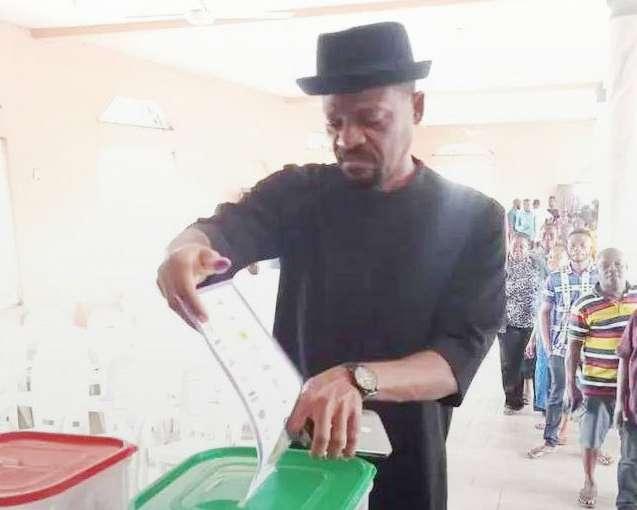
AMAEWHULE PERFORMING THEIR CIVIC DUTY...
Military Rejigs Security Architecture in North-central, Rebrands Operation Safe Haven to Sustain Peace
The Nigerian Army yesterday announced that it has rebranded the Joint Task Force (JTF), NorthCentral, Operation Safe Haven, to Operation Enduring Peace to guarantee peace in Plateau State and its environs.
A statement from the Media Information Officer of JTF Operation Enduring Peace, Major Samson Zhakom, stated that the Chief of Defence Staff (CDS), General Christopher Musa, had announced the rebranding of the North-Central Operation Safe Haven to Joint Task Force Operation Enduring Peace (JTF OPEP).
He stated that the CDS made this announcement in Jos during the official flag-off of the new operation.
In his remarks at the flag-off
ceremony, the Chief of Defence Staff said that Operation Safe Haven had played a vital role in addressing the complex security challenges in its Joint Operations Area and had also served as a stabilising force, providing the much-needed assurance of security to communities affected by decades of recurrent violence.
However, Musa disclosed that the rebranding would reflect a broader mandate, a renewed sense of purpose, and a stronger resolve to secure not just temporary safety but a lasting peace that would endure for generations.
The CDS further noted that security challenges require not just immediate interventions but sustainable solutions that integrate military, political, judicial, and community efforts.
He affirmed that Joint Task Force Operation Enduring Peace North-east Govs Raise the Alarm over Looming Flood, Food Crisis, Say Emerging Challenges Compounded Insecurity, Poverty
Wole Ayodele in Jalingo
Governors from the North-east geopolitical zone yesterday raised the alarm over looming humanitarian and economic crises in the region, citing climate change, rising agricultural costs, and fragile infrastructure as threats to millions of livelihoods.
The forum is chaired by Borno State Governor, Prof. Babagana Zulum.
In a communiqué issued at the close of the 12th meeting of the North-east Governors’ Forum (NEGF) held in Jalingo, the Taraba State capital, the governors highlighted forecasts from credible climate agencies predicting imminent floods that could devastate the subregion.
While commending progress in the fight against insurgency, the governors expressed concern that insecurity, displacement, and poverty were being compounded by emerging challenges.
They highlighted forecasts from credible climate agencies predicting imminent floods that could devastate the subregion.
“The forum calls for proactive measures in confronting the flood and robust sensitisation of settlers along the flood plains,” the communiqué stated.
The governors urged the federal government and the North-east Development Commission (NEDC) to take urgent action to reconstruct bridges and other critical infrastructure already weakened by past flooding.
On food security, the forum decried the rising cost of agricultural inputs, warning that poor harvests and hunger could hit in 2026 if no intervention is made.
“To avert impending food crises ahead, the forum calls for more subsidies to farmers and robust preparation for dry season farming,” it added.
would place stronger emphasis on inter-agency collaboration, intelligence-driven operations, and community engagement, which encapsulate a whole-ofsociety approach.
The CDS urged troops to embrace the new identity of JTF OPEP with pride, discipline, and renewed vigour, while carrying out their duties in the pursuit of national security.
Earlier, in his welcome address, the General Officer Commanding
3 Division, Nigerian Army, and Commander, Joint Task Force Operation Enduring Peace, Major General Folusho Oyinlola, said the rebranding would usher in a renewed era of commitment, strategy, and purpose in the collective quest for peace and stability in the Joint Operations Area.
He stated that the rebranding exercise was a strategic realignment designed to make operations more proactive, intelligence-driven, and
result-oriented.
The commander called on all stakeholders, including community leaders, religious bodies, civil society organisations, youth groups, and indeed every law-abiding citizen, to partner with Joint Task Force Operation Enduring Peace more closely than ever before, as it continues to tackle emerging security challenges.
He applauded the Chief of Defence Staff for his unwavering
support for the mission and promised to restore permanent peace to the JTF OPEP Joint Operations Area in the shortest possible time.
On his part, the Chief of Defence Operations (CDOPS), Major General Emeka Onumajuru, stated that the new operation would address the noticeable gap in the previous conduct of operations for sustainable peace and development in the general area.
With 13% Derivation Revenue Rising 100%, Oilproducing States Receive N620bn in Five Months
James Emejo in Abuja
Nine oil-producing states received a total of N620.23 billion from the Federation Account as 13 per cent derivation between January and May 2025.
The figure represents a 101.3 per cent increase compared with the N308.19 billion shared in the same period of 2024, according to data from the National Bureau of Statistics (NBS) and the Federation Account Allocation Committee (FAAC).
Analysis by TheCableIndex shows that in 2025, Delta State received the highest allocation, with N185.16 billion, followed
by Bayelsa with N130.21 billion and Akwa Ibom with N124.79 billion.
Rivers State received N114.06 billion, while Edo got N18.60 billion.
Other beneficiaries include Ondo (N15.51 billion), Imo (N14.48 billion), Abia (N8.99 billion), and Anambra (N8.42 billion).
The derivation fund, which is provided under Section 162(2) of the 1999 Constitution, mandates that 13 percent of revenue from natural resources be returned to states from where such resources are produced.
It is intended to cushion
the impact of exploration and support development in oilproducing communities.
The NBS and FAAC figures show that the four top beneficiaries — Delta, Bayelsa, Akwa Ibom, and Rivers — accounted for more than 88 percent of the total disbursements during the period.
Abia, Imo, and Anambra saw a remarkable increase year-on-year.
Abia received N8.99 billion in the first five months of 2025, compared to N2.95 billion in the same period of 2024, representing a 205 percent increase.
Imo’s allocation rose by 183
percent from N5.12 billion in 2024 to N14.48 billion in 2025. Anambra got N8.42 billion in 2025, higher than the N3.72 billion it received in 2024 — reflecting a 126 percent rise. Bayelsa’s share went up by 122 per cent, from N58.62 billion to N130.21 billion. Also, Rivers recorded a 114 per cent increase, and Akwa Ibom’s allocation rose by 98 per cent. Delta, which remained the top beneficiary, recorded a growth of 82 percent, from N101.50 billion in 2024 to N185.16 billion in 2025. Edo and Ondo also recorded increases of 69 per cent and 72 per cent, respectively.
Colombian Vice President Begins Three-day Official Visit to Nigeria
To hold bilateral meeting, sign MoU on economy with his Nigerian counterpart
Deji Elumoye in Abuja
Vice President of the Republic of Colombia, Mrs. Francia Márquez, yesterday arrived in the nation's capital, Abuja, on a three-day official visit to Nigeria.
Accompanied by her spouse, Mr. Rafael Yerney Pinillo Ocoró, the Colombian Vice President was received on arrival at the Nnamdi Azikiwe International Airport, Abuja, by the Minister
of Innovation, Science and Technology, Chief Uche Nnaji; his Women Affairs counterpart, Hon. Imaan Sulaiman-Ibrahim; Minister of State, FCT, Dr. Mariya Mahmud Bunkure, Director General of National Emergency Management Agency (NEMA), Mrs. Zubaida Umar, and other senior government officials.
Márquez's official visit to Nigeria, according to a release issued by Media Assistant to
Nigeria’s Vice President, Stanley Nkwocha, is expected to deepen diplomatic and strategic relations between Nigeria and Colombia as well as enhance collaboration in areas of mutual interest, including governance, trade, agriculture, energy, education, and security, among others.
The Colombian vice president is accompanied on the visit by cabinet ministers, top government officials, and
business sector leaders who are set to engage their Nigerian counterparts in discussions around key areas aimed at strengthening ties between both countries.
A key highlight of the visit is the signing of Memoranda of Understanding in strategic areas of the economy, including women empowerment, trade, aviation, manufacturing, agriculture, and culture, among others.


The Flow of Power in a Democracy: From Constitution to Citizens
"In every true democracy, it is the people who hold ultimate power This chain of authority guarantees that all governance originates from and is accountable to the people ." THE NIGERIAN CONSTITUTION
- Anonymous
HOW POLITICAL POWER FLOWS
THE CONSTITUTION
Supreme legal authority that recognizes people's sovereignty. Nigeria's 1999 Constitution: "sovereignty belongs to the people."
CITIZENS (THE PEOPLE)
Ultimate source of democratic power - transfer authority through elections. Can reclaim power through activism, petitions, and recall processes.
ELECTED OFFICIALS
President, Governors, Lawmakers, Chairpersons - receive power directly from people. Separation of powers ensures checks and balances: Executive, Legislature, Judiciary.
APPOINTED OFFICIALS
Ministers, Commissioners, Special Advisers, Ambassadors,etc - receive delegated authority. Must operate within limits of given authority.
HOW CITIZENS EXERCISE THEIR POWER




Vote
Participate in all elections (local, state, federal)
Recall
Remove non-performing representatives
Peaceful Protest
Influence policy and public opinion

Engage Lawmakers
Attend town halls, public hearings, etc.





Run for Office
Seek elective positions
Petitions & FOI
Demand transparency and accountability
Community Organising
Mobilise groups for local issues
Public Interest Litigation (PIL)
Challenge unconstitutional actions

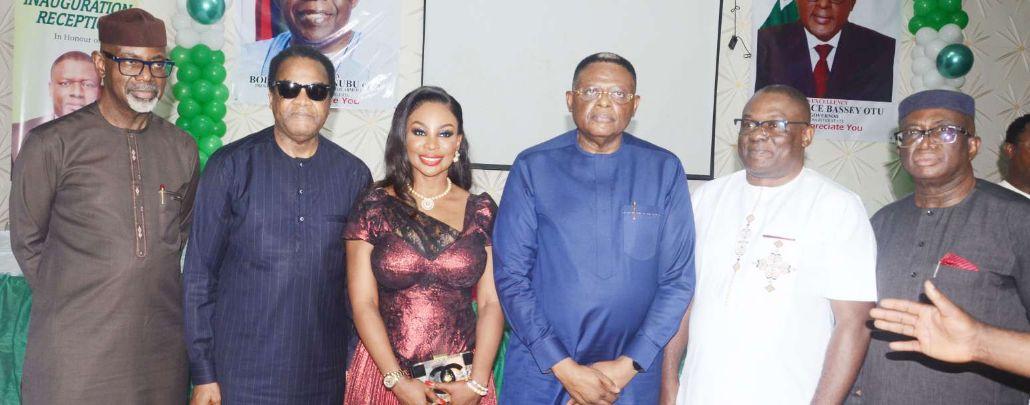
WE WILL SUPPORT YOU…
In a Split Judgment, US Appeals Court Declares Trump’s Global Tariffs Illegal,
A divided United States Appeals Court at the weekend ruled that most of Donald Trump’s tariffs are illegal.
Trump has, however, vowed to fight back “with the help of the United States Supreme Court.”
The appeals court allowed the tariffs to remain in place through October 14 to give the Trump administration a chance to file an appeal at the Supreme Court.
The decision comes as a legal fight over the independence of the Federal Reserve also seems bound for the Supreme Court, setting up an unprecedented legal showdown this year over Trump’s entire economic policy.
Trump has made tariffs a pillar of US foreign policy in his second term, using them
to exert political pressure and renegotiate trade deals with countries that export goods to the United States.
The tariffs have given the Trump administration leverage to extract economic concessions from trading partners but have also increased volatility in financial markets.
Trump lamented the decision by what he called a “highly partisan” court, posting on Truth Social: “If these Tariffs ever went away, it would be a total disaster for the country.”
The 7-4 ruling by the Court of Appeals for the Federal Circuit affirmed a lower court’s finding that Trump had exceeded his authority in tapping emergency economic powers to impose wide-ranging duties.
The appeals court “incorrectly
President
said that our Tariffs should be removed, but they know the United States of America will win in the end,” he said in a statement on his Truth Social platform, lashing out at the ruling.
He added that he would fight back “with the help of the United States Supreme Court.”
The decision marks a blow to the president, who has wielded duties as a wide-ranging economic policy tool.
It could also cast doubt over deals Trump had struck with major trading partners such as the European Union, and raised the question of what would happen to the billions of dollars collected by the United States since the tariffs were put in place if the conservativemajority Supreme Court does
not back him.
Vows to Fight Back
Friday’s case, however, does not deal with sectorspecific tariffs that the Trump administration has also imposed on steel, aluminum, autos, and other imports.
Since returning to the presidency in January, Trump has invoked the International Emergency Economic Powers Act (IEEPA) to impose “reciprocal” tariffs on almost all US trading partners, with a 10 per cent baseline level and higher rates for dozens of economies.
He has invoked similar authorities to slap separate tariffs hitting Mexico, Canada, and China over the flow of deadly drugs into the United States.
The Court of International Trade had ruled in May that
Trump overstepped his authority with across-the-board global levies, blocking most of the duties from taking effect, but the appeals court later put the ruling on hold to consider the case.
Friday’s ruling noted that “the statute bestows significant authority on the President to undertake some actions in response to a declared national emergency, but none of these actions explicitly include the power to impose tariffs, duties, or the like, or the power to tax.”
It added that it was not addressing whether Trump’s actions should have been taken as a matter of policy or deciding whether IEEPA authorizes any tariffs at all.
Instead, it sought to resolve the question of whether Trump’s “reciprocal” tariffs and those imposed over trafficking were authorised, with the document
noting: “We conclude they are not.”
In a supplementary filing just hours before the appeals court released its decision, Trump cabinet officials argued that ruling the global tariffs illegal and blocking them would hurt US foreign policy and national security.
“Such a ruling would threaten broader US strategic interests at home and abroad, likely lead to retaliation and the unwinding of agreed-upon deals by foreign-trading partners,” wrote Commerce Secretary Howard Lutnick. Lutnick added that they could also “derail critical ongoing negotiations” with partners.
Treasury Secretary Scott Bessent, meanwhile, warned that suspending the effectiveness of tariffs “would lead to dangerous diplomatic embarrassment.”
UK Initiates Policy to Cut Net Migration, Bans over 100 Occupations from Foreign Recruitment 15 Residents Fleeing from Bandits Feared Dead in Zamfara Boat Accident
The United Kingdom Government has announced sweeping new restrictions on overseas recruitment, barring more than 100 occupations from being filled by foreign workers as part of its drive to cut net migration.
The Home Office disclosed the policy shift in a statement on X yesterday morning, saying it was focused on opening up opportunities for British workers while reshaping the visa system.
“Cutting net migration
means getting the fundamentals right.
“More than 100 occupations are no longer eligible for overseas recruitment –opening up more jobs for British workers. A fairer, skills-focused system is now
taking shape,” the Home Office wrote.
This development marks the latest move by the Prime Minister, Sir Keir Starmer, who took office on July 5, 2024, following Labour’s landslide victory.
Prices of Shea Nuts Slump 33% after FG’s Six-month Ban on Exports to Create Jobs
Emmanuel Addeh in Abuja
The price of shea nuts in Nigeria has plunged after the government banned exports, with the product selling for N800,000 a tonne, down 33 per cent from a few days earlier, a report by Bloomberg has revealed.
President Bola Tinubu had said the six-month moratorium on shipments was needed to “secure supply for local processors, create jobs, and protect a value chain where 95
per cent of pickers are women.”
The ban, the report said, is expected to have serious financial implications for major exporters, with some seeing it as an opportunity and others being skeptical that it will have a positive effect in the short term.
Shea nuts, which are used in cosmetics and confectionery, fell to the new price of approximately ($521) a tonne at the close of trade on Thursday, Bloomberg said, quoting the Chief Executive Officer of Lagos-
based Vestance, Rildwan Bello. The consultancy firm tracks agricultural commodity prices.
While the move was wellintentioned, there would be serious financial implications for major exporters, who now face defaulting on contracts, Bello said.
“Exports made the market vibrant. Local demand is not as high as local supply,” he told Bloomberg by phone from Lagos. “The idea of growing the local industry doesn’t happen overnight. You don’t set up a
processing industry within two months. The manner of the implementation leaves a lot to be desired,” he added.
The slow-growing trees that produce shea nuts are indigenous to West Africa. Nigeria produces about 500,000 tons of the nuts annually, government data showed. Burkina Faso, Ghana, Mali, Ivory Coast and Togo - all of which restrict exports to promote local processing — are the other main producers, the report added.
At least 15 people have reportedly died, while three others remain missing, after a boat capsized in the Gummi Local Government Area of Zamfara State.
The incident happened on Friday, , when villagers fleeing bandit attacks attempted to cross a river at Nasarawar Kifi in Birnin Tudu ward.
Eyewitnesses said the victims, mostly women and children from Danmaga, Tungar Maigunya, and Nasarawar Kifi, had rushed to the river in search of safety.
The ill-fated boat, which could only carry 16 passengers, overturned during its third trip after two women forced themselves onboard despite the boat already being overloaded.
One eyewitness, Malam Bashiru, lamented that the community has continued to lose lives yearly to such accidents due to inadequate transport facilities.
He appealed for government and humanitarian support to provide more boats for villagers whose farms and businesses depend on water transportation.
The village head of Nasarawar Kifi, Alhaji Muhammadu Chigari, confirmed the tragedy, describing the atmosphere in the communities as one of grief.
He revealed that the victims included eight housewives, three babies, and four youths, while local divers are still searching for the missing.
The deceased have since been laid to rest in a mass funeral led by Liman Yahaya, in line with Islamic rites.
Meanwhile, the Head of the Sokoto Field Office of the National Emergency Management Agency (NEMA), Aliyu Shehu, confirmed the incident to Channels Television via telephone, though he could not verify the casualty figures.
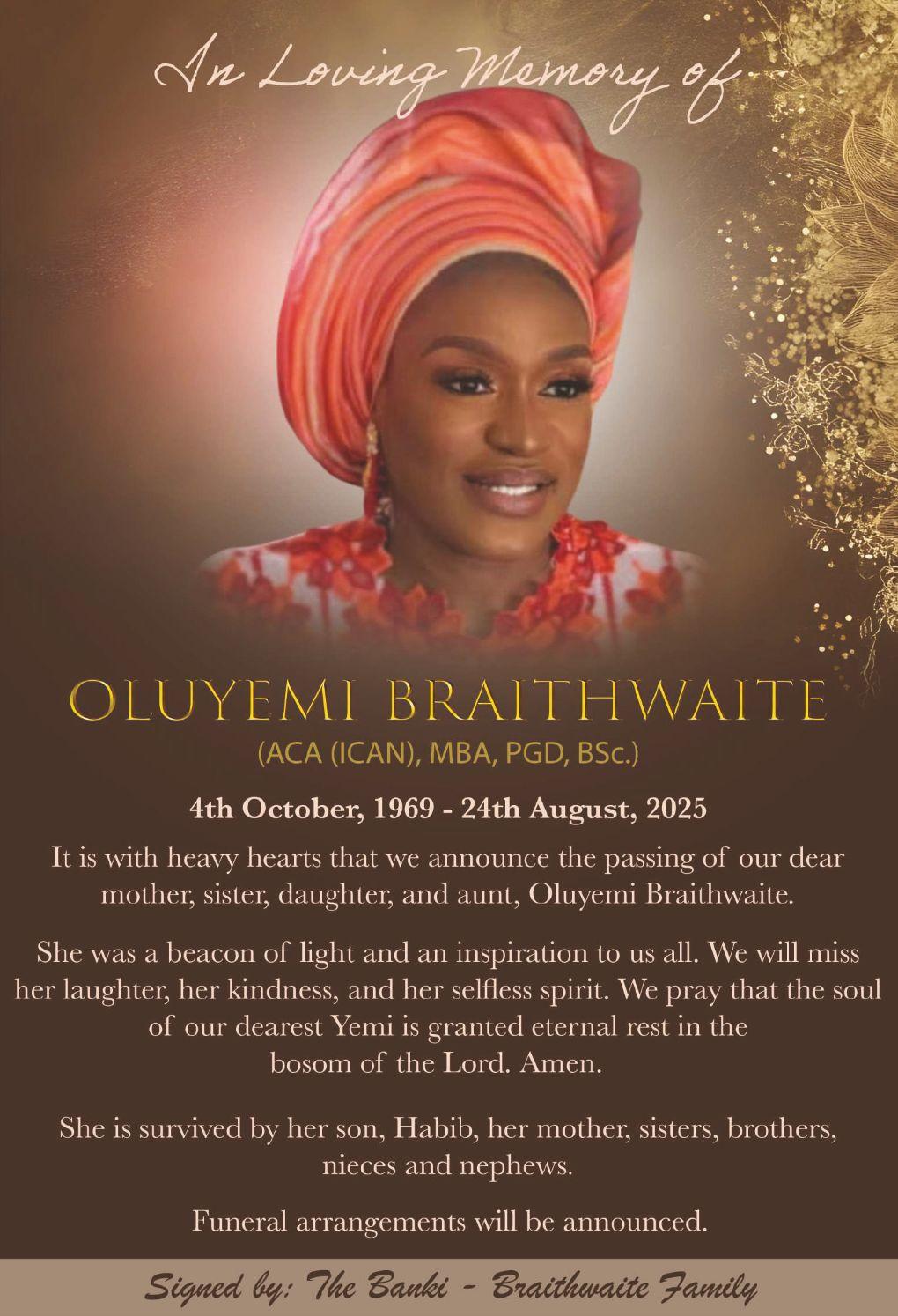
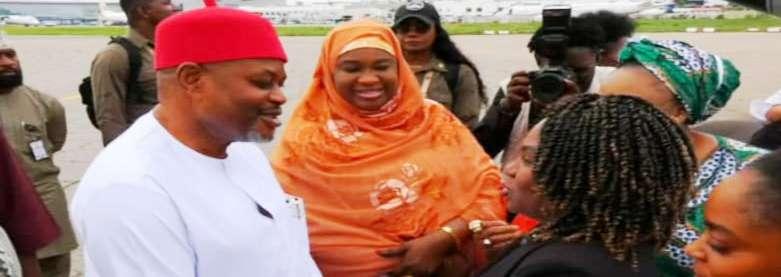
WELCOME TO NIGERIA…
Science and Technology,
In Major Breakthrough, Benue Police Nab Wanted Kidnap
George Okoh in Makurdi
Barely two weeks after the Chairman of Ogbadibo Local Government Area (LGA) of Benue State, Sunday Ajunwa, imposed a dusk-to-dawn curfew in Orokam part of the LGA following a protest by the residents over the rising kidnap cases in the area, the Benue State Command has arrested an alleged wanted kidnap kingpin identified as Yusuf Muhamed and 21 other suspected kidnappers in the town.
It was gathered that the wanted kidnapper was apprehended during a special operation after being trailed by operatives of the command
Kingpin, 21 Other Suspected Kidnappers
for several days. According to the sources, the suspect, a physically challenged man who goes by the nickname “OC Torture” among his gang members, was identified by some of his victims, which helped the police track him.
The manhunt for the gang of kidnappers terrorising that part of the state followed the sudden surge of their activities that led to the murder of a mother and her visiting son after a failed kidnap attempt by the gang, among several incidents.
The development compelled the Chairman of Ogbadibo LGA, Ajunwa, to impose a dusk-to-dawn curfew in Orokam about two weeks
FG Inaugurates Boards of Three Regional Development Commissions, Charges Them to Deliver Tangible Results
Folalumi Alaran in Abuja
The federal government yesterday inaugurated the governing boards and management teams of three newly established development commissions for the South-south, South-west, and North-central regions, with a charge to deliver tangible results that align with President Bola Tinubu’s Renewed Hope Agenda.
The ceremony, presided over by the Minister of Regional Development, Mr. Abubakar Momoh, at the Ministry of Foreign Affairs, Abuja, marked a significant step in what government officials described as the institutionalisation of regional development as a tool for national stability and economic growth.
Momoh said the inauguration was not merely symbolic but carried weighty expectations for millions of Nigerians in the three regions.
He warned the boards against embarking on “unrealistic projects motivated by personal and selfish gains,” insisting that their work must reflect people-oriented programmes.
“Your role isn’t just about
distributing funds or managing projects; it’s about rebuilding trust in governance by delivering results that truly improve lives.
“This will only be attainable if you demonstrate the highest ethical standards, fairness, and transparency,” the minister added.
He revealed that the ministry had signed a Performance Bond with the president on assigned deliverables tied to the government’s 80 priority areas, and that the new boards would also be required to sign similar bonds to guarantee accountability.
The Minister of State for Regional Development, Uba Maigari Ahmadu, described the commissions as a deliberate attempt to bridge regional inequalities and harness local advantages.
“The establishment of these commissions is not just an administrative exercise. It is a strategic move to address developmental gaps, leverage regional strengths, and create opportunities for growth across our six geopolitical zones,” he said.
ago following the protest by residents over the troubling development.
“The Commissioner of Police deployed a Tactical Team, the Mobile Police Squad, alongside personnel of Civil Protection Guards who combed Orokam and its environs. Their operation yielded the positive result we are celebrating today.
“It goes to show that with the cooperation of locals, the police and other security agencies can achieve set targets which would help check incidents of crime in the society,” a resident of Orokam said.
Confirming the development, the Chairman of Ogbadibo LGA, Ajunwa, said, “It is true that Yusuf has
been arrested by the combined team of police from Makurdi and Enugu, as well as the vigilante in the area.
“He attempted to run, but the youths pursued and caught him. Those he kidnapped made confessional statements about how he tortured them in captivity. He is now in police custody along with 21 others.
“Yusuf is a Fulani man. The
security situation in Orokam is stable, though the curfew from 6 pm to 6 am is still in force. But I am thinking of lifting it after meeting with security agencies and stakeholders. However, the Police Public Relations Officer, Deputy Superintendent, DSP Udeme Edet, said she was yet to be briefed on the development.
Railway Boss, Opeifa Bows to Pressure, Apologises to NUJ over Alleged Harassment of NTA Reporter
Following the public outrage that greeted his alleged harassment, intimidation, and verbal abuse meted out to the Transport Correspondent with the Nigerian Television Authority (NTA), Abuja, Ladi Bala, by the Managing Director of the Nigerian Railway Corporation (NRC), Mr. Kayode Opeifa, and his altercation with the Nigeria Union of Journalists (NUJ), the NRC boss has apologised to the union.
Opeifa, in an exclusive telephone interview with the News Agency of Nigeria (NAN) in Abuja, said he had “done the needful” in response to NUJ’s
To Decongest
demand for an apology.
The FCT Council of the NUJ, in a statement signed by its Secretary, Jide Oyekunle, had condemned the alleged harassment and intimidation of Bala, who is also the immediate past President of the Nigerian Association of Women Journalists.
She was reportedly assaulted on Wednesday while covering the aftermath of the Abuja-Kaduna train derailment.
Opeifa, however, told NAN he had apologised for the incident, saying he remained a friend of the media.
According to him, he has always identified as a unionist, having participated in union and
human rights activities both in academia and other spheres of activism.
“My position is not to address the issue because it involves the NUJ, an organisation I was once part of, fought with, fought for, and cherished.
“The FCT Council of the NUJ even gave me an award in the past.
“I am a friend of NUJ and other unions, and I have journalist friends across the country, including a former Minister of Information and Culture, among many others.
“The NUJ demanded an apology from me, and as a friend of the house, I apologise
for what happened and take full responsibility,” he said.
Opeifa added that he would not “dissipate further energy” discussing the matter, stressing that his focus remained on his national assignment in line with President Bola Tinubu’s Renewed Hope Agenda.
“Yesterday at the Villa, I did what others thought I would not do — I publicly apologised to the NUJ.
“I have also been in touch with several media leaders who reached out to me.
“They asked for an apology, and I have given it. I am leaving the rest to God, mankind, and humanity.
Lagos Ports, NPA Moves to Revive Delta Ports; Board Meets Oborevwori, Other Stakeholders
Sylvester Idowu in Warri
The Nigerian Ports Authority (NPA) has announced plans to fully revive Delta Ports as part of a broader strategy to boost Nigeria’s economy and decongest Lagos ports.
Speaking during a four-day working tour of the Delta Ports, the Chairman of the NPA Board, Senator Adedayo Adeyeye, stated that President Bola Tinubu was committed to revitalising Nigeria’s port infrastructure to generate employment and support economic growth.
During the visit, Adeyeye and members of his delegation held meetings with the Delta State Governor, Sheriff Oborevwori; the Orodje of Okpe, HRM Orhue I; the Olu of Warri, Ogiame Atuwatse III, port stakeholders, and other community leaders.
“This Board will ensure that the Ports in Delta are fully operational for the economic prosperity of the nation as well as job creation,” Adeyeye said.
“We were told the port was dead, but it’s interesting to see revenue being raised. However,
the people are not getting the best out of this infrastructure,” Adeyeye said.
To address the recurring issue of shallow draught and siltation, the NPA chairman announced the establishment of a Delta Channeling Management Company, similar to those operating in Lagos and recently proposed for Calabar Port. This company will be responsible for dredging and keeping waterways navigable year-round.
On youth unemployment and local inclusion in port operations, Adeyeye promised reforms.
“We will look into employment opportunities and ensure that qualified youths from this area benefit. Policies will be made to tackle the core issues raised by the stakeholders,” he said. Adeyeye further reaffirmed the NPA Board’s commitment to delivering on its mandate: “It does not make sense for importers servicing the North Central and East to keep using Lagos when Delta Ports are here. We will confront these challenges head-on. The President has given us a clear mandate: solve the problem.”

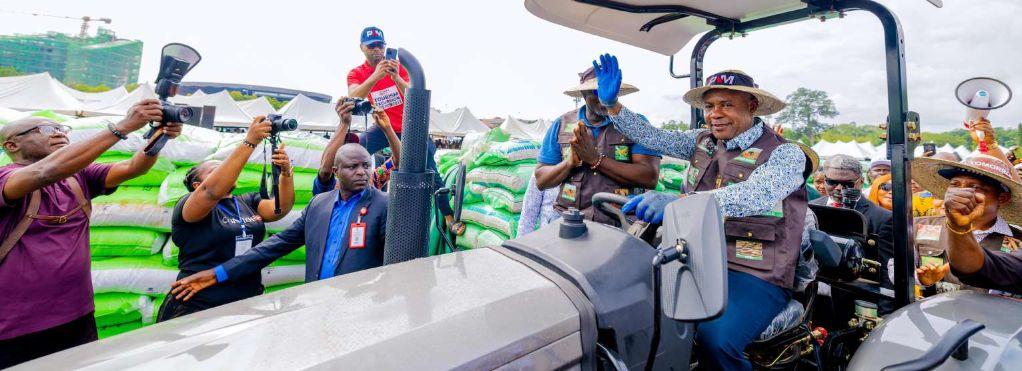
A BOOST TO FOOD SECURITY…
Governor of Enugu State, Mr. Peter Mbah, acknowledging cheers from farmers during the flag-off of the distribution of fertilisers and farm inputs to farmers at Okpara Square, Enugu…yesterday.
Report: Nigerian Entertainment Industry to Grow to $13.6bn
A new report by the Rome Business School Nigeria has revealed that the Nigerian entertainment industry will grow to $13. 6 billion by 2028.
The report described the Nigerian entertainment industry as a “global model for export.”
Titled: ‘The Entertainment Business in Nigeria: A Model for Export,’ paints a vivid picture of how Nigeria’s musicians, filmmakers, digital creators, fashion designers, and comedians have quietly redefined global culture — one beat, one scene, and one trend at a time.
According to the report, the sector — valued at $9 billion in 2023 — is projected to grow to $13.6 billion by 2028, with a growth rate of 8.6 per cent annually.
However, over 4.2 million
by 2028,
Nigerians already work in the creative economy, and another 2.6 million jobs are expected by 2025.
Commenting on the report, Founder and Dean of Rome Business School, Prof. Anthony Ragusa, said: “What’s happening in Nigeria is extraordinary. The entertainment industry has achieved global influence without waiting for permission — with passion, innovation, and grit. It’s an economy of imagination.
“For decades, we waited for others to define us, now, our culture is doing the talking. This is a form of national power — soft power — and it’s growing faster than oil exports ever did. Let the world take note, Nigeria’s entertainment industry is not just vibrant — it’s visionary. It’s time
Data Consumption in Nigeria Hits All-time High in July Despite Decline in Subscriptions, Says NCC
A report by the Nigerian Communications Commission (NCC) has revealed that data consumption in the country hit an all-time high of 1.1 million terabytes in July 2025.
In the latest industry statistics released by the commission, the first milestone was hit in May, when 1.04 million terabytes were used.
The increase in consumption comes as more Nigerians move to higher generations of networks, 4G and 5G, leading to higher speeds.
NCC’s data, according to nairametrics.com, shows that the percentage of Nigerian internet users on 4G increased to 50.85 per cent in July, while 5G is also steadily coming up at 3.17 per cent. Conversely, 3G usage is declining in the country as only 7.38 per cent of connections were on 3G as of July.
Despite the increase in data consumption, telecom operators continue to see a decline in the number of active internet subscriptions as Nigerians adjust to the recent 50 per cent price increment implemented by all
telecom operators in the country.
Total internet subscriptions across mobile, fixed wired, ISP, and VoIP networks declined to 138.7 million from 141.1 million recorded in June.
While the mobile network operators (MNOs) continue to dominate the internet service market, they accounted for the majority of the internet subscription loss in the month.
According to the NCC statistics, internet subscriptions on MTN, Airtel, Globacom, and T2 (9mobile) declined from 140.6 million in June to 138.2 million in July.
Meanwhile, active mobile subscriptions in the country plunged to 169.1 million in July from 171.5 million recorded in June this year.
The decline was driven by the losses recorded by the three mobile network operators, but most significantly by Airtel, which lost 2.4 million subscriptions in the month.
The telco’s active subscriptions plunged to 56.5 million in July from 58.9 million it recorded in June.
Industry a Global Model for Export
we treated it that way.”
Also speaking, General Manager, Rome Business School Nigeria, Mr. Olakunle Asunmo, said that the report credits much of the industry’s success to Nigeria’s digital transformation; Streaming platforms, social media, and online collaborations have replaced traditional gatekeepers, giving young talents direct access to global audiences, even as he maintained that the journey has not been easy.
He pointed out that Nollywood, producing over 2,500 films annually, now contributes N154 billion to Nigeria’s GDP, saying that Afrobeats, once a niche genre, has become a global
cultural currency — heard in clubs in Berlin, blaring from speakers in Brooklyn, and remixed by global pop icons.
Asunmo stated: “We’re not just exporting songs or movies — we’re exporting pride, identity, and the heartbeat of a generation. What you hear in Afrobeats, what you see in Nollywood, is Nigeria refusing to be ignored.
“Nigeria can export more than oil. We can export stories, culture, joy — we already are. Indeed, the world is watching — and listening. Words like “wahala” and “na who send you?” have found their way into global slang. Jollof rice is on menus
in London. Lagos-inspired dance moves are trending on TikTok. It’s cultural diplomacy by rhythm, fashion, and flair.
“This success came despite government neglect, not because of support. Piracy, infrastructure gaps, and limited financing still threaten the future of this industry. We need policies that treat creativity as serious business.”
On his part, Head of Academics at Rome Business School Nigeria, Sam Igwe, said that Nigerian music is no longer local but international, inspiring, and reshaping how the world sees Africa.
Igwe stated: “Just imagine
what could be achieved if creators had access to reliable power, tax incentives, or even working broadband. The potential is limitless — if we just clear the path.
“The ripple effect of the industry is vast. From tourism and fashion to food and hospitality, Nigerian entertainment has fueled an ecosystem of entrepreneurs. Hotels fill up during movie premieres. Tailors ride the wave of fashion trends sparked by music videos. Makeup artists, sound engineers, cinematographers, podcasters, and stylists are earning livelihoods — and dreaming bigger.”
Emeka Ngige Urges Supreme Court to Accelerate Hearing on Rivers Emergency Declaration Case
Commends FG on fight against terrorism
Wale Igbintade
The Chairman of the Council of Legal Education, Chief Emeka Ngige (SAN), has called on the Supreme Court to fast-track the hearing of the suit filed by 11 state governments challenging President Bola Tinubu’s declaration of emergency rule in Rivers State.
Ngige has also commended the federal government and security agencies for what he described as a decisive onslaught against Boko Haram and other terrorist groups threatening Nigeria’s security.
Tinubu’s emergency proclamation on March 18, 2025, suspended Governor Siminalayi Fubara, his deputy, and the entire members of the state House of Assembly, replacing them with a sole administrator.
However, 11 state governments approached the Supreme Court in suit number SC/CV/329/2025, challenging the constitutionality of the president’s action.
The states argued that the president cannot suspend elected officials and replace them with his appointee under the guise of
emergency powers, insisting that such actions contravene Sections 1(2), 5(2), 176, 180, 188, and 305 of the 1999 Constitution.
The federal government, however, filed a preliminary objection, contending that the plaintiffs lacked the locus standi and that no genuine dispute exists.
Delivering a paper at the 2025 Annual General Conference of the Nigerian Bar Association (NBA) in Enugu, Ngige called on the Supreme Court to expedite action on the suit.
Ngige noted that the matter, having been fully joined by parties, is ripe for hearing.
“This case touches on the rule of law, democracy, and the rights of the Rivers people to be governed by an elected government. It is of utmost importance that the Supreme Court immediately schedules a hearing, even during vacation, so the matter can be resolved on the merits,” Ngige stressed. He urged the Supreme Court to fast-track proceedings, given that the six-month emergency rule expires on September 18, 2025.
“It is immaterial whether the state of emergency will be renewed or not. The case touches on the rule of law, democracy, and the rights of Rivers people to be governed by a democratically elected state government,” he argued.
Citing Article 13(1) of the African Charter on Human and Peoples’ Rights, Ngige maintained that citizens have the right to participate in government through freely chosen representatives, not imposed administrators.
He warned that delay could render the case academic, recalling the Supreme Court’s handling of Plateau State of Nigeria & Anor v. AttorneyGeneral of the Federation & Anor (2006), where substantive issues were left unresolved.
“The Supreme Court must immediately schedule a hearing, even during the vacation, to resolve this crisis. The stability of our democracy demands nothing less,” he declared.
Ngige also lauded the federal government’s onslaught on terrorists, saying that the coordinated offensive against
insurgents, under the supervision of the National Security Adviser (NSA), Malam Nuhu Ribadu, has yielded significant results, including the elimination of top terrorist commanders and the capture of leaders of affiliated groups.
“The federal government is currently attacking the menace of Boko Haram headlong. I must commend the security agencies for their efforts in tackling the insurgency in the North. I particularly commend the NSA, Malam Nuhu Ribadu, for the coordinated response that has resulted in the taking out of the ringleaders – Kachalla Boka, Dogo Isah, and Kachalla Shekau, who once controlled the Abuja-Kaduna expressway until they met their nemesis,” Ngige said.
He described as
“heartwarming” the arrest of leaders of the Ansaru terrorist group, Nigeria’s Al-Qaeda affiliate, and the dismantling of the Mahmudawa sect, noting that Amir Mahmud Mohammed Usman (aka Abu Baraa) and his deputy, Marmuda, are now in custody.
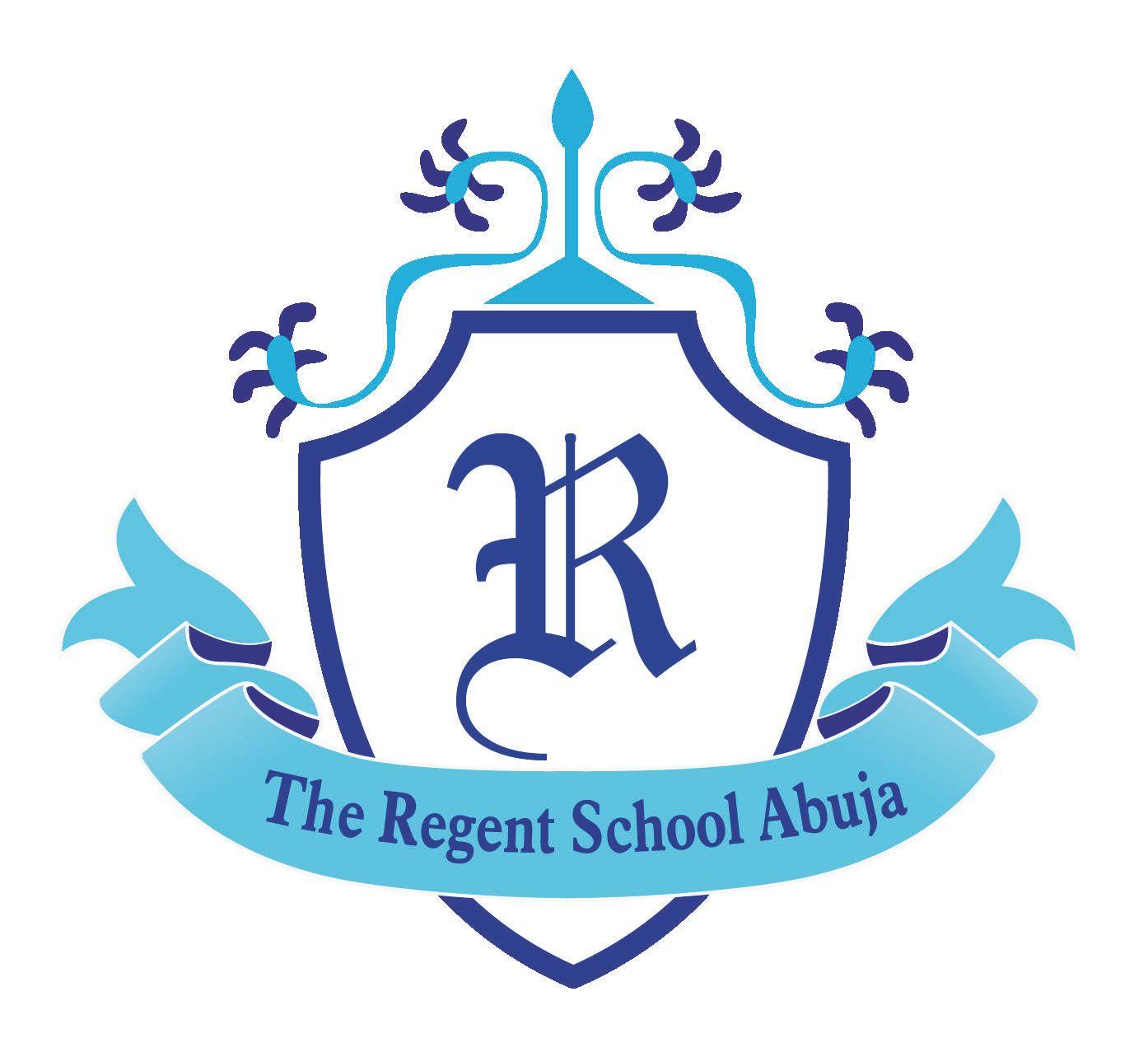
Y SCHOOL, ABUJA
SS OF 2025 ON AN OUTSTANDING IGCSE RESULT
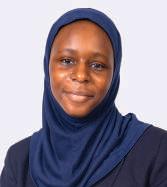














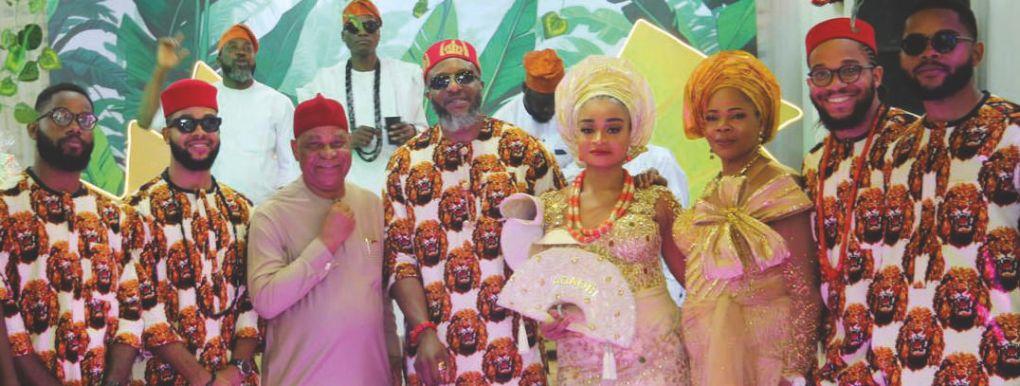
CONGRATULATIONS TO NEWEST COUPLE…
L-R:
Limited, Mrs. Tina Uche Okeke;
Nnamdi Okeke; Mr. Chijioke Okeke; Chief Executive Office, Koil Nigeria Limited, Chief
the
Budget Office Explains Delay, Sets September Target
Festus Akanbi
The Budget Office of the Federation (BOF) has broken its silence on the growing criticism over its failure to publish Nigeria’s Budget Implementation Reports (BIRs) since the second quarter of 2024, assuring Nigerians that the delay does not amount to backsliding but is a product of verification challenges and an unusual fiscal cycle.
In a statement released on Friday, the BOF said it remained “unwaveringly committed” to transparency, accountability, and credibility in public finance, despite frustrations expressed by civil society and market watchers over the prolonged silence.
Civic-tech organisation BudgIT had on Thursday tackled the Federal Ministry of Finance over the non-publishing of the Quarterly Budget Implementation Reports through the Budget Office.
In a statement signed by its Senior Communication Associate, Nancy Odimegwu, on Thursday, BudgIT said the action was a clear violation of the Fiscal Responsibility Act, 2007.
The BIRs, mandated under the Fiscal Responsibility Act (FRA) of 2007, are critical public documents that detail how appropriated funds are being spent each quarter.
For years, budget monitoring groups and international partners such as the IMF and World Bank have leaned on these reports to measure fiscal discipline in Nigeria.
Their absence since mid-2024 has fuelled speculation of either a deliberate blackout or weak institutional capacity.
But the BOF insists the problem lies elsewhere. According to the statement, the delay was largely due to the extended project verification exercise nationwide and the National Assembly’s decision to prolong the 2024 Appropriation Act to December 2025, which disrupted the traditional January–December cycle.
However, the Budget Office on Friday explained that “The scale and geographic spread of appropriated projects demanded
NAPPS Threatens Legal Action Against Katsina Govt over Revocation of Licences
The Katsina State chapter of the National Association of Proprietors of Private Schools (NAPPS) has threatened to institute legal action against the state government for revoking operational licences of its members.
The state government, through the Ministry of Basic and Secondary Education, has terminated the operational licenses of all private and community schools in the state and ordered fresh applications.
The government also reviewed the license application, registration, annual renewal, and school upgrade fees, but warned the affected schools against increasing school fees without the ministry’s approval.
But the state Chairman of NAPPS, Mansur Sani-Jibia, in an interview with THISDAY
Saturday, said the association will drag the state government to court if it fails to revise what he termed a blanket revocation of their licenses.
He said the government has ordered private and community schools to pay a fresh license application fee of N50,000, registration fee of N250,000, N170,000, and N100,000 for those in urban, semi-urban, and rural centres.
He said the state government has also directed the affected schools to pay an upgrade fee of N200,000 and three per cent of their students’ annual school fees to its Single Treasury Account (TSA) on or before September 30, 2025.
He explained that the new license application, registration, and school upgrade fees invalidate the certification given to members of the association by the previous administrations in the state.
extensive physical verification,” , noting that reconciling figures with implementing agencies became a slower process than anticipated. More controversially, it argued that releasing reports under the old budget cycle while the 2024 appropriation was still being executed would have produced “conflicting datasets” and misled stakeholders. Analysts say this marks one of the first times that
a delayed publication has been tied directly to a legislative extension of the fiscal framework, rather than bureaucratic inertia. To allay public concern, the BOF has now set out a timetable to restore statutory compliance. By September 2025, it plans to publish a provisional full-year 2024 Budget Performance Report, providing what it calls a “reliable snapshot of fiscal performance”
even as project-level verification continues. In addition, the outstanding first- and second-quarter 2025 reports will be bundled with this publication. By the third quarter of 2025, officials say, quarterly reports will once again be released on schedule.
“We are determined to restore predictability and rebuild trust with citizens, markets, and partners,” the Office declared.
Observers, however, warn that credibility hinges on execution, not promises. Groups like BudgIT and the Centre for Social Justice have in the past accused the BOF of habitual tardiness, which undermines Nigeria’s transparency ranking. In 2022, Nigeria scored 45 out of 100 in the Open Budget Survey, reflecting middling performance in fiscal openness.
Yemen’s Houthis Confirm Israeli Strike Killed Group’s Prime Minister
Yemen’s Houthis yesterday confirmed that an Israeli air strike earlier this week killed the prime minister of the group’s government in the capital, Sanaa.
Ahmed al-Rahawi was killed in a Thursday strike in Sanaa along with some ministers, the Houthis said in a statement.
Al-Rahawi, who served as prime minister in areas of the divided country that the group controls, was targeted along with other members of the Houthi-led government during a workshop, the statement said.
The Houthis said “several”
other ministers were also killed in the Israeli attack, without offering more details.
The Israeli attack on Sanaa came as tensions in the region continued to escalate amid Israel’s war on Gaza.
The Israeli military said in a statement that its forces on Thursday struck “a Houthi terrorist regime military target in the area of Sanaa”.
Israel has repeatedly targeted Houthi positions in recent months as the Yemeni group has launched attacks on Israel and on Western vessels in the
Red Sea and Gulf of Aden, in what it says is a show of support for Palestinians in Gaza.
The group has repeatedly said that Israeli attacks will not deter its military operations.
Yesterday, the Houthi presidency said its government and institutions would still be capable of carrying out their duties after the deadly Israeli attack.
“The blood of the great martyrs will be fuel and a motivator to continue on the same path,” it said in its statement.
It remains unclear how many people were killed in Thursday’s
air strike.
Quoting unnamed sources, Israeli media reported on Friday that the Israeli army attacked the entire Houthi cabinet, including the prime minister and 12 other ministers.
The attack came four days after Israeli strikes on Sanaa on August 24 killed 10 people and wounded more than 90, according to health officials.
The Israeli military said it had targeted Houthi military sites and the presidential palace in that attack.
Diri Demands PIA Review to Resolve Conflicts on Trust Fund Dispute
Governor of Bayelsa State, Senator Douye Diri, has again urged the federal government to review the Petroleum Industry Act (PIA) to resolve conflicts in the Niger Delta oil-producing communities arising from implementation of the legislation.
Diri made the demand yesterday during the triple celebrations of book launch, 60th birthday, and 25th marriage anniversary of the Chairman of the state traditional rulers council, King Bubaraye
Dakolo, in Yenagoa.
The governor was reacting to a comment by the Minister of State for Petroleum (Oil), Senator Heineken Lokpobiri, who said that litigations in host communities had made it impossible for them to access monies in the Petroleum Industry Trust Fund meant for their development.
Diri noted that when the PIAwas a bill during the former President Muhammadu Buhari’s administration, the state presented its position
that excluding the oil-producing states and local councils from the administration of host communities’ funds, as provided in the then bill, would result in a crisis.
According to him, “the PIA, as it was designed, is a time bomb because the federal government cut off states and local government councils to deal directly with communities. It is my submission that the percentage due to oil companies, conspiratorially reduced from 10 per cent to three per cent, should be reviewed. “I also call on the federal government to immediately review the aspect where states and local governments were excluded from administering what is due to the communities. The states and councils are closer to the communities, and it was wrong to have them excluded from the administration of these communities. The current situation is a recipe for a crisis, and I urge President Bola Tinubu to review it.”
New NCIA Insights on Cassava Spell Economic Potential for Nigeria
Yinka Olatunbosun
A recent report by the Nigeria Cassava Investment Accelerator (NCIA) revealed that there is a huge economic potential yet untapped by Nigeria despite being the world’s largest cassava producer. The report says that Nigeria harvests no fewer than 60 million metric tons annually but this amount represents just 2% of the $180 billion global cassava
processing market. It reads: “For decades, cassava has been treated as a subsistence crop, processed into traditional staples like garri and fufu.” That perception the NCIA report noted, is now shifting. A new wave of investment and enterprise is reimagining cassava as a strategic industrial input — with the potential to unlock $6 billion in value across food, pharmaceuticals, and energy. With processors scaling capacity,
consumer preferences evolving, and private capital entering the space, cassava is beginning to shed its subsistence label and emerge as a growth sector.
The Nigeria Cassava Investment Accelerator is domiciled in Lagos Business School, Pan-Atlantic University, supported by Gates Foundation and implemented in partnership with the Boston Consulting Group.
According to the NCIA re-
search, Cassava is grown across 24 states in Nigeria, particularly in Oyo, Ogun, Kogi, and Benue. These regions combine dense smallholder activity with emerging commercial estates, offering strong supply potential. “In recent years, leading processors and agri-holdings have begun integrating backward — acquiring or leasing farmland, while organising smallholder out grower schemes to secure supply.
Editor: Festus Akanbi
New Laws Put Landlords, Tenants in Uneasy Balance
Unless the government treads cautiously in enforcing compulsory building insurance and Lagos’ proposed rent cap, at a time of mounting housing pressure, it is the poor tenants who will ultimately bear the brunt, Festus Akanbi writes
In a country where the dream of homeownership remains far from the reach of millions, two new laws have stirred ripples across Nigeria’s housing sector.
On one hand, the federal government’s Insurance Industry Reform Act makes it compulsory for landlords to insure their buildings against risks such as fire, floods, and building collapse, with fines of up to N1 million or even jail terms for defaulters. On the other hand, Lagos, the country’s most populous and urbanised state, is proposing a law that will restrict landlords from collecting more than three months’ rent upfront.
The twin policies, ambitious in intent and sweeping in scope, have provoked mixed reactions, applause from tenants, anxiety among landlords, and skepticism from experts. They are unfolding in a country already grappling with a staggering housing crisis.
According to the Federal Mortgage Bank of Nigeria, the national housing deficit is estimated at over 28 million units, requiring more than N21 trillion to close. Lagos alone accounts for over five million of these unmet housing needs, with more than 70 per cent of its 20 million residents living in rented accommodation. In such a context, every new regulation carries high stakes, and the question on many lips is whether these reforms will ease the burden or deepen the pain.
Different Tales
For landlords like Mr. Olusola Olorunniyi, a retired civil servant who built a modest two-storey house in Ikorodu after decades of savings, the reforms feel like a trap. “I spent 10 years building this house,” he said, shaking his head. “The tenants think landlords are rich, but they don’t know the cost of cement, the constant repairs, and the taxes people collect every year. Now the government says I must insure the house, and at the same time, only collect three months’ rent? How will I survive? Banks don’t wait. Contractors don’t wait. This is unfair.”
Like many small landlords, he sees his property not as a business empire but as a form of retirement security. The lumpsum rent collection system, often one or two years in advance, provides a cushion against Nigeria’s volatile economy, where inflation erodes the value of monthly rents and irregular income flows make long-term planning difficult. Stripping that cushion away, while layering on compulsory insurance costs, feels to him like being asked to build a house on sinking sand.
But across the city, tenants like Mrs. Ayo Johson Funmi, a secondary school teacher in Surulere, see things differently. “I earn N120,000 a month,” she explained, “but my landlord asked for N800,000 upfront for a two-bedroom flat. I had to borrow from friends, borrow from a cooperative. It almost broke me. If this new law really forces them to take just three months, it will be a blessing. At least I can breathe.”
For Lagos tenants, the burden of paying one to two years’ rent upfront has been a longstanding nightmare. It locks many families out of decent homes, traps others in cramped apartments, and forces some into debt spirals. Advocacy groups have long argued that such practices are exploitative in a city where housing is scarce and incomes are meagre. The proposed Lagos Tenancy Bill,
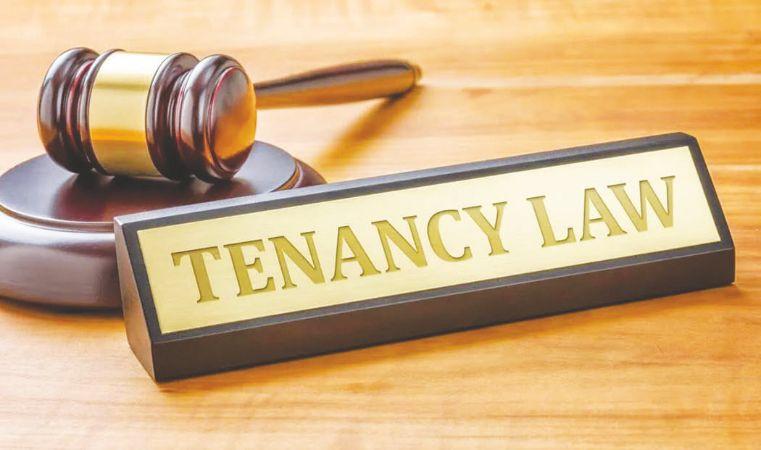
they say, is a long-overdue correction.
Expert’s Warning
Yet, experts warn that the good intentions behind both laws may backfire if not carefully managed.
“The idea of insurance is sound; it protects lives and property,” said Ayodele Olamoju, an estate surveyor and valuer in Lagos. “The rent cap also looks good on paper. But the economic realities don’t support such blanket enforcement. Landlords will find ways around it, either by inflating rents, demanding hidden charges, or pulling their houses off the market altogether. Ultimately, it is tenants who will still suffer.”
His caution is echoed by analysts who point to Nigeria’s weak regulatory record. Laws are often passed with fanfare but falter at the point of enforcement. With institutions underfunded and corruption entrenched, the danger is that the new rules could become another layer of bureaucracy that punishes compliant landlords while rogue operators escape unscathed.
The Insurance Industry Reform Act goes beyond residential housing. It stipulates that all public buildings, from hostels to hospitals, must be insured against hazards, and empowers the National Insurance Commission (NAICOM) to seal off buildings without valid cover. Insurers are also required to pay 0.25 per cent of net premiums into a Fire Services Maintenance Fund, while defaults attract penalties of up to ten times the unpaid amount.
Meanwhile, Lagos’ proposed tenancy law has wider provisions beyond the three-month rent cap. It mandates landlords to issue receipts for every rent payment, with fines for noncompliance. It defines notice periods for evictions, encourages alternative
dispute resolution mechanisms, and seeks to regulate estate agents through mandatory registration and defined commission rates. In theory, these measures aim to bring order to a chaotic sector. But in practice, their success will depend on continuous consultation and adaptation to ground realities.
The Weight of History
Nigeria’s housing woes did not begin today.
From the Shagari low-cost housing projects of the 1980s to more recent public-private partnerships, successive governments have promised to deliver mass housing but fallen short. Corruption, poor planning, and lack of sustained funding have undermined most efforts. The result is a housing market largely left in the hands of private individuals, many of whom build homes not through mortgages but through personal savings, cooperative loans, or remittances from relatives abroad.
In Lagos, where population growth outpaces infrastructure development, the consequences are stark. Slums mushroom along the city’s edges, rents rise beyond the reach of average earners, and disputes between landlords and tenants are settled more often through threats than through the courts. The government’s failure to provide affordable housing has left both sides, landlords and tenants, locked in a tense dance of survival.
Compulsory insurance premiums will almost certainly be passed down to tenants in the form of higher rents. The rent cap, while shielding tenants from lump-sum demands, could lead landlords to increase quarterly or monthly rates as compensation. The result may be that the very people these laws are designed to protect end up bearing new burdens.
For the government, the risk is reputational. By announcing sweeping reforms without addressing the root causes of the housing crisis, the shortage of supply, the absence of affordable financing, and the lack of state-led social housing, it risks being seen as tinkering
with symptoms while ignoring the disease.
The Lagos State House of Assembly has commendably opened the floor to public hearings, inviting stakeholders to debate the proposed tenancy law. Civil society groups, estate agents, and tenants’ unions are lining up to make their voices heard. Yet, as housing rights activists point out, consultation should not end with the drafting stage. Laws must evolve with market realities, and implementation must be backed by resources, monitoring, and political will. For now, the mood remains one of uncertainty. Landlords grumble that their livelihoods are under attack. Tenants rejoice at the promise of relief but fear the backlash. Experts urge caution, warning that both groups could end up worse off. And hanging over it all is the stark fact that Nigeria’s housing deficit, 28 million units nationwide, five million in Lagos alone, will not vanish through regulation alone.
The Road Ahead
What Nigeria needs, many argue, is not just regulation but investment. Massive government-backed housing schemes, affordable mortgage systems, and partnerships with credible private developers are required to bridge the gap. Without these, laws capping rent or mandating insurance risk become Band-Aids on a gaping wound.
As Mrs. Johnson, the schoolteacher, put it with weary optimism, “They say this new law will save tenants. I just hope it won’t make finding a house even harder than it already is.”
Her words capture the fragile balance at stake. Between laws and livelihoods, between safety and survival, Nigeria’s housing sector stands at a crossroads. Whether these reforms will bring relief or chaos will depend not on their intentions, but on how they are implemented, and whether the government finally accepts that the burden of housing its people cannot rest on landlords alone.
Nigeria’s Creative Goldmine Starved of Funds
Nigeria’s creative industry, bursting with global hits and billion-dollar potential, stands at a painful crossroads, celebrated abroad, but starved of the funding and policy support it needs at home, writes Festus Akanbi
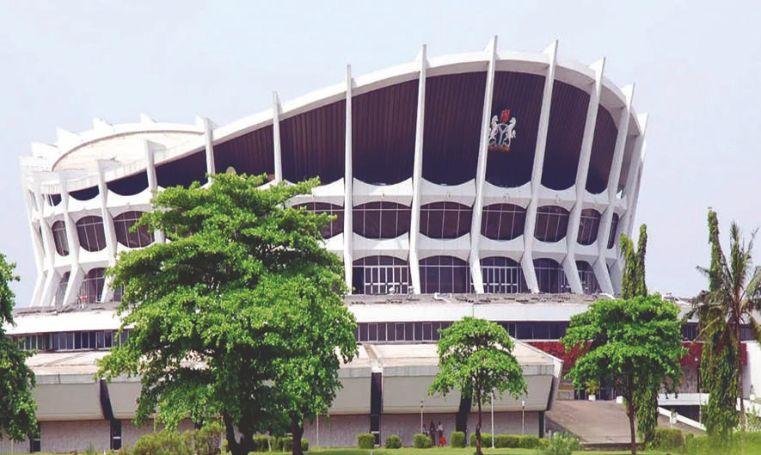
When global streaming giant Spotify announced in 2024 that Nigerian Afrobeats had crossed over 2.2 billion streams worldwide, many clapped with pride. But behind the applause lies a paradox: the industry generating millions in foreign exchange and placing Nigeria firmly on the global cultural map is being suffocated at home by underfunding, weak policy frameworks, and inadequate infrastructure.
Nigeria’s creative industry, which PwC projects could contribute $15 billion to GDP by 2025, is today valued at $6.4 billion. Nollywood produces over 2,500 films annually, second only to India’s Bollywood, and Nigeria’s music industry grossed over $400 million in 2024 alone through streaming, brand deals, and international concerts.
Yet the entire federal allocation to this sector in recent years has often been below N5 billion annually, less than what a mid-range Hollywood film burns on costumes.
Lofty Promises, Meagre Purse
Successive governments have trumpeted the creative sector as the next frontier after oil. The Goodluck Jonathan administration set aside a N3 billion grant for Nollywood and the wider creative industry, promising to boost film production, distribution, and capacity building. While the announcement raised huge excitement, especially among struggling filmmakers, access to the fund was riddled with bureaucracy and a lack of transparency. A handful of established players reportedly benefited, but many upcoming creatives found the doors firmly shut, leaving the scheme with a mixed legacy of promise and disappointment.
In 2019, the Buhari administration, leaning on diversification rhetoric, launched the Creative Industry Financing Initiative (CIFI) with seed capital of N22.9 billion. The Central Bank of Nigeria (CBN) and the Bankers’ Committee promised long-term, low-cost financing to support film, fashion, IT, and music entrepreneurs. By 2020, a bolder figure entered the headlines: N75 billion Creative Industry Financing Initiative. To creatives, it sounded like a lifeline. But four years on, it has barely scratched the surface, reaching fewer than 0.01% of the estimated 4.2 million Nigerians employed in the sector. Loan applications are tangled in bureaucracy, with many applicants citing opaque criteria, unrealistic collateral demands, and banks unaccustomed to evaluating creative assets.
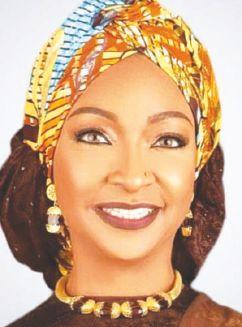
Ideas Remain Trapped in Note- books
That frustration was voiced at the QEDNG Powerhouse Summit in Lagos this year, themed “Financing as Catalyst for a Thriving Creative Economy.” The gathering pulled together policymakers, financiers, media leaders, and creatives.
“The creative industry in Nigeria is one of our most vibrant and resilient sectors,” argued Udeme Ufot, Group MD of SO&U. “Yet despite our abundance of talent and the undeniable economic value of creativity, financing remains the single biggest roadblock. Without sustainable and strategic funding, ideas remain trapped in notebooks, studios shut down, and potential is lost.”
Ufot called for “smart, flexible, and productiondriven financing” designed to protect intellectual property and scale creative enterprises. He pushed for policies that reward innovation and a sector-wide investment fund. His words echoed the broader industry complaint: government treats creativity as a side attraction, not as the economic engine it already is.
Banks and Creatives at Crossroads
The event also underscored a cultural clash
between creators and financiers. Dr. Biodun Ariyo, Group Head at ProvidusBank, reminded participants that “financial houses are a business, not Red Cross.” His blunt statement carried a clear message: banks are willing to lend, but only to structured businesses with scalable revenue models.
Here lies a vicious cycle. Many Nigerian creatives lack formal business training or financial literacy. They struggle to present bankable proposals that reassure lenders. In turn, financial institutions often fail to appreciate the peculiarities of creative work, where intellectual property and brand reputation are assets as real as land or machinery. Without bespoke financial products, both sides remain locked in suspicion.
Founder of Africa Soft Power Group, Dr. Nkiru Balonwu, crystallised the problem: “The issue is not absence of capital, but lack of scalable, structured investment frameworks.” She urged creatives to stop seeing themselves as “just artists” and embrace the role of business leaders and institution builders.
Global Gains, Local Losses
Nigeria’s cultural exports tell a story of success achieved in spite of policy neglect.
In 2024, Burna Boy, Wizkid, and Tems sold out arenas from London to Los Angeles. Nollywood titles topped Netflix charts across Africa and diaspora markets. TikTok and YouTube teemed with Nigerian comedy skits drawing billions of views.
Yet much of the real value circulates outside Nigeria. Streaming royalties are paid in foreign accounts. Many big film productions relocate shoots to South Africa or Ghana, where the infrastructure is better and the incentives stronger. Nigerians make the content; others bank the profits.
According to UNESCO, Africa’s creative sector could generate $20 billion annually and create 20 million jobs if fully harnessed. Nigeria, with its population of over 220 million, should be leading this charge. Instead, it remains hamstrung by erratic electricity, high internet costs, multiple taxation, and weak intellectual property enforcement.
History of Neglect
The contradictions are not new. For years, the government has dangled promises without follow-through. In Buhari’s time, official rhetoric framed the creative sector as one of the twin engines (alongside agriculture) for diversifying Nigeria from oil. Yet little tangible funding followed.
Current Minister of Arts, Culture, Tourism, and Creative Economy, Hannatu Musawa, has
adopted a more ambitious tone. She boasts of a $200 million financing deal secured withAfreximbank, aimed at providing capital for filmmakers and digital innovators. Her ministry has also launched the Creative Leap Acceleration Programme (CLAP) with Lebara Nigeria, promising equitable loans and affordable internet access.
These are important steps, but critics warn they risk going the way of earlier schemes: highly publicised but shallow in reach.
“The sector doesn’t need another slogan,” one filmmaker said at the Lagos summit. “It needs reliable power, modern studios, functional training schools, and access to real credit without collateral we can never provide.”
Youth Unemployment and Un- tapped Potential
The stakes are enormous. Nigeria’s youth unemployment rate hovers at over 40%, one of the highest in Africa. The creative sector already employs over 4 million Nigerians and could absorb millions more. Nollywood alone supports an ecosystem of scriptwriters, actors, cinematographers, editors, marketers, and costume designers. Music employs producers, DJs, promoters, and digital marketers. Fashion sustains tailors, models, and fabric suppliers.
PwC estimates the Nigerian entertainment and media market will grow at 8.8% annually, one of the fastest rates globally. If well-financed, the sector could rival oil as a foreign exchange earner, diversify national income, and deepen Nigeria’s global influence.
Yet many creators still self-fund projects, borrow from friends, or rely on diaspora investors. Training institutions are outdated. Piracy remains rampant. And multiple government agencies demand fees without providing enabling support.
South Africa, with a smaller population, has managed to turn its film industry into a magnet for international productions through structured tax rebates and world-class studios in Cape Town and Johannesburg. The UK, battered by COVID-19, protected its creative workforce with a £750 million relief package, preserving jobs and safeguarding intellectual property.
Nigeria has done the opposite, celebrating individual breakthroughs without creating the systemic conditions for mass success. “We are surviving, not thriving,” said a Lagos-based fashion entrepreneur. “Talent we have, but policy is missing.”
Towards a Real Creative Economy
What, then, must change? Industry experts propose three urgent steps: Establish a Creative Investment Fund, a dedicated, transparent pool backed by government, banks, and private investors to finance production, distribution, and infrastructure; Tailored Financial Products, loans and credit schemes designed for creative assets, not just traditional collateral and Policy and Infrastructure Support, from reliable electricity and broadband to piracy enforcement and training academies.
Just as importantly, creatives themselves must invest in financial literacy and business discipline, building trust with investors and showing they can manage funds.
As Ufot argued at the summit: “Financing must be smart. It must protect intellectual property, stimulate job creation, and scale enterprises.” The consensus was clear — without structural funding, Nigeria will keep producing talent that enriches others while its economy remains on the sidelines.
Nigeria’s creative sector has already proven its resilience. With almost no formal support, it has taken Afrobeats global, made Nollywood a cultural export, and built a thriving ecosystem of digital creators. Imagine what it could achieve with real, sustained investment.
But imagination is not enough. As things stand, Nigeria exports beats and movies but imports dollars and infrastructure. Every arena concert abroad is both a triumph and a reminder of what is being lost.
The choice before policymakers is simple: keep making speeches about diversification while underfunding the one sector already diversifying the economy, or finally back words with resources. The creative goldmine exists; whether Nigeria decides to mine it or watch others take the treasure will define the next decade.
Tinubu’s Brazil Visit and Kaduna’s Strategic Gains
In an era where the clamour of global diplomacy often drowns the voice of meaningful intent, President Bola Tinubu has charted a distinctly focused course, one rooted in a resolute commitment to tangible outcomes for Nigeria and its people. Since assuming office in 2023, he has operated with an unflinching sense of purpose: to restore the nation’s dignity, redefine its global relevance, and reimagine its domestic possibilities. The president’s recent state visit to Brazil was emblematic of this strategic diplomacy: not merely ceremonial, not performative, but substantively transformative.
Brazil and Nigeria, two titans of the Global South, share more than the accident of geography or the mutual echoes of post-colonial struggle. They are bound by immense potential for coop- eration across agriculture, aviation, technology, innovation, and trade. And in the lush diplomatic corridors of Brasília, these latent affinities were finally given structure. But perhaps even more remarkable than the diplomatic choreography was the powerful subnational narrative that emerged from the visit; one in which Kaduna State, under the astute and forward-thinking leadership of Governor Uba Sani, seized the moment with rare clarity and resolve.
President Tinubu’s visit was punctuated by high-level bilateral engagements with President Luiz Inácio Lula da Silva and his cabinet, culminating in the signing of pivotal agreements that spanned critical sectors. These included a Bilateral Air Services Agreement between the aviation ministries of both nations, designed to ease mobility, boost tourism, and facilitate cargo exchange. Diplomatic training and political consultations were formalised through accords between the respective foreign ministries, setting the stage for deeper strategic dialogue.
Most critically, Nigeria’s Minister of Science, Innovation and Technology and his Brazilian counterpart signed a forward-looking memo- randum of understanding covering digital transformation, biotechnology, ocean science, energy innovation, and raw materials research. This, along with another significant agreement between Nigeria’s Bank of Agriculture and Brazil’s National Bank for Economic and Social Development (BNDES), promised to unlock vast opportunities in agricultural finance, rural development, and agro-industrial integration. It is estimated that these agreements could attract over $30 billion in investments to Nigeria in the comingAmidyears.
these grand gestures of national align- ment, the presence of Governor Sani as part of President Tinubu’s delegation signaled the beginning of a new paradigm; one in which Nigerian states no longer wait passively for federal trickle-down, but rather, participate actively in shaping international partnerships tailored to their unique economic aspirations. Governor Sani’s conduct during the visit was nothing short of visionary. Representing not just Kaduna but the future of subnational en- gagement in Nigeria, he moved with precision and preparedness, leveraging the diplomatic atmosphere to negotiate development compacts that directly address the core needs of his state.
The agreements signed by Kaduna State on the sidelines of the Brazil visit read like a manifesto of purposeful governance. With SAMPRES, a leading Brazilian dairy enterprise, the state committed to introducing Girolando dairy genetics and reproductive technologies aimed at establishing a nucleus herd with superior milk yield. The goal is as strategic as it is urgent: to reduce Nigeria’s unsustainable dairy import dependency while positioning Kaduna as a regional dairy powerhouse. This is not dairy for the sake of symbolism. It is dairy as infrastructure, as industry, and as employment.
In partnership with CAMPO, another Brazilian agribusiness leader, Kaduna State will initiate the conversion of underutilised land into pro- ductive agricultural zones. This transformation will be powered by advanced soil correction technologies, modern irrigation systems, and mechanized farming protocols, all engineered to build robust crop value chains in maize, rice, soybeans, cotton, and livestock. The vision is simple: to move from subsistence to surplus, from vulnerability to value-addition, and from import dependence to food sovereignty.
Recognising that agriculture without skills is a recipe for stagnation, Governor Sani also secured an agreement with SENAI, Brazil’s foremost technical and vocational training institution. This collaboration will see the co-development of a curriculum across thirteen technical disciplines; from data analytics to aluminum fabrication and hospitality. It will include dual certifica- tion, joint training of trainers, and institutional strengthening of Kaduna’s newly established
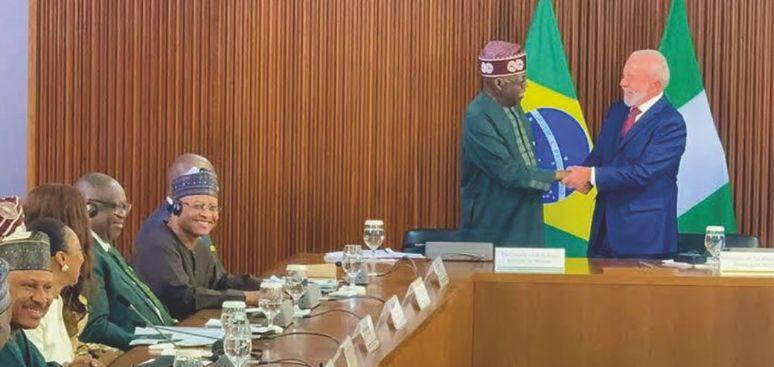
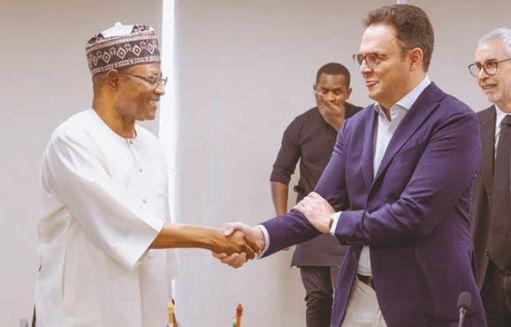
Vocational Training Institutes. This is not an abstract education policy. It is a deliberate bet on youth, on competence, on a labour force ready for both local industry and global opportunity.
Governor Sani understands that skills are not acquired in ivory towers, but in purpose-built centers designed for rigour, relevance, and recognition. Hence, his administration established three Vocational Training Institutes — in Rigachikun, Soba, and Samaru Kataf — all commissioned by President Tinubu himself in June 2025. These centers are now recognised by the National Board for Technical Education as Nigeria’s most advanced hubs of vocational excellence. They offer a blend of traditional crafts and cutting-edge disciplines: from welding and solar installation to artificial intelligence and smart agriculture. They represent the future of employability in a world no longer moved by degrees alone.
The transformation of Panteka Market, Africa’s largest informal skills ecosys- tem, further illustrates the Governor’s nuanced understanding of human capital development. What was once an unregulated sprawl of apprentices and craftsmen has now been integrated into the Nigerian Skills Qualification Framework. Equipped with state-of- the-art tools and training infrastructure, the market now supports over 38,000 learners, preserving indigenous crafts- manship while embedding modern certification standards that open doors to formal employment and international recognition.
This holistic approach to development finds its deepest expression in the state’s
agricultural revolution. Under Governor Sani, Kaduna has not only increased its agricultural spending to exceed the 10 percent Malabo Dec- laration benchmark; it has redefined how agri- cultural investment is conceived and delivered. In 2025 alone, over 100,000 smallholder farmers received free fertilizer, two bags each, under a restructured distribution scheme that prizes transparency and inclusion. Commercial farmers received up to 10 bags at a deeply subsidized rate of N30,000, well below market cost. Yet the most revolutionary aspect is that all 100,000 smallholder beneficiaries were automatically enrolled in a crop risk insurance scheme. This subtle but strategic innovation insulates them from the shocks of climate volatility, pest inva- sions, and market collapse. It is agriculture with a safety net; a rarity in most of sub-Saharan Africa.
Security, long a thorn in the side of Kaduna’s agricultural ambitions, has been addressed through intelligence-driven community partnerships and the reopening of previously inaccessible farmlands. Over 20,000 hectares of land are currently being cultivated, with irrigation systems now deployed to ensure year-round farming. It is a bold response to a perennial problem, and one that aligns with the state’s broader vision of food self-sufficiency.
This singular focus on all-season produc- tivity is critical in a state where agriculture contributes 42 percent of GDP and employs over 60 per cent of the population. By extending farming into the dry season and linking it to storage, processing, and export value chains, Kaduna is not only stabilizing rural incomes; it is structurally transforming its economy.
Governor Sani’s approach is neither romantic nor haphazard. It is grounded in numbers, driven by data, and executed with policy fidelity. Be- tween 2023 and 2025, the agricultural budget surged from N1.48 billion to N74.02 billion; a
4,871 percent increase. With pending supple- mentary allocations, that figure could soon reach 14 percent of the total budget, making Kaduna an outlier in a country where agriculture is too often treated as a political afterthought. Indeed, the state’s Special Agro-Industrial Processing Zone (SAPZ), launched on April 8, 2025, in partnership with the federal government and the African Development Bank, is poised to become the heartbeat of Kaduna’s agro-industrial renaissance. Sited in Daki-Takwas, Chikun Local Government, the SAPZ is a self-contained development corridor housing clusters for production, processing, packaging, and logistics. It is a fully integrated value chain ecosystem with strategic focus on high-yield crops: ginger, tomatoes, soybeans, maize; coupled with cold- chain systems and market access support. TheAfDB’s $934 million commitment to SAPZs across Africa finds in Kaduna a model for replica- tion. The state’s leadership in aligning agriculture with export readiness is further evidenced by the ongoing development of an Agricultural Quality Assurance Centre, which will test, certify, and grade produce for international markets, especially under the African Continental Free Trade Area (AfCFTA). In Kaduna, quality is not an afterthought; it is the threshold of participation in a globalised economy. This seriousness of purpose extends to in- frastructure. Rural roads that had long been neglected are being rehabilitated to link farms to processing hubs and urban markets, drastically reducing post-harvest losses. The Dry Season Agricultural Empowerment Programme, launched in 2024, provided targeted support to ginger farmers, solar-powered irrigation for vegetable growers, and extensive vaccination for livestock herders. Every sector, every season, every farmer, touched by policy, supported by budget, and protected by foresight.
In all of this, the quiet force propelling Kaduna forward remains President Tinubu’s economic reform agenda. By clearing the $7 billion foreign exchange backlog, harmonising exchange rates, and reaffirming investor confidence, President Tinubu has restored Nigeria’s credibility on the global stage. Governor Sani’s ability to leverage that credibility in Brazil speaks volumes. “No investor wants to come in if they can’t repatri- ate their funds,” Governor Sani said candidly, while in Brazil. Now, with macroeconomic sanity re-established, subnational actors like Kaduna can negotiate with confidence, clarity, and conviction.
The Brazil state visit will be remembered not only for its diplomatic elegance but for the profound ways in which it empowered domestic actors to rewrite their own development scripts. Kaduna, through the genius of Governor Sani, did not merely attend: it participated, it negotiated, it secured. And now it builds.
Where once foreign policy was seen as the exclusive preserve of federal institutions, a new era is dawning; one in which subnational leaders with vision, preparation, and political will can shape their destinies on the world stage. The handshake in Brasília was not just symbolic. For Kaduna, it was the beginning of a harvest.
Aliyu, a journalist, resides in Kawo, Kaduna

ON A DIFFERENT PATH
Uba Sani delivers with quiet efficiency, argues LADI
The governor of Kaduna State, Senator Uba Sani, has remained consistently in the news, and always for the right reasons. A seasoned human rights crusader who spent decades fighting for the liberation of the people and advancing progressive causes, he has carried that same philosophy into government. To him, power is not a weapon for intimidation or self aggrandizement, but a sacred tool to provide a better life for the citizenry. This ethos runs through every strand of his administration since assuming office as the chief executive of one of Nigeria’s most influential northern states. Uba Sani quickly set himself apart as a calm, level-headed, and inclusive leader, one whose humility and pragmatism have struck a chord with the people. Today, two years into his tenure, Governor Sani’s exemplary governance is being hailed as decidedly different. Governor Uba Sani’s leadership temperament contrasts sharply with the combative and often abrasive style that came to define ElRufai’s time in power.
Sani has cultivated a reputation for calmness, humility, and approachability. This change in tone is not cosmetic. It has reshaped the atmosphere of governance in Kaduna. Stakeholders, from traditional rulers to community leaders and even opposition voices, now feel they have a seat at the table. It is no surprise that many describe Uba Sani as a “listening governor,” one who prioritises dialogue over diktat, inclusion over isolation. One of the most remarkable hallmarks of Sani’s government is its inclusivity. Kaduna is one of Nigeria’s most diverse states, with complex ethnic and religious dynamics. Indeed, Uba Sani has made inclusivity the cornerstone of his administration.
His appointments cut across ethnoreligious lines, his policies are peoplecentered, and he deliberately fosters dialogue between communities. The effect has been palpable: tensions have reduced, communities feel represented, and the culture of suspicion that once simmered has given way to a renewed sense of belonging. Perhaps the most striking area of contrast with the past is in education.
Uba Sani has opted for a more measured, human-centered approach. His administration has invested in renovating schools, recruiting qualified teachers, and providing learning materials. Model schools are being built across local governments, and partnerships with development agencies are being leveraged to enhance vocational and technical education.
The focus is on access, quality, and inclusivity, not shock therapy. Parents and students alike now speak of a rejuvenated education sector, one that inspires hope rather than fear. In healthcare, too, the difference is clear. Uba Sani has scaled up investments, focusing on primary healthcare centres in rural areas, upgrading secondary facilities, and ensuring a steady supply of drugs and personnel. Maternal and child health programmes have received special attention, and there is renewed energy in the fight against preventable diseases. Importantly, the governor’s approach is community-based, ensuring that interventions reach those who need them most.
Besides, Governor Sani has moved beyond photo ops in agriculture. His administration has rolled out targeted support for smallholder farmers, improved access to farm inputs, and encouraged mechanisation.
OGUNDELE
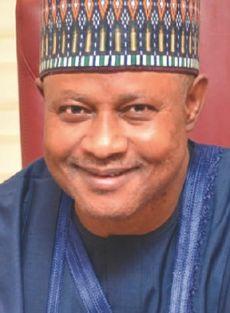
Partnerships with agribusiness investors are yielding fruit, with programmes designed to link farmers to markets and agroprocessing hubs. The emphasis is clear: agriculture must not only feed Kaduna but also generate wealth and employment.
Rural communities are beginning to feel the impact of this shift. Perhaps no issue defines Kaduna’s challenges more starkly than security. Uba Sani has chosen a different path. His calm diplomacy, constant engagement with security agencies, and inclusive community dialogue have begun to yield results.
While challenges remain, as they do across the Northwest, there is an undeniable improvement in both perception and reality of security under his watch. Communities report greater collaboration with local vigilantes, herders and farmers are sitting together to resolve disputes, and the cycle of reprisal attacks is gradually slowing. Kaduna is not yet the oasis of peace it should be, but the trajectory under Uba Sani inspires confidence. The real climax of these differences came in the recent bye-election in Kaduna.
The ruling APC, under Uba Sani’s stewardship, swept the polls, trouncing the ADC, a coalition platform promoted by El-Rufai and his allies. For many observers, this was more than an electoral win. It was a referendum on leadership styles. The people chose the calm, inclusive, peoplecentred governance of Uba Sani over the combative politics of his predecessor.
The result sent a clear message: Kaduna prefers peace to provocation, progress to posturing. Leadership is more than building roads or passing policies. It is about the spirit with which governance is conducted, the atmosphere it creates, and the legacies it leaves behind. El-Rufai’s legacy is that of a bold reformer, unafraid to ruffle feathers, but often leaving behind division and resentment.
Uba Sani’s emerging legacy is of a unifier, a leader who governs with humility, listens with empathy, and delivers with quiet efficiency. In education, healthcare, agriculture, and security, Uba Sani is making steady progress. Kaduna today feels different. It feels calmer, fairer, and more hopeful. Credit goes to a governor who has chosen a different path — one defined by results. As the state continues its journey, it is becoming increasingly clear that Uba Sani represents not only a new style of leadership but also a better kind of Kaduna.
K BOLANLE ATI-JOHN argues that economic blueprints must integrate security as a measure of competitiveness
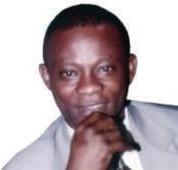
THE MISSING LINK IN NIGERIA’S ECONOMIC DEBATE
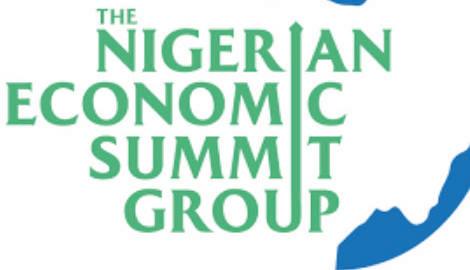
Every year, the nation’s brightest economic minds gather under the umbrella of the Nigerian Economic Summit Group. Policymakers, business leaders, and experts debate, issue reports, and draft communiqués that echo the same central themes: diversification, productivity, and competitiveness. The recommendations are almost always sound on their own terms, addressing crucial needs like monetary policy, infrastructure, and education. The energy is palpable. And yet, when the year closes, very little of the promised transformation is visible on the ground.
There is a reason for this repeated disappointment. In the graphs, models, and policy prescriptions that dominate our discourse, one foundational truth is consistently overlooked. Security is the bedrock of competitiveness.
In advanced countries, security is invisible precisely because it is reliable. Ships dock without fear of piracy. Farmers harvest without fear of banditry. Investors trust digital platforms without fear of fraud. It is this foundation of stability that allows businesses in those nations to innovate, expand, and compete globally. Competitiveness there is not pursued in spite of insecurity; it grows upon the bedrock of security.
Nigeria, by contrast, often attempts the reverse. We chase productivity, reforms, and growth while leaving security fragile. We imagine we can prosper first and secure later. That sequence has never produced greatness for any nation, and it will not for us. This is not simply a gap in policy, it is a blind spot that explains why well-crafted recommendations repeatedly fail in implementation.
The international community often frames this conversation in the language of the security and development nexus. It is a phrase that has become a cliché in donor reports and aid circles. While the idea has value, it casts security as a humanitarian requirement for survival, stabilizing refugees, reducing poverty, preventing collapse. That framing belongs to the language of aid. But Nigeria is not merely surviving, nor should it aspire to be defined by aid logic. Nigeria is a sovereign nation that seeks to compete, to attract investment, to anchor Africa’s economy, and to be respected in the world.
This is why the conversation must shift from a security and development nexus to a security and competitiveness nexus. Development is about catching up. Competitiveness is about leading. Development speaks the language of survival. Competitiveness speaks the language of greatness.
Once viewed through this lens, the Nigerian reality becomes painfully clear. In agriculture, insecurity translates directly into higher costs and lower yields. Farmers in
Zamfara, Benue, and Borno abandon fertile land not because they lack skills or markets but because they fear for their lives. Nigeria imports billions of dollars of food that could have been grown locally. Food inflation is not merely a statistical challenge; it is the economic consequence of insecurity in the fields. Maritime trade tells the same story. For years, the Gulf of Guinea was the global capital of piracy. Nigerian-bound cargoes attracted higher insurance premiums, while traders factored the cost of insecurity into every contract. Port reforms may simplify bureaucracy, but if extortion and physical risk remain, competitiveness cannot be achieved. Even in our celebrated fintech sector, the absence of security shows. Nigeria’s innovators are rightly praised for building apps and platforms used across the continent. But every naira of growth is shadowed by another naira lost to SIM-swap fraud, phishing, and cybercrime. Without secure systems, investors hesitate and users retreat. Energy and industry suffer the same fate. Oil theft in the Niger Delta bleeds billions from the treasury every year. Attacks on pipelines and power infrastructure keep industrial zones perpetually unstable. A country cannot claim competitiveness in manufacturing when the very energy that drives factories is perpetually under siege. And at the heart of it all lies human capital. Insecurity displaces schools, closes clinics, and drives whole communities into despair. The loss is not only human, it is economic. Every uneducated child, every untreated patient, is a future productivity gap.
All these examples, agriculture, trade, digital finance, energy, human capital, are usually presented as development challenges. But they are more than that. They are competitiveness deficits. They explain why Nigerian goods are more expensive, Nigerian services less reliable, and Nigerian markets less attractive.
History reinforces this truth. Rome did not dominate Mediterranean commerce until it secured the seas. Britain’s industrial revolution was not just about steam and coal, it was sustained by the Royal Navy’s control of global trade routes. America’s competitiveness today is built not only on Silicon Valley and Wall Street but also on a vast security architecture that underwrites investor confidence. In each case, security was the non-negotiable platform that allowed other innovations, economic, technological, and institutional, to flourish.
What would it mean to build Nigeria’s competitiveness on security? It means recognizing that security itself is multidimensional.

Editor, Editorial Page PETER ISHAKA
Email peter.ishaka@thisdaylive.com
CRIMINAL SYNDICATE AT KANO AIRPORT
The airports must do more to safeguard travellers’ belongings
In 2019, the late President Muhammadu Buhari intervened when a young Nigerian student, Miss Zainab Aliyu, was implicated in a drug trafficking case in Saudi Arabia. Then a student of Maitama Sule University, Kano, Zainab was arrested after a banned drug, tramadol, was found in her bag. She insisted it was planted in her luggage by unknown persons. Her father, Mr Habib Aliyu appealed to the federal government, the Saudi authorities and the international community to save his daughter from being executed unjustly, as trafficking is a capital offence in Saudi Arabia. At the end, Zainab was spared because she was later discovered to be a victim of a cartel that specialised in keeping hard drugs in travellers’ bags at the Mallam Aminu Kano International Airport in Kano.
Even though the National Drugs Law Enforcement Agency (NDLEA) made some arrests at the time, it is now clear that the agency merely scotched the snake but failed to kill it. Some members of this gang or their successors operating at the airport were recently arrested by the NDLEA. In the various reports that followed the previous arrest, it was not clear if justice was served on the culprits. This may have been the reason why the illicit business has continued till the recent incident.
The lives of three innocent Nigerians are now at the mercy of Saudi Arabia authorities. It is hoped that the NDLEA will make concerted efforts, as it has promised, to ensure they are freed. The agency has confirmed in its investigation that the bags containing the illicit substances intercepted in Saudi Arabia were checked in against the names of the three innocent Nigerian pilgrims, and all the bags were traced to the supposed leader of the syndicate.
The existence of the drugs trafficking syndicate for years at the Kano airport is an indictment on the airport management, the handling companies and other service providers who process passengers and luggage at the airport. The Federal Airports Authority

of Nigeria (FAAN) Aviation Security (AVSEC), which oversees passenger and luggage screening should take the blame. An insider threat in airport security is when a trusted individual with authorised access, such as an employee or contractor, intentionally or unintentionally exploits their position to cause harm, which can include sabotage, theft, data breaches, or facilitating terrorism. The officials at the handling companies who facilitated the tagging of the bags to other passengers clearly exemplify the insider threat, which is dangerous to safety and security at the airports.
Earlier investigations carried out by THISDAY confirmed that personnel of some companies that work at the airports are collaborators in the drug syndicates. They are usually induced with money, as the current case has revealed. There should be a periodic profiling of workers who provide services at the critical areas of the airport like the airside.
SUNDAY NEWSPAPER
editor DAviDSoN iriekpeN
deputy editors FeSTUS AkANBi eJioFor ALike
Managing director eNioLA BeLLo
deputy Managing director iSrAeL iweGBU
chairMan editorial Board oLUSeGUN ADeNiYi
editor nation s capital iYoBoSA UwUGiAreN the oMBudsMan kAYoDe koMoLAFe
THISDAY NEWSPAPERS LIMITED
editor-in-chief/chairMan NDUkA oBAiGBeNA
group executive directors eNioLA BeLLo, kAYoDe koMoLAFe, iSrAeL iweGBU divisional directors SHAkA MoMoDU, peTer iweGBU ANTHoNY oGeDeNGBe deputy divisional director oJoGUN viCTor DANBoYi snr. associate director eriC oJeH associate director pATriCk eiMiUHi controllers ABiMBoLA TAiwo UCHeNNA DiBiAGwU, NDUkA MoSeri director, printing production CHUkS oNwUDiNJo to send eMail: first name.surname@thisdaylive.com
In collaboration with national security agencies, FAAN should engage in comprehensive personnel security checks, profiling the background of the airport personnel and engaging in continuous training of the staff. Using modern technology, the handling companies should embark on physical and cyber security examination of its staff and encourage the culture of awareness and information sharing among security operatives at the airports.
This is critical because airports are windows through which the world evaluates every country. Saudi Arabia or any other country can use these incidents to introduce stringent visa conditions against Nigerians. To avert future security breaches, concerned authorities should reinforce the airports with trained security personnel, deploy modern security equipment, including CCTV, for pre-emptive measures. We also call on FAAN to profile on regular basis those that it gives On Duty Cards which enable them to access the sensitive parts of the airports.
Letters in response to specific publications in THiSDAY should be brief(150-200 words) and straight to the point. interested readers may send such letters along with their contact details to opinion@thisdaylive.com. we also welcome comments and opinions on topical local, national and international issues provided they are well-written and should also not be longer than (950- 1000 words). They should be sent to opinion@thisdaylive. com along with the email address and phone numbers of the writer
LETTERS
INEC AND THE QUEST FOR CREDIBLE ELECTIONS
Few institutions in Nigeria generate as much attention, criticism, and expectation as the Independent National Electoral Commission (INEC). As the body responsible for conducting elections in Africa’s largest democracy, INEC carries the weighty responsibility of determining how power is transferred and how citizens’ voices are heard at the ballot box. In a country where elections are often marred by controversy, the commission is constantly under scrutiny.
Since its establishment in 1998, INEC has presided over six general elections and countless off-season polls. While progress has been made in strengthening Nigeria’s electoral process, the commission has also faced recurring challenges of logistics, transparency, and credibility. Each election cycle brings both new reforms and fresh accusations, leaving many Nigerians questioning whether true electoral integrity is within reach.
One of INEC’s most significant reforms in recent years has been the adoption of technology. The introduction of the Bimodal Voter Accreditation System (BVAS) and the INEC Result Viewing Portal (IReV) was widely celebrated as a game changer. These tools were designed to reduce electoral fraud, enhance transparency, and restore public confidence in the process. However, the 2023 general elections exposed gaps in implementation, with reports of system glitches, delays in result transmission, and allegations of manipulation.
Logistics remain another major headache for the commission. From the late arrival of materials at polling units to difficulties in reaching remote communities, election day operations often reveal the weaknesses of Nigeria’s infrastructure. These recurring logistical challenges not only frustrate voters but also undermine the credibility of the results. Many Nigerians argue that until
logistics are properly handled, technology and reforms will have limited impact.
Security during elections is another pressing concern. Electoral violence, intimidation of voters, and clashes between rival groups remain common features of Nigeria’s elections. Although INEC works with security agencies, it has often been accused of being unable to guarantee a safe voting environment. This has discouraged voter turnout in some areas, weakening citizens’ trust in the democratic process.
Beyond the mechanics of elections, INEC also faces accusations of bias and political interference. Oppositionpartiesfrequentlyaccusethecommission of favouring incumbents, while ruling parties defend its neutrality. This perception problem is as damaging as actual malpractice, since it erodes public trust in an institution that should serve as an impartial umpire.
Despite these criticisms, INEC has recorded notable achievements. Voter
education campaigns, expansion of polling units, and improvements in the voter register have helped broaden democratic participation. Nigeria now has one of the largest biometric voter databases in the world, a resource that could be a valuable tool for governance if properly maintained and updated.
For many Nigerians, the way forward lies in strengthening INEC’s independence. Stakeholders argue that funding for the commission should be guaranteed and insulated from political control, while appointments into its leadership must be based on competence and neutrality rather than political loyalty. Such reforms, they believe, would go a long way in enhancing credibility.
Anwar Adamu, Dept of Mass Communication, University Of Maiduguri.
A Nation That Works, But Doesn’t Care:
The Silent Struggles of Nigerian Worker
ezeh emmanuel ezeh
In a land where the sun rises on empty stomachs and weary hearts, the recent proposal by the Revenue Mobilisation Allocation and Fiscal Commission (RMAFC) to increase the salaries of political leaders feels like a cruel joke, one told at the expense of the very people who hold this nation together. It is not just insensitive. It is a betrayal. As Mr. Peter Obi rightly pointed out, this move exposes a greed so deeply rooted it has become policy - raising the comfort of the few while the many are left to choke on dust and broken promises.
In 2015, the Nigerian minimum wage stood at N18,000, then worth about $120. It wasn’t much, but it was enough to buy a bag of rice, pay for transport, and maybe save a little for emergencies. It was a fragile lifeline, but it held. Today, that same N18,000 barely buys a week’s worth of provisions. With the naira now hovering around N198,000 for the same $120, the Nigerian worker is stranded in a desert of despair, watching the mirage of a better life fade further into the horizon.
Behind the statistics are real people. They are flesh and blood, dreams and disappointments. Professor Nwigwe teaches Geophysics at a federal university in the South-east. He earns N525,000 a month which is roughly $318. For a man who has spent decades shaping minds and building knowledge, it’s a cruel mockery. His hope now lies not in research grants or academic recognition, but in election seasons. That is when he can sells off a piece of his family land to secure an appointment as a INEC returning officer. In three chaotic days, he can earn what would otherwise take him years. He knows the game: take bribes, rig results for rogues, charlatans, and walk away with enough to finish his long-abandoned bungalow in his village. It’s not pride that drives him. It’s desperation. In Kaduna, Musa wakes before dawn. Not because he’s eager to teach, but because he must trek five kilometers to school—he can’t afford the N750 daily transport fare. His N105000 salary vanishes within days. Rent swallows half. Electricity bills, though erratic, demand their share. What remains barely covers food and the occasional paracetamol. His students sit on broken chairs, scribbling in reused notebooks. Chalk is a luxury. One day, Musa collapsed in class—not from illness, but from hunger. The principal handed him N1,000. Musa cried—not from gratitude, but from the humiliation of begging in the very place he was meant to inspire.
Ngozi, a nurse in a government hospital in Abia, works 12-hour shifts, sometimes longer. She’s watched patients die—not because she lacked the skill, but because the hospital lacked gloves, syringes, and antibiotics. Her N35,000 salary cannot stretch across transport, feeding, and school fees for her two children. Last month, her son was sent home for unpaid fees. She pleaded with the school, offering to pay in bits. They refused. She broke down in the headmaster’s office, clutching her ID card like a shield. “I’m a nurse,” she whispered. “I save lives.” The headmaster looked at her with pity. “But who will save yours?”
While Musa and Ngozi wrestle with hunger and humiliation, Nigeria’s political elite bask in obscene luxury. Senators earn millions monthly, excluding gener-
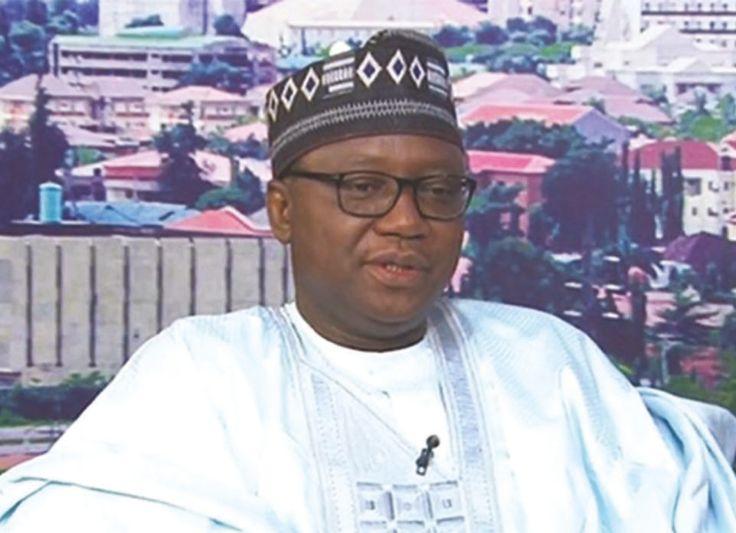
ous allowances. They fly private jets, host lavish parties, and send their children to elite schools in London, Toronto, and Dubai. Their homes are monuments to excess: marble floors, imported chandeliers, fleets of SUVs. When the topic of minimum wage arises, they respond with chilling detachment. “It’s not feasible,” they say, sipping champagne. “The economy is struggling.” Yet that same economy funds their wardrobe stipends, travel allowances, and security votes. The disconnect is staggering. Nigerian workers aren’t just underpaid, they are unseen! Invisible!!
I fear that what is unfolding before us is a haunting echo of the French Revolution. While the elite luxuriate in presidential yachts and jets, the masses starve. Today’s leaders mirror Queen Marie Antoinette; indulgent, aloof, and dangerously out of touch. “Let them eat cake,” Queen Marie once said, oblivious to the fact that those who can’t afford bread cannot dream of cake. That ignorance sparked a revolution, one that tore through feudal privilege and gave birth to the eternal cry: Liberté, Égalité, Fraternité. The guillotine became a symbol not just of rage, but of reckoning. No society survives when the majority starves and the minority feasts.
Centuries later, Nigeria teeters on its own precipice. The political class remains aloof, squeezing citizens dry with taxes while offering little in return. Social services crumble, yet the appetite for revenue grows. The people are stretched to breaking point.
In Lagos, the average worker spends three hours daily in traffic. By the time they reach the office, exhaustion has already set in. Lunch is a rushed N800 plate of rice and beans, eaten without joy. At home, darkness awaits—NEPA has struck again. The generator hums,
but fuel prices have doubled. So they sit in the heat, fanning themselves with old newspapers, dreaming of escape. Many take on side gigs—Uber driving, selling recharge cards, freelance writing—but even these are oversaturated. The hustle never ends. Weekends are for laundry, church, and mental recovery. Vacations? A myth. Retirement? A looming fear.
After decades of service, many Nigerian workers retire into poverty. Pensions are delayed, sometimes for years. Retirees queue under the scorching sun for verification exercises, clutching documents like lifelines. Some collapse. Some die. Their families mourn not just their passing, but the indignity of their final years.
Baba Sule, a retired local government worker, waited five years for his pension. He survived on handouts from neighbours. When he finally received N1.8 million, he used it to buy a secondhand wheelchair. His legs had failed him after years of untreated diabetes.
Mrs. Nwakaego returned from the farm one afternoon to find her husband lifeless. He had never recovered emotionally after the government demolished his shop to make way for a dual carriageway - on a road so desolate, one could count the number of vehicles that passed. The business was his lifeline. When it vanished, so did his will. Since then, Nwakaego has shouldered the burden alone, selling vegetables in front of their rented apartment. Today, the circle tightens even more: Widowed. Poor, and desperate. Beyond financial strain lies a deeper emotional toll. Nigerian workers battle depression, anxiety, and hopelessness. They smile through pain, laugh through tears, and pray for miracles. Politicians urge them to “tighten their belts” while loosening theirs. Workers are told to be patient, patriotic, and enduring. But how long can one endure starvation,
humiliation, and neglect?
President Tinubu’s recent remarks, shifting blame to governors and claiming he’s “doing everything to raise revenue” ring hollow. His reforms seem focused on extracting more from the people, not empowering them. And while he points fingers at fellow indulgent governors, his ministers pursue bizarre priorities: N146 billion earmarked for bus terminals in zones where there are no roads to reach them, N14 trillion for coastal highways while citizens sleep on kidnapping-infested roads between Ore and Benin.
Yet the indignity of the Nigerian worker is not entirely lost on the APC, which has resorted to another round of palliative theatrics. Governor Hope Uzodimma recently announced a new minimum wage of N104,000, roughly $65 or £49, barely enough to cover basic monthly expenses. Governor Nwifuru, while constructing extravagant underground tunnels, declared a N90,000 wage, about $54 or £42, in a state where economic activity has ground to a halt under his administration.
And yet, despite it all, the Nigerian worker remains resilient. They show up. They teach, heal, build, clean, and serve. They raise children with values, even when the system offers none. They protest, vote, and speak out. Their spirit is battered but not broken. That is the tragedy and struggles of the Nigerian worker.
They deserve more. Not just a living wage, but a life of dignity. Let RMAFC not become the historic Queen Marie Antoinette that ignites the spark leading to revolution and social unrest.
• Dr. Ezeh, President of the Ebonyi State Chamber of Commerce, Industries, Mines and Agriculture (ECCIMA), writes from Enugu
TikTok Eyes Nigerian Music Industry

AFRIMA 2025 Nominations Show Rising Stars as Big Contenders
Vanessa Obioha
The All Africa Music Awards (AFRIMA) recently announced its nominees for the 2025 edition, and the list shows that Nigeria’s rising stars are putting up stiff competition against wellknown artists. For instance, Shallipoppi, whose rise to fame has been steady over the past year, is nominated for Artiste of the Year alongside heavyweights like Burna Boy, Davido, Fally Ipupa and DJ Maphorisa. The young talent also earned nods in Best African Collaboration for his song ‘Laho’ featuring Burna Boy, as well as Song of the Year and Breakout Artiste of the Year, bringing his total to four nominations.
Ayra Starr also holds her ground with two nominations. She is the only Nigerian female artiste in the coveted Artiste of the Year category, while her second nod comes in Best Female Artiste in Western Africa, where she and Tiwa Savage are the only Nigerian contenders. Other up-and-coming names are not
TikTok is deepening its footprint in Nigeria’s fast-growing music industry with the launch of TikTok for Artists, a tool designed to help musicians monitor and maximise their data. Though rolled out globally earlier in the year, its arrival in Nigeria signals the platform’s recognition of the country’s influence on global music trends.
Music has always been part of TikTok’s DNA, and Nigerian acts have long leveraged the platform to catapult their careers. From CKay’s ‘Love Nwantiti’ to Rema’s ‘Calm Down,’ which spawned a Selena Gomez remix and became the second best-selling global single of 2023 with 1.89 billion streams, TikTok has been a springboard. More recently, Darkoo’s 2024 ‘Favourite Girl’ went viral with countless dance videos, while young talent Tenorboy found new fame after jumping on Kenyan musician Mr Tee’s ‘Digii,’ a hit that later birthed collaborations with Ugandan artist Joshua Baraka.
Now, TikTok for Artists offers an all-in-one insights platform for artists, labels, and their teams. It delivers detailed performance metrics, from song views, posts, and creator engagement to post-level analytics such as likes, comments, shares, and completion rates. It also provides follower insights, breaking down audience demographics by age, gender, and language.
Beyond analytics, the platform comes with educational resources, step-by-step guides, and support aimed at helping artists build long-term, sustainable careers. Artists with certified TikTok Artist Accounts can also grant access to managers and labels, ensuring that the right teams have the data needed for effective campaign planning.
“Tiktok has always been a key space for music discovery and promotion across Africa,” said Toyin Mustapha, Head of Music Partnerships for the UK, Ireland, and SSA at TikTok. “With the launch of TikTok for Artists in Nigeria, we’re giving artists and their teams access to insights that can help them engage their fans in more meaningful ways and grow their careers globally.”
In addition, TikTok introduced a Pre-Release tool, enabling artists to create campaigns for upcoming albums and giving fans the option to pre-save directly on streaming platforms like Spotify and Apple Music.
in the Most Promising Artiste of the Year category, with Kunmie also securing a nomination for Best African Artiste, Duo or Group in African RnB & Soul for her song Arike.
While the industry giants such as Burna Boy and Davido still dominate with five nominations each, the presence of these younger talents underscores a broader shift. Stardom is no longer the preserve of the chart-toppers; hardworking new acts are steadily claiming their space. Their recognition also shows how Africa’s music economy is diversifying, as fresh sounds, when coupled with the right platforms and visibility, attract new audiences and open fresh markets. Qing Madi’s distinctive style, for example, has already carved out a lane uniquely her own.
The 2025 AFRIMA Awards, therefore, will not only celebrate the established icons but also spotlight the continent’s future, a tradition it is known for. For these rising stars, the nominations mark both validation and elevation, ensuring their names remain firmly on the lips of music lovers for years to come.

Toke Has a Baby. Falz Has
a Bride?

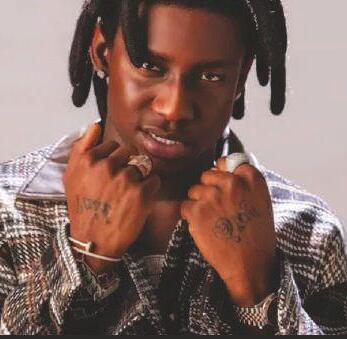
It was a week of blissful updates for media personality Toke Makinwa and rapper Falz, who both surprised fans with life-changing announcements.
For Toke, it’s the joy of motherhood. The 40-year-old star, who recently revealed her pregnancy after many attempts to join the “mommy’s club,” announced the arrival of her baby girl.
On Instagram, she wrote: “I’m a Mommy… This is the happiest I’ve ever been.” She also shared her daughter’s names: Yakira Eliana, Olakitan, Iyanuoluwa, Ikeoluwa and Adunola.
While Toke basks in the glow of motherhood, Falz stirred curiosity with what appeared to be a wedding announcement, or perhaps a teaser. Known for keeping his private life out of the spotlight, the rapper posted photos on Thursday of himself and a woman dressed in traditional attire. The dimly lit images kept her identity hidden, and Falz offered no details, writing only: “It’s been a long time coming, and having to do this with you is one of the best decisions of my life.”
He capped the post with the playful line: “First of all… introduction,” nodding to Olamide’s 2012 hit ‘First of All.’ The caption suggested the couple may be heading into the traditional family introduction ceremony before marriage.
Still, fans aren’t entirely convinced. In the comments, many wondered if the images might be part of a music video or promotional campaign — a common celebrity tactic — even as they sent their congratulations.
Whatever the truth turns out to be, both Toke and Falz have given fans plenty to celebrate.
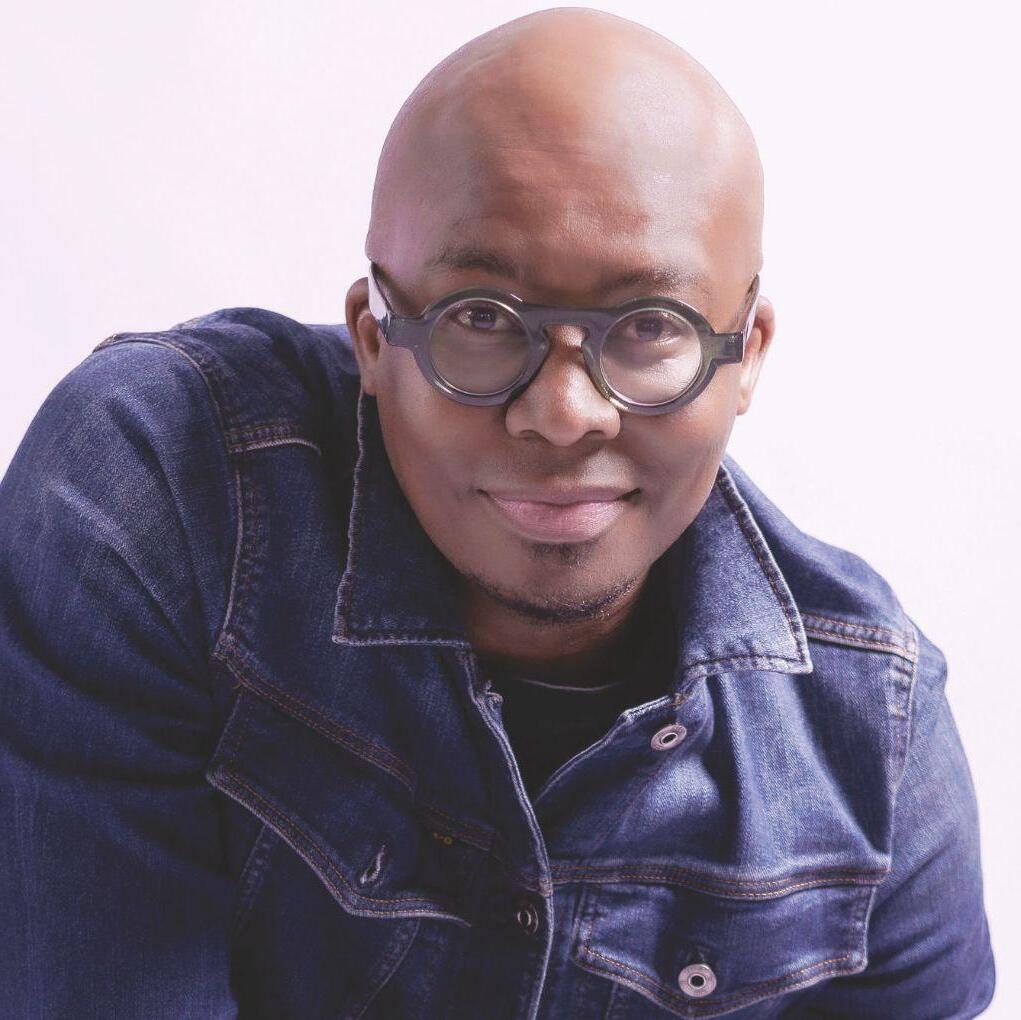
AdvAncing digitAl SAfety through Storytelling Monde twAlA
How can we help children be children in the digital future is the question at the centre of the new campaign‘Room of Safety,’a partnership between Paramount Africa and MTN . Vanessa Obioha speaks to Paramount Africa’s Senior Vice President and General Manager, and Lead BET International, Monde Twala on creating online spaces for young Africans through authentic storytelling.
Advancing Digital Safety Through Storytelling
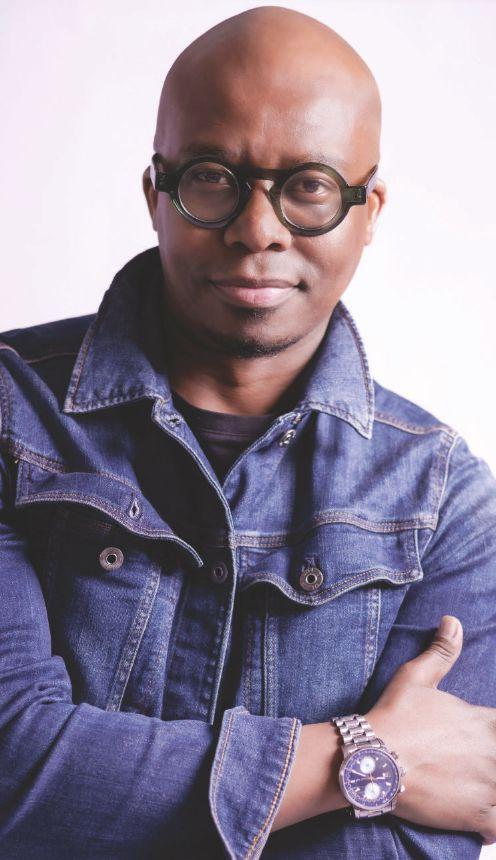
The urgency to protect children from harmful online spaces has never been as critical as today. The statistics are worrisome. Recent research conducted by Ipsos in partnership with MTN across Nigeria, South Sudan, and Zambia reveals alarming trends in online behaviour among children aged 8–17. One in 10 children in Nigeria and South Sudan reported being harassed online, with South Sudan recording the highest rate of bullying at 20 per cent. In Nigeria, 79 per cent of adolescents aged 13–17 spend more than an hour online daily, increasing their exposure to risky behaviour. Between 30 and 40 per cent of teens across the three countries admitted to adding strangers to their messaging apps.
These findings form the backdrop for ‘Room of Safety,’ a campaign launched by MTN Group in collaboration with Paramount Africa to help young people navigate digital risks. The 10-part series, which premiered on July 20, 2025, on MTV Base, features Paramount’s Culture Squad member Craig Nobela alongside a dynamic lineup of African influencers including Yanda Woods,
LordKez, Foyin Ongunrombi, Azana, MajorSteez, Melissa Nayimuli, Mawelele and Naledi. Through relatable storytelling and youthdriven content, the series sparks dialogue, raises awareness, and equips young people with tools to report harmful behaviour online.
For Monde Twala, Paramount Africa’s Senior Vice President and General Manager, and Lead BET International, the campaign is part of a much broader mission: using entertainment not just to entertain, but to shift behaviour, spark dialogue, and give young Africans the tools to thrive in today’s world.
Twala joined Paramount Africa in 2016 after nearly two decades in South African broadcasting, including roles at the public broadcaster SABC and commercial channel e.tv. In 2019, he joined the board of the MTV Staying Alive Foundation, supporting youth education series such as MTV Shuga in South Africa and Nigeria. Since then, he has overseen a wide slate of programming at Paramount, from the MTV Africa Music Awards to scripted biopics, reality formats, and BET programmes that celebrate Black excellence.
Known for his inclusive leadership style, guided by the African adage
Umuntu nguMuntu ngaBantu (“It’s the people around us who make us who we are”), Twala also holds an Advanced Management Degree from Wits Business School, with a focus on marketing and business management. His mix of creative vision, cultural advocacy, and academic grounding has earned him recognition as a champion of youth development and mentorship across the continent.
Under his leadership, Paramount Africa continues to build on its long tradition of advocacy through entertainment. From Shuga, the lifestyle drama that raised awareness about HIV prevention and reproductive health, to programming that has addressed mental health and gender equality, the network has consistently championed youthfocused causes. With ‘Room of Safety,’ that advocacy expands to one of the most urgent frontiers of youth culture today: the digital space.
“Advanced technology is a fantastic enabler,” Twala told me in a recent interview. “But it also comes with a responsibility to make sure young people can navigate and create a safe digital experience for themselves.”
This concern is at the heart of the partnership with MTN.
“We came together with MTN to focus on how we can enable young people and help children be children in this kind of new digital future.”
For Twala, the dangers of online from cyberbullying to damaging content are too hard to ignore and demand a collective response.
“How do you create more awareness about cyberbullying to protect young ones?” He queried. “Unlike television which is a regulated platform with age restrictions, online doesn’t have such protections. Online requires a deeper dive in terms of making sure that young people are doing some peer-to-peer education and reporting misaligned content,” and that, he said, is what the campaign is driving.
Paramount Africa’s unique contribution lies in its storytelling power.
“Because we are a youth cultural platform that talks to youth and entertainment culture on the continent, storytelling became an important piece,” Twala said. “How do we take research that is aggregated from young people by young people? How do we take that and turn it into content that you know is in a youthful tone, relatable and authentic?”
The result is a series that not only entertains but also educates. Episodes explore topics such as the pressures of instant gratification on social media, while also instilling confidence in young people to navigate digital spaces responsibly.
“‘Room of Safety’ series is entertaining, but it’s also a researchbased campaign that is informed by the youth. It’s by Africans for African youths.”
At the core of this partnership with MTN, according to Twala, is to empower young people, particularly young children who are not of age yet, with the right digital tools to report such harmful behaviours, and also collaborate together and share experiences.
“We need to make sure that they are doing that in a safe and responsible way,” he said, while lauding MTN for initiating the project.
“I’m very proud of the partnership with MTN,” Twala added. “They have been proactive, mindful of the markets they operate in, and willing to listen. The Help Children Be Children research was
conducted across multiple countries, and it’s the young people who were interviewed, telling us about some of their experiences. It’s a youth-led tool that will help societies show up better, and most importantly, it teaches children not just how to use technology, but how to report harmful content when they encounter it.
“You’re taught how to use a cell phone, you’re taught how to go online, but you’re not taught how to report the negative platforms, etc, but the tools are there. They exist, especially now, in this new AI world. We have to help our markets and especially our young communities to navigate this new techknowledge driven space and focus on making sure that they can thrive and not be hurt online.”
The timing of the campaign, he added, could not be more critical.
“We are faced with different realities of the impact of digital and online space and it is not unique to Nigeria. It’s across the continent and the world,” he said. “Africa is still the youngest continent in the world. So, we are a learning continent, and therefore it makes it very important for us to shape a safe digital future and a digital experience for children across the continent.”
The feedback has been encouraging so far.
“The engagement has been great on social platforms and on-air,” Twala said. “I think it’s also about sparking conversations. I’m able to talk to young people or my own children, parents will be able to engage with young people, and our children will be able to engage with their peers. That’s what we want to inspire. We want to inspire a direction where we can have conversations and exchange information that can really create a safe, digital future for all of us, including our children.”
For Twala, the overarching goal is clear: storytelling that shifts behaviour.
“We want to enhance storytelling that is able to shift behaviour, educate young people, help them build the tools and ability to really report harmful content online and address issues in their voice, in their tone, in real, lived experiences. So partly, there’s a reality format in this initiative and partnership with MTN Room of Safety,” he said.
“Our hope is that we will be able to shape behaviour that can really create a digitally safe and knowledgeable experience for all young people, for many, many years to come.”
Beyond ‘Room of Safety,’ Paramount Africa continues to inspire young people through other projects. The upcoming third season of ‘Inside Life: The Hustle Diaries’ on MTV Base chronicles the rise of stars like Cobhams Asuquo, BamBam, Spyro, and Neo Akpofure, showing the grit and determination behind their success stories.
“We all want to know where some of our big stars come from,” Twala said with a smile. “And I think the third season byline for the show, Hustle Diaries, talks about ambition, rootedness, determination and living out your dream. And, of course, it also talks to and showcases some of the best talent from Nigeria.
“No doubt Nigeria is the entertainment mecca of the continent. That’s also inspired us, from a Paramount perspective, to really make sure that we can continue to deliver content that can inspire, that can reflect authentic journeys in an entertaining way,” he shared.
As the conversation wound down, Twala circled back to his core vision.
“Youth perspectives are very important to us. What entertains them, what concerns them, and how we can shape narratives that unlock their potential is the heartbeat of everything we do.”
The King of Kogi’s Quiet Throne
It is not the drums of politics that announce Yahaya Bello these days, but the hush of marbled hallways in his Abuja estate. The former governor has traded convoys for chandeliers, yet his voice still sails into Kogi like incense that lingers long after the flame is gone.
Only months out of office, Bello has mastered the art of retreat without surrender. His mansion doubles as a command post, a place where loyalty is polished like silverware. From here, he counsels newly minted lawmakers, reminding them that elections are never won alone, but sustained by obedience to the house of Bello.
In a video now threaded across social media, he welcomed Hassan Shado, the victor of Kogi’s Okura byelection. Bello’s counsel was stern, even paternal: support Governor Ododo in everything, even the unfamiliar, even the inexplicable. Politics, he hinted, was not the noble
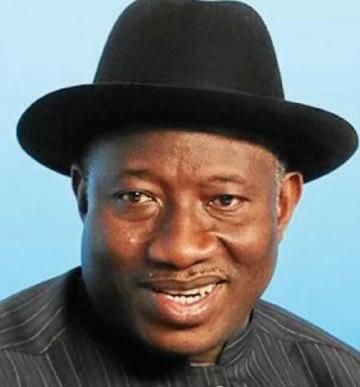
Jonathan
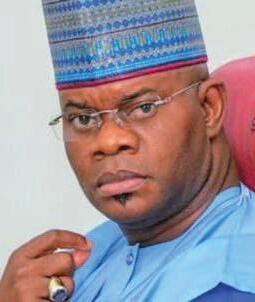
In Nigerian politics, nothing stays buried for long. Not even a presidency. So when banners of Goodluck Jonathan suddenly bloomed at the
with KAYoDe ALFreD 08116759807, E-mail: kayflex2@yahoo.com
...Amazing lifestyles of Nigeria’s rich and famous
craft of independence but the quiet sport of alignment.
Such words startled many Nigerians, who took to X to mock what they called the burial of democracy in plain sight. “We are in a zoo,” one user spat, despairing at a country where lawmakers are trained to bow before they sit. Others warned of revolution, of citizens tired of watching actors in a rigged theatre.
Yet Bello, ever the godfather, insists it is unity, not subservience, that holds the ruling party upright. He speaks of continuity as if it were inheritance, a reign that stretches beyond terms of office, weaving his protégé Ododo into a dynasty of loyalty. After Ododo, he suggests, another will come. Always from inside.
The irony? Bello, once chased by antigraft agencies and critics alike, seems more comfortable in this shadowed monarchy than he ever did under the sunlit scrutiny of office. He has built a throne without a crown, a kingdom without ballots. And from his estate, the silence feels louder than the statehouse itself.
Goodluck Jonathan in the Air Again
PDP headquarters in Abuja, whispers began to swirl like harmattan dust: could the man who bowed out in 2015 be plotting a return?
Party insiders say the conversations are real. Senator Abba Moro hinted that emissaries are quietly urging Jonathan to reclaim the party’s flag. Their pitch is simple: his calming presence, his history of concession, his image burnished by nostalgia might steady the PDP’s wobbly ship ahead of 2027. Jonathan has said nothing. Silence, in this case, is gasoline. Every poster, every photo of his smiling face at Wadata Plaza, fuels speculation. To some, he is the antidote to rancour. To others, he is a tired replay of a familiar script. Which side does time favour?
The PDP is desperate for reinvention. The party admits it miscalculated in 2023 with Atiku Abubakar. Internal bickering drained its energy, defections thinned its ranks, and a younger electorate drifted toward fresher alternatives.
Now it looks backwards, as if yesterday’s leader could unlock tomorrow’s votes.
Critics bristle at the idea. They warn that dressing Jonathan up as a consensus saviour may only deepen rifts within the party. Besides, would he risk his softened legacy in a bruising contest, knowing the presidency is an arena that devours even the willing?
Yet his face keeps reappearing, not only in Abuja but across Kano and other northern states, stamped with slogans that echo revival: “The Goodluck Nigeria Needs.” Supporters insist he is the bridge between fractured regions, the familiar name that can soothe uncertain times.
But there is irony here. The more his allies insist he must run, the more Jonathan himself remains unmoved in public, as if savouring the power of absence. Perhaps he knows something the rest of Nigeria forgets: sometimes the loudest campaign is the one never declared.
Mike Adenuga’s Glo at 22: A Network Still Dreaming in Green
Not every empire begins with fanfare. Some arrive with a whisper, then settle into the national bloodstream like a secret everyone suddenly knows. That was Globacom in August 2003. Today, 22 years later, it celebrates not just survival, but an audacious reinvention of how Nigeria stays connected.
The green glow has never been modest. From pay-per-second billing that rattled early competitors to Glo-1, a submarine cable stretching nine thousand kilometres from the United Kingdom to Lagos, the company built its legend on boldness. Mike Adenuga, its elusive founder, seemed to prefer letting infrastructure, not speeches, do the boasting.
Now, in its 22nd year, Glo is chasing another metamorphosis. Hundreds of new LTE base stations dot city skylines and rural fringes. Fibre cables, once frayed by reckless roadworks, are being rerouted like veins stitched anew.
It is a costly surgery, yes, but it is a surgery Adenuga’s Glo insists keeps its
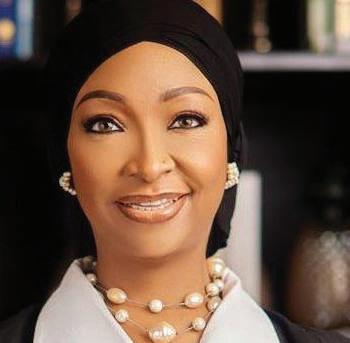
promise alive.
There is also a quiet greening within the green brand. Hybrid power stations and battery sites replace the drone of generators, a nod to sustainability in an industry notorious for guzzling fuel. Even the interruptions of vandals and saboteurs are framed not as defeats but as tests of stubborn resilience.
Still, shadows linger. Subscriber numbers have swung wildly, from dizzying highs above sixty million to sharper dips. The Nigerian telecoms market is a battlefield where loyalty is fleeting and competitors circle. Yet Glo continues to carry the confidence of an institution that believes anniversaries are markers of momentum rather than of age.
So what does it mean for a company to last 22 years in a country where even roads struggle to outlive a rainy season? Perhaps it means that Nigeria, chaotic as it may seem, rewards those who dream in big, glowing strokes. Adenuga keeps dreaming, so Glo keeps dreaming. The rest of us keep Adenuga
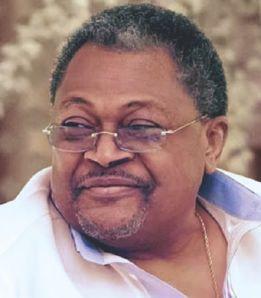
Yayi
and the Whisper of
2027
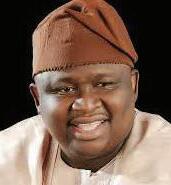
In Ogun politics, whispers travel faster than campaign banners. And lately, one name keeps threading its way through roadside chatter and polished boardrooms alike: Senator Solomon Adeola, fondly called Yayi. His growing momentum suggests that the governorship in 2027 might no longer be a guessing game. For decades, Ogun West has waited. Since the state’s creation in 1976, leadership has tilted toward Central and East, leaving West as an economic contributor without gubernatorial representation. To Yayi’s supporters, his candidacy is more about overdue justice, a balancing act in the geography of power, rather than only politics.
Yayi is not exactly a novice in the theatre of governance. His résumé stretches from the Lagos Assembly to the National Assembly, across committee rooms where budgets and policies are hammered into shape. Today, as Chairman of the Senate Appropriations Committee, he speaks the language of numbers and negotiations fluently.
His recent 56th birthday showcased something rarer than cake or fireworks: a synchronised celebration across all three senatorial districts. The gesture was less about festivity than about symbolism, a reminder that his support cuts across Ogun’s historic divides. For a fractured political space, that tableau of unity mattered.
Groups like the Fayab for Yayi Ogun 2027 Movement now frame his ambition as a people’s project. Their mantra is equity, good governance, and grassroots development, stitched with the promise of sustainable growth. To them, Yayi is not merely a candidate but a vessel for inclusion and renewal.
Of course, the race is far from scripted. Ogun politics remains crowded and unpredictable, with shifting loyalties and rival ambitions. But analysts note that Yayi’s crossdistrict popularity, his legislative capital, and the symbolism of West’s turn have given him a peculiar momentum. It feels like gravity, not hype.
The real question is whether Ogun voters will see him as more than rotation’s answer. For if 2027 crowns Yayi, the story will not only be about Ogun West’s turn. It will be about whether whispers, at last, became a chorus loud enough to reshape history.
Hannah Musawa and the Architecture of Dreams
In Nigeria’s crowded corridors of politics, Hannah Musawa moves with the rhythm of someone sketching a future on invisible parchment. A lawyer by training and a minister by appointment, she has turned her portfolio into a stage where culture, art, and ambition learn to dance together. Recently, her choreography reached Paris. Musawa sought partnerships with French officials and even the Louvre in hopes of accelerating Nigeria’s museum renaissance. In the same breath, she secured €100 million from the French Treasury to seed creative hubs that could rewrite the economy’s script.
The plan is audacious. Lagos, Abuja, and Katsina will host the first hubs, with Enugu, Kwara, and Akwa Ibom waiting in the wings. If completed, every Nigerian state will have a space where creativity is infrastructure rather than a hobby, an arena where imagination becomes as tangible as cement.
Musawa knows the country’s fragility. Funding is scarce, promises are heavy, and history is littered with unfinished projects. Yet she insists innovation, not lamentation, will carry the day. “We have had to be creative,” she says, framing scarcity as a spark rather than a shadow. Her record already shows this pivot. Plans for creative arenas in Abuja and Lagos, a signed MOU for a Creative City, and restoration projects for museums speak to a ministry that
refuses to shrink under fiscal drought. Each initiative signals a refusal to reduce art to an afterthought. It would be inaccurate to think of Musawa as only a minister. She is the daughter of an activist, a student of foreign universities, and the woman who once worked on election petitions before stepping into policymaking. Her story bends across law, oil, politics, and now culture, a life insisting on multiplicity. Whether Nigeria’s creative economy rises to meet her grand vision is uncertain. But if €100 million can be turned into bricks, arenas, and hope, then Musawa will not merely have held office. She will have built, note by shimmering note, a chorus strong enough to outlast her tenure.
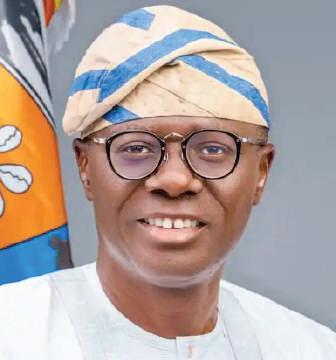
The sea does not sleep in Lagos. It laps, it gnaws, it sneaks onto shorelines where new houses sprout faster than the tides retreat. Governor Babajide Sanwo-Olu knows this dance well, which is why he spends his mornings chasing encroachments before they swallow the coast.
Babajide Sanwo-Olu and the Relentless Choreography of a Cleaner Lagos
Lagos is not a city that rests politely within its borders. It pulls in dreamers, traders, hustlers, migrants, piling them into an already strained metropolis. Keeping it habitable requires more than rhetoric. Sanwo-Olu has turned environmental stewardship into a rhythm of policy, inspection, and, at times, sheer improvisation.
On a recent shoreline tour, the governor reminded Lagosians that the coastline is not just scenery but protection. Letting it collapse beneath illegal construction risks flooding and loss. By insisting on compliance with environmental laws, his administration aims to preserve both biodiversity and livelihoods.
The task is messy. Mountains of trash rise daily from homes, markets, and factories. Through the Lagos Waste Management Authority, the state has deployed thousands of sweepers and a small navy of waste-collecting boats to chase debris across canals and lagoons. Even plastic bottles are now part of a recycling economy-in-
the-making.
In Sanwo-Olu’s Lagos, construction debris gets tracked, landfills are decommissioned, and new sanitary sites sprout where uncontrolled dumps once smouldered. The Blue Box initiative teaches households to sort waste, children included, planting the seeds of habit that could outlive any administration.
The measures stretch beyond trash. Public toilets multiply in markets and motor parks. Styrofoam food packs, long a menace to drainage, are banned. Partnerships with recycling alliances and community groups turn sanitation into both a civic duty and a small industry.
Still, the question lingers: can one governor tame a city so endlessly alive? Lagos resists containment, as if chaos were part of its DNA. Yet each cleaner street, each unblocked canal, each child who learns to separate bottles from scraps whispers that maybe, just maybe, the tide can be taught new steps.
Brilliance in Awele Elumelu’s DNA … As She Dazzles Her Audiences
Some people inherit heirlooms of silver; Awele Elumelu seems to have inherited a restless shine. On stage, she carries herself less like a corporate figure and more like a conductor coaxing music from an orchestra invisible to the audience but alive in her words.
She is a physician by training, an entrepreneur by choice, and something of a bridge by instinct. Between public gaps and private capital, between Nigeria’s stubborn difficulties and its still-dormant possibilities, she has made herself the negotiator of futures.
Recently, at the International Business Conference in Lagos, Awele’s voice rang with conviction. Nigeria, she said, is no pit of despair. It is a goldmine waiting for miners willing to sweat. With 226 million citizens, more than half of them young, she described a market bursting with untapped brilliance.
Awele’s healthcare ventures, Avon HMO and Avon Medical, are more than companies. They are a wager that Nigerians should not need to fly to London or Dubai just to see
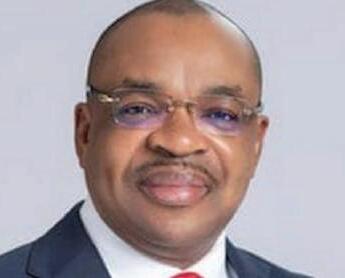
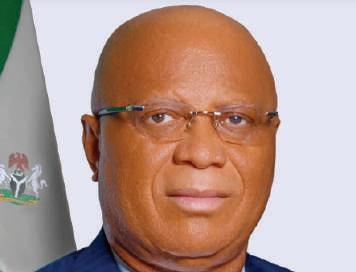
specialists. They are also proof that private ingenuity can sometimes outpace the promises of government blueprints.
She is not all speeches and strategy. Behind the podium is a doctor who once worked in emergency wards in Lagos and Grantham. Her patients were not statistics. They were children in need of vaccines, women waiting for safe delivery, and families hoping not to sell land just to pay bills.
Awele’s commitments extend to the Tony Elumelu Foundation, which has seeded thousands of African entrepreneurs. She calls this Africapitalism: the belief that wealth is meaningful only when it multiplies opportunity. Lofty? Yes. But in her cadence, it sounds less like doctrine and more like an invitation.
Critics sometimes say Nigeria’s problems are too entrenched for optimism. Yet when Awele speaks, one wonders if optimism is not naivety but a strategy of its own. Perhaps brilliance, in her case, is not just inherited but deliberately practised. And so the audience leaves her talks not
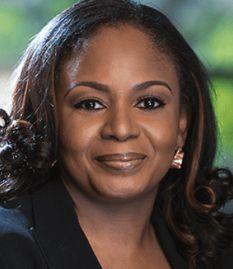
with answers, but with a shimmering question: what if she is right?
Whispers Around Udom and Eno
Political rumours travel in Nigeria like afternoon thunderstorms, sudden and full of noise. In Akwa Ibom, the latest storm whispers that Governor Umo Eno and his predecessor, Udom Emmanuel, no longer walk in step. The gossip has texture, but does it have truth?
Eno insists no. He repeats it like a refrain: Emmanuel is his political father, mentor, and steady hand in the background. Without him, he says, there would be no seat, no title, no chance to steer Akwa Ibom’s future. Gratitude is woven into every answer he gives.
The governor’s recent defection to the ruling All Progressives Congress (APC) ignited the chatter. Emmanuel, after all, is a loyal PDP man, and politics in Nigeria is rarely gentle about crossovers. Yet Eno waves off the drama. Politics, he argues, is dynamic. Decisions bend with the times.
More than once, he has drawn soft metaphors. A father may raise children, he says, but grown ones still choose their own paths. The point is almost biblical
in tone: respect does not demand permanent agreement. In his telling, there is no quarrel, only shifting duties.
The theatre continues offstage. At church anniversaries, at Lagos gatherings, the pair are seen together. Smiles. Warmth. Stories that sound like family. “I was in his house last week,” Eno told one audience, reminding them that distance is not the same as discord.
Still, perception is stubborn. To the public, a change of party feels like betrayal, no matter the explanations. Voters look for fracture lines, even when leaders insist the foundation is intact. Perhaps suspicion is its own kind of political oxygen.
So the whispers roll on. Maybe they fade tomorrow, maybe they deepen. For now, Eno is unshaken, Emmanuel is silent, and the people lean in, wondering whether this is harmony disguised as discord or discord dressed as harmony. Politics, after all, has a way of playing tricks.
Alwan Hassan: A Voice the North Cannot Ignore
The first thing about Alwan Hassan is not his thunder but his stillness. He speaks and the quiet stretches, as though the air itself leans closer. Then comes the voice: firm, precise, a call pitched to stir a weary North from its divisions.
On Channels Television, Hassan brushed aside the Arewa Consultative Forum with surgeon-like ease. “They are not for the North,” he said, reminding viewers that the true struggle is not roads or railways but the jagged fault lines of tribe and faith.
He insists the North needs no handouts. With 424 local governments and land as vast as the horizon, it carries its own wealth. What it lacks, he argues, is peace. “Unite us, and we will build our own schools, our own roads, our own future.”
Hassan’s words come gilded with experience. He began in banking, cut through the ranks of First Bank, and steered Bank PHB through a crisis as a Central Bank appointee.
Years in boardrooms have trained him to measure risk, weigh stakes, and wager on possibility.
Now he wagers on politics. Loyal to the APC and unabashedly so, he points to Tinubu’s policies: new cancer centres, student funds, and schools that pay stipends. “Who else will win in 2027?” he asks, daring rivals to prove their relevance.
But Hassan’s role is larger than a party soldier. As convener of the North-South Progressives Alliance, he brokers bridges where others see walls. “Technocrats must not hide from politics,” he insists, urging those with skill to bind themselves to vision.
What lingers after his speeches is resolve rather than rage. This is expected since he frames the North as an architect of things instead of a fractured victim. And if he has his way, history may recall him less as a politician than as a voice that turned silence into song.
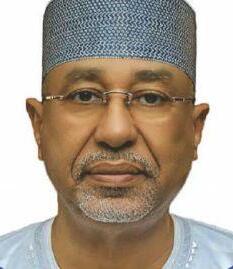
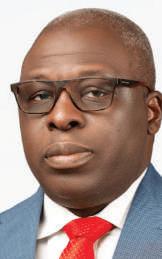
Adegbite’s New Drive to Transform Energy Sector
Nigeria’s energy sector is not a place for the faint-hearted. Pipelines twist like riddles, oilfields brood with history, and the air is thick with promises half-kept. Into this labyrinth walks Adegbite Falade, a man who seems to carry both a compass and a torch.
As Group Chief Executive of Aradel Holdings, Falade has turned routine into a renaissance. Gas once flared uselessly at Ogbele now powers homes and factories. A fresh supply agreement with NLNG, Shell Nigeria Gas, and NNPC Gas Marketing suggests something braver: a domestic market determined to stand on its own legs.
It feels almost like sleight of hand. One year, Aradel is a modest oil producer; the next, it is a fully integrated energy group reporting strong revenue growth on the Nigerian Exchange. Falade would insist that the trick is discipline, patience, and a little daring, three necessary elements for the kind of magic he’s performing.
And now, another role awaits.
Come September 2025, Falade would wear a new cap as the Independent Petroleum Producers Group (IPPG) Chairman. The IPPG, with members producing more than 700,000 barrels a day, is no minor club. For the first time, a non-founder will steer its powerful ship.
Industry elders, usually sparing with praise, have called his appointment a natural progression. Perhaps they remember how he listed Aradel on the stock exchange within four years, or how he balanced boardroom pragmatism with a knack for bold gambits. Either way, the gavel now rests in his hand.
Falade’s résumé is crowded with high stations: Oando, Oilserv, Shell. Degrees from Ibadan and Warwick. But what interests people most is not the chronology. It is the sense that he treats energy as more than a commodity. For him, it is the grammar of national possibility.
In a country where power outages still dictate daily rhythm, this belief feels urgent. Falade wagers that Nigeria’s energy story can be retold: less about waste, more about will. And if his compass proves true, the labyrinth may yet open into light.
Tinubu as a g ood Chief Marketing o fficer
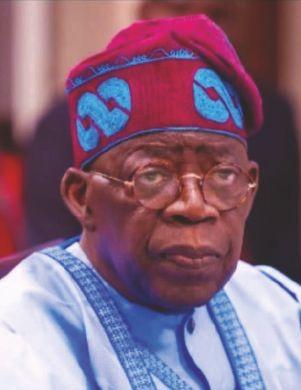
I don’t even know what to call this one. This one who used to carry green hair all over the place, opened his mouth the other day and annoyed all Nigerians. What the federal government cannot do in uniting Nigerians, Taribo with his wide mouth did it.
For the first time in a long while, this baba united Nigerians. All tribes, colours, sexual and religious affinities and even albinos all joined together to lambast and abuse the living daylight out of him for that stupefying tirade he made at Peter Rufai’s funeral.
Someone had pitied him and thrust a microphone to his face, and the next thing was vomit. Ohhh, Nigeria has failed ex-footballers, ohhh I cannot even allow my son play for Nigeria, ohhh Nigeria is such an ungrateful country, ohhh we gave our lives for the country Mbok, this huge sense of importance is what has always killed me. Let me state it here that Taribo is not alone o. This class of spoilt Nigerians all share these views o. All of them, from Kanu to Okocha, to Etim, who came out to lambast him, to Waheed,
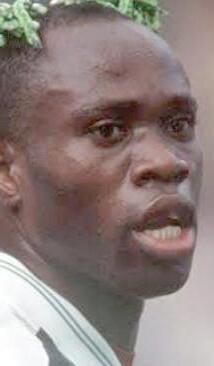
It seems I am beginning to like this oga. Our president, of late, has started showing small signs of statesmanship. The road is still far sha, but we have started seeing glimpses that our president will soon leave his shallow, ethnic biased roots and become an expansive, internationally-regarded statesman.
What I first saw was an attack on him for declaring in Brazil that his administration has put an end to corruption. I initially agreed because the situation in the country is dire in that regard, but after reading his speech and studying the reports, my mind changed.
Oga was just marketing, and in that regard, it was fair to paint a very positive light to intending and prospective investors.
Shebi it was Buhari that climbed an international stage, called us names and expected investors to come.
President Tinubu, being a “street boy” and understanding how marketing is done, went on stage and declared that
all of them, they all feel “rejected”, so Taribo was just echoing their thoughts, and as he ran into a Bee Hive, they dodged.
Mbok, what kind of yeye heroes are these ones, because they chase a round ball on the field for 90 minutes after which they get paid sums that 90% of Nigerians will never earn in their lifetimes, makes them heroes?
Did they win the World Cup, and even if they did, how does that bring down the price of garri?
It is no wonder that one soldier came out to ask the president some telling questions when that one got carried away and was dashing Falcons - their female equivalentshuge sums as against the harried welfare package paid soldiers who are dodging real-life bullets.
Mbok Taribo and his mates should not just annoy the true heroes of this nation with their childish overexpectations.
DApo AbIoDUN, pleASe DoN’T go
AHeAD
I remain horrified with recent news that, despite it all, Governor Dapo Abiodun may have gone ahead to seal up his rival Gbenga Daniel’s
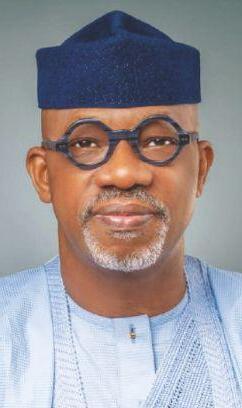
corruption is over. Me I agree with him o.
If we are looking for serious partnerships, then we must sell a positive story even though the story get as e be.
Abi, would he now be telling the Brazilians that – aghhhhh if you see the level of corruption in my country ehnnn, you will run, or kai, kai, kai, my country is fantastically corrupt, quoting that longnosed British Prime Minister who lost his job immediately after that statement?
No now, our President is the Chief Marketing Officer of the country, and as such, he must paint a brilliant picture to woo investors. He must stand boldly and proudly to proclaim the very positives of our land, and he must sell an engaging and enduring vision. This I believe is what he did on that podium in Brazil, and I support him.
Let us even get the investors’ back, when they get here, we will know what to do. Let’s even get to that bridge, but for now, kudos to our Chief Marketing Officer. Well done sir.
Hotel and homes in Sagamu in preparation for demolition. This is very confusing and sad for anyone, let alone a sitting governor, to allegedly go through this Hobbesian route for any purpose. Even if the man did not have all the necessary approvals or used his position then as a sitting governor to secure the assets, the timing of this particular exercise reeks of a very putrid, self-serving motive. Mbok, anybody who is close to Governor Abiodun should please just pull his ears and warn him about legacy and history. If all of these are true, then he is taking the whole thing too far, and I must say that if he goes ahead with the demolition as reported, history will not be kind to him.
You see, our leaders fall for such barbaric acts because they really do not have anything to appeal to the voters. If he had performed even averagely well, it will be his people that will be shouting for him, but now he has to allegedly resort to bulldozers and caterpillars to reportedly secure a senate seat. If it is true that this whole thing is on the back of a senatorial run, then as a sitting governor, he cannot
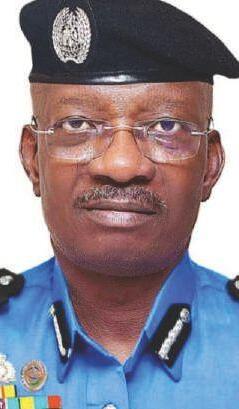
resort to bullying to win the seat over a senator who is usually ensconced in Abuja wearing long beads and flowing agbada.
But no, oga would rather just render his opponent homeless than appeal to the people for a fair assessment. Sad, the kind of leaders we parade. Really sad.
KAYoDe egbeToKUN vS oMoYele Sowore: wHo blINKS FIrST?
Except you have been hiding under a rock, you must have heard about the royal rumble between our historic Inspector General of Police, Mr. Egbetokun and our veteran crusader, Mr. Sowore.
Sowore has been telling the whole world that the IG’s tenure has expired, as such he is now “illegal IG.” In response and as a reward for his efforts, he gets hulled into different cells, gets his hand broken and thrown from one court to the other on different charges. I think the only charge that has not been thrown at him just yet is sodomy and adultery.
Let me let out one secret. I did not want to make it public because I don’t have the juju Sowore has to enter cell and enjoy it. You see,
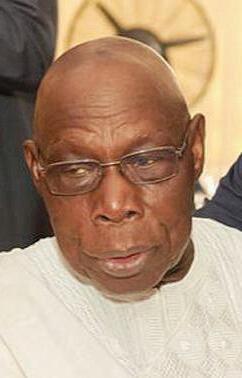
the fear of cells is the beginning of wisdom so I don’t do anything that will bring me and that place together.
Anyways, I have had Sowore on my WhatsApp for a while now and I have kept it a big secret before one police or DSS will now call me and ask me if I know where the man is hiding.
Anyway, we were chatting and he informed me that the IG had asked for a private meeting and that he was not going. I shouted “aghhh alagba, you should go na,” and he refused. I tried so much to convince him but he was adamant.
Now even Mandela met his traducers severally so why can’t Sowore meet his “paddy?” Well, Sowore refused, insisting that it is not his style.
I wish him luck on his crusade of getting the IG out of office and must say that I truly do respect him for his courage and eagerness to be entering cell every market day.
As for the IG, me just dey look you and wondering who your advisers are. Someone like Sowore have been entering cell from their mother’s womb and all these strong tactics will not work as the man truly believes that it is this cell thing that will continue to keep him relevant in the struggle and may be one day immortalise him as a true freedom fighter, so you are just fueling his ambitions.
My advice is for you to treat him the way we used to treat craw-craw in our “yansh” – ignore it because the more you scratch it, the more it will be itching you, so you just ignore it and resist the urge to scratch it no matter how badly you want to.
The more you scratch Sowore, the more he will be annoying and irritating you. In fact it has gotten to a point where, if you don’t arrest him in two weeks, he will just go to the main road and abuse your men and shout – illegal IG and you sef will predictably carry him. You just no sabi, I swear, they are using your head o Mr. IG. Make I run.
Before oBASANjo GoeS…
My daddy has been reported to have said that he doesn’t have time again and that he is in a hurry to see a better Nigeria before he goes. My take on this is that baba should just concentrate on his going because nothing seriously will change before his departure. If that is the one that he is waiting for then, Baba will pass Methuselah and IG will still be pursuing Sowore and you will still be settling at police station directly under the sign “bail is free.” Baba has tried, he has fought a civil war, struggled, jailed, almost killed for this Nigeria and instead of things getting better, they are getting worse. See that one that he was comparing Tinubu to Buhari and one “fish underling” who calls himself APC spokesman for Lagos started “abusing” baba. That is what you get with APC, they never address the issues but instead be attacking personalities. This upstart takes on Chief Obasanjo who cannot by any standard be on the same level as his forbear. Instead to address the issue of “Buhari’s incompetence” that Obasanjo had levelled on Tinubu, he goes on a rant abusing Obasanjo.
This is why, I think that baba should now retire from public commentary like he did with partisan politics so that all these “garage boys” who parade themselves around power in a
hypnotic, sycophantic fit will not continue to attempt throwing mud at him
For the vast majority of Nigerians nay Africans, Chief Olusegun Obasanjo remains a huge symbol of true passionate leadership. A man with vast international respect and a man who has served Nigeria more than any other pretender who has forced himself on us.
Baba, let’s rest, Nigeria is not going to reform anytime soon, let’s just relax. Thank you, sir.
BAlTASAr eNGoNGA: IN THe
TwIlIGHT zoNe
Baltasar is the man from Equatorial
Guinea who slept with almost all top government officials’ wives. From reports, only the country’s first lady escaped his marauding manhood – that one sef, maybe na age or she is not living in the country. From the vice president to almost all cabinet members down to the police, army, the man just scattered everywhere. He not only “knacked” them, he even filmed himself doing it. Me, I loved watching those videos o. I watched the thing and even categorised them – fair-skinned, dark-skinned, tall, short, fat and slim. I devoured it like I was preparing for exams o.
leT AzUKA oGUjIUBA BreATHe
Still on the matter of unnecessary police harassment, let me quickly push my sister Azuka Ogujiuba’s matter to the forefront.
For those of you who don’t know, Azuka is a powerful media personality, a veteran columnist and very influential personality. Let me even say it here, that it is Azuka who gave me my break as a columnist. She is the one that took me to THISDAY and told Shaka Momodu, the then Editor of Saturday THISDAY – Shaka this boy fit write.
So, it is now this Azuka that is being thrown in and out of police cells for doing her job. According to her, she published a press release on a matter that was released on the back of a court order –Edgar, no be only me report am o but na me dem invite, carry police surround house wey I stay for Abuja, come carry me like terrorist.”
It is fitting that an international
press organisation has released a strongly worded statement on the matter and this is me also adding my own voice. You guys can carry all the journalists in this Nigeria, me I don’t care o but don’t touch my Azuka o. That is when you people will see my red eye ooo. Don’t touch my Azuka o, aghhhhhhhhh, I will fight o and you people don’t want to see my red eye ooo.
I will just tear my shirt, tie a red bandanna and remove my clothes and stand stark naked in front of your headquarters and you know the implication of that on police women in this country.
This is the last warning that I am sending out o. If you don’t release Azuka immediately ehnnnn (kai, Editor just mentioned that she has been released) God save una I swear, otherwise…
But seriously, can’t we just even follow due process on a matter like this? Kai, Nigeria.

What I liked the most was the way he treated the women. He was so gentle and romantic with them. He moved them carefully, kissed them passionately, held them lightly, whispered nice words and after it all would peck them, hug them and just make them feel wonderful. Kai, imagine if he was Nigerian, I would have unleashed him on APC during election and we would have been saved from this wahala we find ourselves.
Anyway, the news on the airwaves is that he has been finally sentenced to eight years imprisonment for corruption and mishandling of funds. I just pray that there are no female warders, because the man will scatter them too.
He remains my hero and I cannot even wait for him to come out and probably write a book so that we, his proteges, can learn some more tricks. Kai, the stamina ooooo. No be tiger nut be that o.
KemI BADeNocH: meNTAl HeAlTH IN VIew
It is not impossible that this one has a mental health issue o. First, you say you are not Nigerian because the police stole your brother’s shoe and they bullied you in Shagamu and because of that you are now an Essex girl and more British than Prince William. Good for you. Now you have come out again to say that they are doing racism with you o. That you are facing ethnic bigotry, amongst others. If you ask me, I will say that this is a pure case of identity crises. Mummy don confuse and this is not a case for an upscale psychiatric ward in the UK, it is a clear case for Yaba left where they will use “atori” to flog the sense into her head.
I even pity her when the inevitable happens – loses her position, where will she run to? Will she run to Essex people and say hide me or run to Remi Tinubu and say please I was misquoted, hide me?
When person carry palm oil and rub herself and dances close to flames, the inevitable happens and she will have herself to blame.
This one cannot be British Prime Minister o, she will just come and attack Nigeria o.
A DIffereNT KIND of moNArcH IN oBA joSepH oloYeDe Kabiyesi ooooooo!!!!!! This one has carried his own monarchy into jail and we have not heard anything about dethronement from his people. He has been jailed according to reports for four years for COVID-19 scam. Apart from the jail term, it has also been reported that upon his release, he would have a supervised release for another three years. He has lost his assets and a lot of cash was also seized.
This is the continued tragedy where we now have fish head leaders. From the top to almost bottom, you have leaders with blighted pasts and that is why you are seeing bulldozers instead of debates as campaign instruments. This kabiyesi has gone to disgrace his culture, his people and Nigeria by going down so low to do this and I think the government should come out very strongly with a statement, saying that they support the ruling and also sending a strong warning that they will not support or condone any Nigerian out there damaging our reputation – that is if guilty conscience will allow them.
Anyways, this kabiyesi has carried his crown and beads into jail and I truly do wish him well.
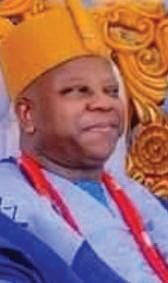
Oba Oloyede Begins His Journey to prison
This story of Oba Joseph Oloyede would make an interesting read if written into a book by a good writer. In the hands of a skilled filmmaker, it would make box office success.
This is a man who, a few years ago, was strutting around like the cat that got the cream in his hometown in Ipetumodu, Osun State. Every morning in his residence, drummers assembled while chanters delivered his panegyric. He was highly revered by his subjects, not only because he was the Apetu of Ipetumodo, but he was a very generous man. Many benefited from his benevolence, but little did they know that behind his munificence was a man whose fraudulence oozes all around.
His pastimes were pulling the wool over people’s eyes. They were not aware that they had handed the ‘treasury’ of their town to an irredeemable swindler and a shark.
Perhaps if Oloyede had known that the law was about to catch up with him, he would not have made that trip back to the US. But like the saying in America ‘’If you can’t do the time, don’t do the crime.’’
The monarch last Tuesday finally commenced his journey from royalty to a US prison as he was sentenced to more than four years in prison by District Judge Christopher A. Boyko.
According to the U.S. Attorney’s Office for the Northern District of Ohio, the monarch was also ordered to “serve three years of supervised release after imprisonment and pay $4,408,543.38 in restitution.”
He also forfeited his Medina home on Foote Road, which he had acquired with proceeds of the scheme, and an additional $96,006.89 in fraud proceeds investigators had seized.
While it is not certain how long it would take the kingmakers in the ancient town of Ipetumodu to search for his successor, it’s undeniable that Oloyede is not coming back to the stool even after serving his jail term.
Shocking Revelations in Late Edwin Clark’s Will to Wives
The late renowned Ijaw leader and elder statesman, Edwin Clark, was a lawyer and politician. He worked with the administrations of Samuel Ogbemudia, a former military governor, and Gen. Yakubu Gowon, a former Head of State, between 1966 and 1975.
Until his death in February 2025 at the ripe age of 97, Clark, who founded Edwin Clark University in 2015, was a strong voice for the emancipation of the oppressed and the Niger Delta, where he hailed from.
Although many viewed the late Clark as controversial, those who knew him well and worked closely with him maintained that he was a no-nonsense man who would not remain silent in the face of tyranny, to paraphrase the words of Nobel laureate Prof. Wole Soyinka.
For some inexplicable reasons, however, talks about him being controversial have again been gaining traction, especially after the details of his Will surfaced recently.
In the Will sighted by Society Watch, the deceased left behind billions of naira in several banks, and properties scattered all over the country. However, Clark reportedly deliberately left his three wives in the cold, as they are not included among the beneficiaries of his vast estate in the Will prepared in October 2022.
Reading the Will titled “The Last Will and Testament of Chief (Dr.) Edwin Kiagbodo Clark” to family members in June 2025, M. A. Akujobi (Miss) of M. A. Akujobi & Co., Head of Chambers, Legal Practitioners, Effurun/Warri, Delta State, stated that Mrs. Elizabeth Kofo Clark, Mrs. Theresa Clark and Abisola Sodipo-Clark
shall not be beneficiaries.
The reason, it is stated in the Will, is simply because they had been “constructively” divorced and did not live with him for a long time before his death - he had reportedly sent them away when he discovered that “they were no longer useful to him.”
It was also revealed that the late Clark appointed Dr. C. C. Clark, Mrs. Koshare ClarkOmoudoye, Prof. Victor Esekumemu Clark, and Barr. Andrew A. Bekederemo, all of the late Chief Bekederemo-Ogein family of Kiagbodo Town in the Burutu Local Government Area of Delta State, Nigeria, to be the Executors of the Will.
Their duties and assignments, according to the Will, shall be funded from and by the proceeds of his estate.
In the Will, it is stated that the beneficiaries shall be his 15 children.
The late Clark also directed that all his nephews and nieces, who are presently benefitting from him, either by way of funding their education, employment, or otherwise, will continue to enjoy such benefits from his estate, if they are still alive until they complete their tertiary education; and those in employment or any other position shall live on their own or those who have been removed due to dishonest practice or through reasons that may be given or decided by the Executors.
He directed that his “property, building and/or residence in Kiagbodo and/or every other building owned by him or identified by him and/or others to be his should be treated as a family house where all his children shall have access to and take abode whenever they
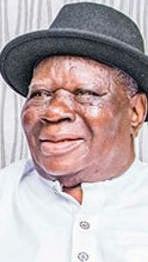
visit Kiagbodo.”
However, he inserted a caveat to the effect that “a child who neglects, refuses, fails and or omits to visit Kiagbodo consecutively in three years will/shall forfeit his/her right to the benefits accruing and accruable to such a child from his estate/property wherever such property may be situate for a period of three years and/or until he/she fulfils my wish as above herein stated/directed, excepting such beneficiaries resident outside Nigeria.”
Tunji Bello: True Definition of a Selfless p ublic Servant
Who will sell his house to build an auditorium for a public university? Who would have been that selfless but a man who sees that your wealth is not meant for you alone, but also for your immediate environment? Someone who believes the famous quotes of the late American Catholic religious sister, Mary Rose McGhie, who says, “There is no greater joy, nor greater reward than to make a fundamental difference in someone’s life.”
When he turned 60 in 2021, Tunji Bello pledged to the management and students of the Lagos State University (LASU) to donate to the school a worldclass auditorium, not just a hall but an architectural masterpiece that would make many green with envy.
To achieve this, he rallied friends, converted birthday gifts into donations, but the dream to execute the project was threatened by a lack of funds. The former Lagos commissioner did what many would think twice before doing; he sacrificed his multimillion-naira property for the purpose

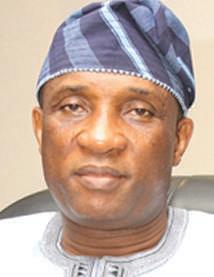
in the
Last week, the auditorium was inaugurated at the Epe Campus of the university.
Tunji Bello’s life is a study in purposeful evolution. A journalist, lawyer, environmentalist, and public servant, he has worn many hats - but always with the same thread of integrity. From his early days at Concord Press to his tenure as Lagos State Commissioner for Environment, and now as Executive Vice Chairman of the Federal Competition and Consumer Protection Commission (FCCPC), Bello has consistently stood on the side of the public interest.
At FCCPC, he has taken on digital loan sharks, price gougers, and monopolistic cartels with the same fervour he brought to LASU. His mantra is clear: governance must protect the vulnerable, and leadership must be anchored in empathy. Under his watch, FCCPC has become a bulwark against economic feudalism, ensuring that consumers are not crushed under the weight of exploitative practices.
Air p eace Boss, Allen Onyema’s Ingenuity
Air Peace boss, Allen Onyema, is usually driven by an abiding quest to change the lives of his compatriots for the better. No one would tar him with the brush of a wheeler-dealer in his day-to-day business activities.
The aviation top guru has established himself as a businessman of note who holds a special place among the class of businessmen in Africa; he is blessed with unequalled business wisdom and ingenuity to see opportunities where others see nothing. This, among other things, has set him far apart from many ordinary business magnates across the continent of Africa.
He has proven himself as formidable in the sector and left his imprint wherever he finds himself, placing himself atop the pecking order in Nigeria’s aviation industry.
The Anambra State-born, known for scoring many firsts, is ready to score yet another first.
Onyema, last Tuesday, hinted that Air Peace airline has secured approval to commence direct passenger flights
between Lagos and São Paulo under the Bilateral Air Services Agreement (BASA) signed between Nigeria and Brazil.
The agreement was concluded in Brasília on Monday by Nigeria’s Minister of Aviation and Aerospace Development, Festus Keyamo, and Brazil’s Minister of Ports and Airports, Silvio Filhos, in the presence of Presidents Bola Tinubu and Luiz Inácio Lula da Silva.
Onyema described the Lagos–São Paulo route as “long overdue” and a significant boost for Nigeria’s aviation sector. He stated that the airline would start with three weekly flights, with plans to increase frequency as demand and operational conditions allow.
The service, scheduled, he added, will begin by late November 2025, and will mark the first direct connection between both countries by a Nigerian carrier.
A publicAtion

At the Crossroads of The Road Not Taken… Every Step a Seed
In a bold reimagining of Robert Frost's iconic poem, kemi Bonuola's stage adaptation for The Rays drama group transplants the poet's wry exploration of human choice into a Nigerian context, where the stakes are higher, the choices more fraught, and the consequences inexorable. okechukwu Uwaezuoke writes
Rarely has a poem been so gloriously misunderstood as Robert Frost’s “The Road Not Taken”—commandeered, albeit with the best of intentions, by the rugged-individualism brigade for more than a century, and in the process saddled with a kind of notoriety all its own. For all the chest-thumping about blazing solitary trails, the poem is, in truth, about something subtler: how human beings, with a sly grin or solemn sigh, spin their choices into grand narratives of destiny. Frost himself purportedly chuckled at this habit—the typical human tendency to gild its decisions in hindsight as though they had always been inevitable. And irony, that most mischievous of muses, is woven into the fabric of the poem.
At its core the poem’s origins lie not in a solitary epiphany but in Frost’s gentle ribbing of his friend Edward Thomas, who could turn a simple country walk into an exegesis on indecision. Thomas’s dithering amused Frost, who immortalised it in verse. That famous final line—“I took the one less travelled by, and that has made all the difference”—is less a trumpet call for trailblazers and more a sly wink at this humanity’s urge to rationalise. This tension—between Frost’s playful jest and the world’s appetite for solemn clarity—would, decades later, germinate into fertile soil for the stage.
Yielding to the power of adaptation, this very tension animates Kemi Bonuola’s bold adaptation of the poem (with the same title) for The Rays drama group. Directed by Patrick Akhidenor and staged at the rooftop pavilion of the Lekki Grail Centre on Sunday, August 17, the production plants Frost’s jest in Nigerian soil—and harvests something altogether more poignant. Bonuola’s play refuses to equivocate. Where Frost winks at mankind’s foibles, she insists on accountability. The poem’s leafy fork becomes a moral crossroads, its tranquil New England woods yielding to a nondescript Nigerian clearing, humming with songs, quarrels, laughter, and prayers.
Structured as a sequence of tableaux vivants, the play unfolds through a series of moments that lift the veil on the characters’ inner lives, each tinged with the air of a parable. A young couple, Chijioke and Chidinma (Edikan Abia and Tolulola Akintoye), cradle a child (Asgard Oparah) as they debate the future—not just their own but their child’s inheritance. Two friends,
Adetola and Olubunmi (Jeff Joseph and Sami Akhidenor), jest their way toward parting, one down the narrow gate, the other toward the broad easy road. Sisters Love, Faith, and Joy (Tobiloba Olajide, Ozioma Akhidenor, and Praise Okoro) squabble in a scene pitched between Nollywood sitcom and Greek chorus before their quarrel sharpens: can kinship survive divergent roads? And in Ebuka (Onyebuchi Ojiyi), who sings nursery rhymes to stall his decision, the audience sees its own childish yearning—that destiny might relieve humanity of responsibility.
The emotional tempo shifts deftly: intermittent laughter at Temisan and Daniel (Sandra Alumona and Daniel Oparah), who squabble over a tablecloth as they split futures; sombre silence at Tolani (Uzunwa Osarenren), staggering under “a lifetime of bad choices” before turning back in despair. Bonuola doesn’t flatter the audience with illusions. Some choices are careless, some cowardly, some postponed into paralysis. Beneath the shifting tones lies one constant undertone: a bass note of consequences.
That undertone resounds all the louder when the epilogist Evaristus Okeakpu reveals Bonuola’s inspiration: In the Light of Truth: The Grail Message by Ab-ru-shin. If Frost’s wood was a place for sighing pilgrims, Bonuola’s clearing is a stage for eternal laws—the Law of Sowing and Reaping, of Attraction of Homogeneous Species, of Spiritual Gravitation. Theatre becomes catechesis; drama becomes rite.
At times, the production openly courts ceremonial ritual. The chorus intones “either/or” like an incantation. Crescendos feel less like background music than summons. In the closing tableau, as the cast chant Frost’s lines before swelling into the hymn “Courage, brother! Do not stumble”, the rooftop pavilion transfigures into a sanctuary. One leaves less with the memory of a performance than the aftertaste of a rite.
That this stern clarity may jar the sensibilities of less receptive contemporary audiences should surprise no one. Indeed, in a modern age accustomed to ironic ambiguity and endless deferment of meaning, Bonuola’s worldview can feel almost startlingly uncompromising. But in the sense of the Grail Message, clarity is not naivety; it is truth. Choices bear fruit—sweet or bitter—and humanity is accountable. Yes, the risk of didacticism hovers, but the cast breathe life into doctrine: Abia’s gravity, Akintoye’s tender apprehension, Ozioma Akhidenor’s
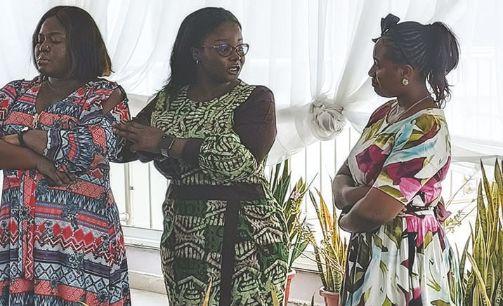
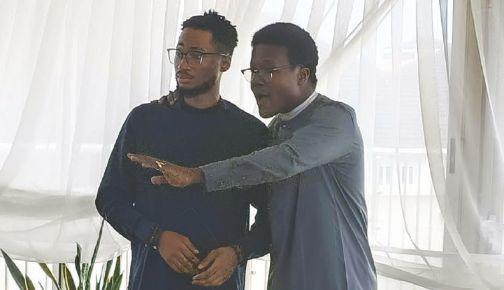
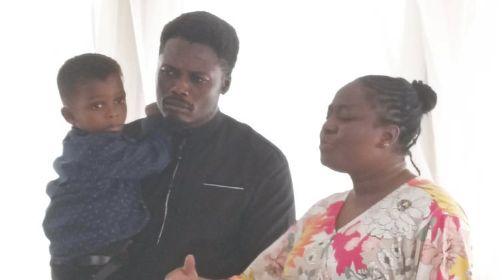
passionate intensity, Ojiyi’s comic dithering. Teaching becomes theatre, theatre becomes introspection, introspection potentially transitions to revelation.
Frost may have teased that the difference was “all the difference” only in hindsight. Bonuola, guided by the Grail Message, insists
the difference is real—immense, eternal. At this Nigerian crossroads, there are no trivial choices. Each road is a sowing, each step a seed. As the play gently underscores, the audience is not a mere spectator; they, too, stand at the crossroads, their own roads branching before them.
The Endangered Art of Becoming What We Attend To
The other day, while taking a slow stroll around the parking area of my house, I stopped by the hedge that lines it. The sun was filtering through the leaves, and I found myself absorbed in the play of light and shadow. Some leaves shined with a tender, almost translucent green, while others had darker tones. The hedge was nothing remarkable, something I usually walked past without thought, but that day its greens seemed to shift endlessly, as if the plant had a hundred hidden shades I had never noticed before. Simply standing there, letting the little differences in light and shade hold my attention, felt like being handed something unexpected and generous. Standing before that hedge, I thought of the importance of giving attention.
I had read a few days earlier something that Simone Weil (1909-1943), the French philosopher and activist once wrote: "attention is the rarest and purest form of generosity." Initially, this association came as a surprise. But I began to understand how the deliberate practice of attention can be an act of generosity. Most of the time when we hear 'generosity,' we think of giving things away: money, belongings, time, help. Yet there is another kind of giving: simply paying attention, staying with something long enough that it matters more
DISCOURSE
than our distractions. Attention is relevant for all aspects of life, but looking for more ideas on the practice of attention and how this applies to the arts, I came across Iris Murdoch's book The Sovereignty of Good. Murdoch (1919-1999), both a novelist and a philosopher, sees attention as central to how we grow and change as people. She points out how our natural tendency is to perceive the world through the distortions of self: our fantasies, self-interest, and projections. Reading her, I began to see that attention is less about straining to focus and more about slowly letting the world show itself as it really is.
Murdoch brings the idea of "unselfing." True perception is hard because the ego is always in the way, colouring what we see. What can break this circle is patient, receptive looking. In other words, attention. To pay attention rightly is to step out of the circle of the self and let the reality of another, whether a person or a hedge of sunlit leaves, stand before us without being reduced to our categories. In The Sovereignty of Good, she writes that beauty, especially natural beauty, draws us beyond ourselves. In such moments of genuine attention, we do not shrink but expand. But what strikes me most about Murdoch is how she argues that art can sharpen our capacity for attention. A painting, a sculpture, a piece of music asks us to be

still and wait, and then be ready to receive. I am increasingly convinced that to contemplate art is not simply to "look at" something, but to practice a far deeper way of seeing. By becoming a school of perception, art can do more than decorate or entertain. A serious work of art does not give itself up at once. It resists being consumed or reduced; instead, it asks for time and attention. This is why art also sharpens our ability to attend to life. Not
because it preaches moral lessons, but because it teaches us to look without the self rushing in. When we read a novel well, we enter another's life with patience and openness.
read full Article online - www.thisdaylive.com
13 Masters Honour Yusuf Grillo Memory with
One Show
Art enthusiasts flocked to the Yusuf Grillo Museum in Ikeja, Lagos on SaturdayAugust 23 to commemorate the late artist’s legacy with the 4th edition of a tribute exhibition, held on the second anniversary of his passing. Grillo, who passed away on August 23, 2021, at the age of 86, was a renowned Nigerian contemporary painter, muralist, and sculptor, widely regarded as one of Nigeria’s most outstanding academically trained painters. As a founding President of the Society of Nigerian Artists (SNA), Grillo also served as Head of the Department of Art and Printing at Yaba College of Technology, where he taught for over 25 years. The exhibition drew throngs of visitors and artists paying tribute to the artist’s enduring legacy.
This exhibition, titled Lineage of Masters, brings together 13 art masters who were largely influenced by Grillo’s artistic philosophy and studio practice. Among the featured artists are Olusegun Adejumo, who celebrates the beauty and elegance of women through vibrant brush strokes; KunleAdeyemi, who incorporates native motifs into his printmaking; Ato Arinze, who creates minimalist sculptures in fired clay; and Duke Asidere, who showcases stylised figurative captures in painting. There is also Adeola Balogun, who showcases his technical skill with metalwork in his striking busts and Samuel Ebohon,
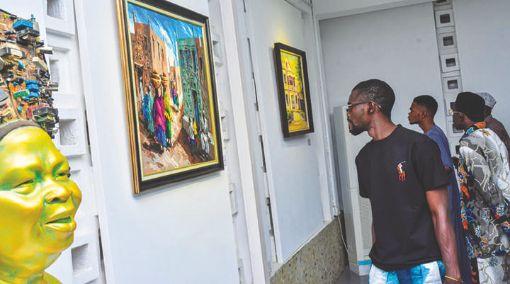
who delights with his intricate drawings. Then, Lara Ige-Jacks presents streetscapes that reflect Grillo’s influence, and Nigerian-Irish artist Ben Nwosa engages the audience with his minimalist abstract paintings.Also, Edosa Ogiugo features impressionist textures in figurative forms, and Lekan Onabanjo’s
watercolour paintings evoke the senses. Finally, Odun Orimolade unleashes vibrant colours in her fantastical paintings, Sam Ovraiti reinterprets old masterpieces to offer fresh perspectives, and Kehinde Sanwo’s visual celebrations of architectural history shine through his pieces. The exhibition showcases the diverse range of artistic styles and influences that Grillo’s legacy has inspired.
The exhibition provides a unique opportunity for art enthusiasts and researchers to appreciate
Timeless Lessons from a Young Cast
Recently, the National Theatre, in collaboration with Story Theatre, brought youthful energy and moral reflection to the stage with I Wish, I Wish, a Broadway-style children’s musical directed by Bola Edward, fondly known as Grandma Wura.
Staged onAugust 22 and 23 at Terra Kulture, Lagos, the two-day production was a sell-out, drawing audiences into a world of masks, costumes, and spirited performances by children aged 8 to 16. The show blended music, dance, and humour with an underlying moral depth that resonated with both children and adults.
The narrative, framed by Grandma Wura’s storytelling, follows Nkechi, a city girl weary of holiday chores in her grandmother’s village. In a fit of frustration, she wishes to become an ant—only to discover that even the smallest creatures face hard work, responsibility, and sacrifice.
With its vibrant staging and youthful cast, I Wish, I Wish proved that children’s theatre can be as entertaining as it is instructive, reminding audiences that the simplest stories often carry the weightiest truths.
Set across a classroom, the city, and a traditional Igbo village, I Wish, I Wish combined vivid costumes, sound effects, and choreography to tell a story about teamwork, love, service, and the dignity of hard work—values embodied by the ant colony.
“Be careful what you wish for, because the wind of wishes might just be around the corner to grant it,” warned Grandma Wura at the close of the performance, linking the ants’ spirit of cooperation to the unity Nigerians need for nation-building.
National Theatre CEO Tola Akerele, who championed the summer programme, praised the collaboration as part of efforts to nurture young talent. “This summer at the National Theatre, I had the privilege of championing our younger
voices through the Children’s Summer Camp in partnership with Proud African Roots,” she said. “Across music, dance, drama, and storytelling, the children reminded us why the arts matter because they give space for imagination, confidence, and community to grow.”
According to Akerele, the children underwent 19 days of intensive training in acting, singing, and dancing before the play. “They came in timid, some with little skill. But what they delivered in less than three weeks is remarkable. Beyond theatre, they gained discipline, teamwork, and leadership skills. This is what excites me most.”
She described Grandma Wura as an excellent collaborator whose passion for children’s theatre made the production outstanding. “The National Theatre is going to be a beacon of light for the youth. Nigeria is a youthful nation, and we must be youth-focused if we want to secure the future of our creative economy,” Akerele said.
Grillo’s influence on contemporary Nigerian art. By exploring the works of these artists, visitors can gain a deeper understanding of Grillo’s artistic philosophy and how it continues to shape the art world. Grillo’s daughter and Executive Director of Grillo Art Limited, Morayo Anthonio, emphasised the need for the show in a brief conversation during the exhibition’s opening on Saturday, August 23. In her view, the show preserves Grillo’s legacy and extends the cross-generational appeal of his philosophy. “Like I said before he died, we took him for granted,” she said. “We – his family members – didn’t really know how much of him he gave out to the art community. It is after he had gone that we were marveling and we didn’t know that when he was alive.
“He was a very private person. Not one to blow his own trumpet. Everywhere we go and we drop his name, there is so much respect.”
Aside from the exhibition, the gallery is open to the public on a daily basis with a resource centre for art scholars and researchers to access books and other publications on art. This commitment to art education and research is echoed in the sentiments of Dr. Adeola Balogun, a former Head of Department of Fine Art at the Yaba College of Technology, who reflects on the valuable lessons he learned from Grillo as his mentor. “He was already retired by the time I gained admission to the Yabatech. I never met him as a teacher. I met him through his students who taught me. I had the opportunity to visit him and through that, I would say that I was taught by him but not in the classroom.”
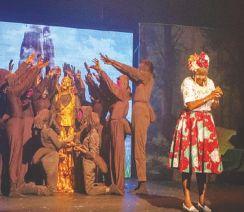
Akerele also hailed Grandma Wura as an inspired collaborator and reaffirmed the National Theatre’s commitment to youth development. “Nigeria is a youthful nation, and we must be youth-focused if we want to secure the future of our creative economy,” she added.
For the young cast, the cheers were both a reward and recognition of their growing place in Nigeria’s creative space. For the audience, I Wish, I Wish was more than entertainment—it was a reminder of the power of the arts to inspire hope, discipline, and cooperation.
IN THE ARENA
Questionable Pay Rise for Political Office Holders
The recent proposal by the Revenue Mobilisation, Allocation and Fiscal Commission to raise the salaries of political office holders at a time when Nigerians are being urged to endure harsh economic realities triggered by government’s policies has sparked widespread outrage across the country, Davidson Iriekpen writes
Negative reactions have continued to trail the recent proposal by the Revenue Mobilisation, Allocation and Fiscal Commission (RMAFC) to increase the salaries of political office holders.
Various labour unions, opposition parties, senior lawyers, and civil society groups have all condemned the proposal, describing it as an act of insensitivity by the federal government towards the country’s productive working class.
The Chairman of RMAFC, Mohammed Shehu, had at a recent retreat in Kano, revealed plans to increase the wages of President Bola Tinubu and other political office holders.
He described the N1.5 million current monthly salary of the president as grossly inadequate and unrealistic, given the prevailing economic situation in the country.
According to him, it is unacceptable that the salary of the governor of the Central Bank of Nigeria (CBN) is 10 times higher than that of the president. He further argued that the present salaries of political officer holders have remained unchanged since 2008.
The RMAFC boss urged Nigerians to support the commission’s plan to create reasonable living salaries for the president, ministers and directors general of agencies.
“You cannot pay a minister less than N1million per month since 2008 and expect him to put in his best without necessarily being involved in some other things. You pay either a CBN governor or the deputy governor 10 times more than you pay the president. That is just not right. Or you pay him (the head of an agency) 20 times higher than the Attorney-General of the Federation. That is absolutely not right,” he argued.
The proposed pay hike will also benefit state governors who are already overseeing the treasuries of their states. Other beneficiaries of the wage increase include senators and other legislators.
The exercise will include a review of the extant revenue-sharing formula among the three tiers of government. The current sharing formula, which has been in place since 1992, allocates 52.68 per cent to the federal government, 26.72 per cent to the states, and 20.60 per cent to local governments.
The proposal, which came at a time when many Nigerians are demanding a reduction in the cost of governance, sparked outrage from critics who described it as provocative.
The country is currently experiencing its
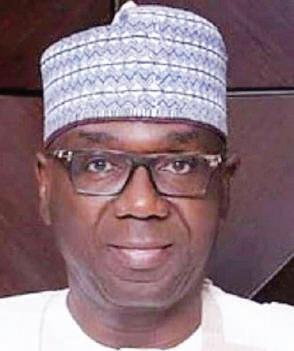
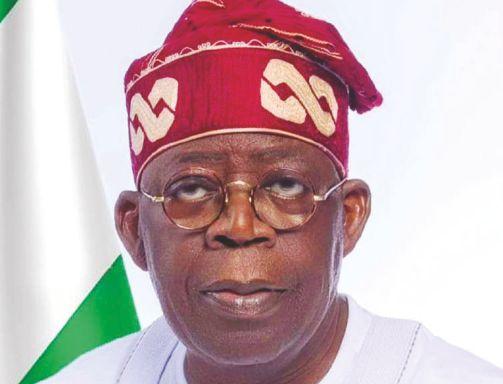
worst cost-of-living crisis in decades, with food inflation reported to be very high.
Opposition politicians and other stakeholders, including the Nigeria Labour Congress (NLC) and other unions, were enraged by his comment and had vehemently vowed to resist it.
When he assumed office in May 2023, President Bola Tinubu removed the fuel subsidy and floated the exchange rate — policies that have driven inflation to record highs.
As a result, many companies have shut down, while those still in operation are struggling to survive. At the same time, citizens are grappling with soaring electricity tariffs, and several employers have yet to implement the new national minimum wage of N70,000.
In countries where their leaders are sensitive, they receive pay cuts when the economic situation is difficult in order to identify with the suffering masses.
The Republic of Ireland for instance, had slashed ministerial salaries by 10 per cent during the 2008 financial crisis in that country.
During the COVID-19 pandemic in 2020, the then Prime Minister of New Zealand, Jacinda Ardern, and her cabinet cut their salaries by 20 per cent.
In the case of Nigeria, political office holders
p
rather revel in profligacy in times of economic hardship. The president and governors cruise across the globe in new presidential and private jets while their convoys boast of exotic vehicles.
Billions of naira were spent to renovate the presidential villa and Dodan Barracks for the president. In 2024, the vice president was handed over a new residence worth N21 billion.
This is why critics have advised that instead of increasing the wages of political office holders, the wages of Nigerian workers in private and public sectors should be significantly enhanced because they are the ones bearing the brunt of the harsh economic policies of the government.
A recent report by the Cadre Harmonisé Food and Nutrition Insecurity Analysis, led by the federal government, with support from the Food and Agriculture Organisation (FAO), the World Food Programme (WFP), and other partners, projected that 33.1 million Nigerians would face high levels of food insecurity during the June–August 2025 lean season. This totals 34.7 million, the number of Nigerians at risk of hunger.
In July, a former Minister of State for Budget and National Planning in the Muhammadu Buhari’s administration, Clem Agba, had reiterated the validity of the multidimensional poverty
OLITICAL
NOT e S
survey he commissioned while in office, which put the population figure of multidimensionally poor Nigerians at 133 million, saying that the situation has not improved.
Also, analysts argued that the pay rise for political office holders at a time when President Tinubu urged Nigerians to endure the current economic challenges brought about by government’s policies is the height of insensitivity.
Unfortunately, the wage increase is being proposed when Nigerian federal lawmakers are reportedly earning the most stupendous allowances in Africa with an alleged monthly emolument of N21 million.
In 2024, former President Olusegun Obasanjo accused members of the National Assembly of fixing their salaries.
Many Nigerians are surprised that the RMAFC overlooked the hidden allowances and benefits enjoyed by public officers, which are more than their salaries.
Unofficially, the Nigerian president is estimated to earn over N100 million monthly, with governors and other top officials also enjoying financial privileges at public expense.
Their cars are fuelled by the state; they travel abroad for medical treatment funded by taxpayers, and many benefit from security votes, and inflated contracts awarded to their cronies. Upon leaving office, several governors transition to the Senate, where they collect jumbo salaries and allowances in addition to life pensions running into hundreds of millions of naira from their states.
It is ironic that the workers who really should earn more, are currently earning less while those who should earn less, are earning more.
The members of the Academic Staff Union of Universities (ASUU) are currently mobilising for strike over poor welfare and some other issues.
The National Association of Resident Doctors (NARD) and the Nigerian Medical Association (NMA) just returned to work. Recently, 25,000 nurses under the auspices of the National Association of Nigerian Nurses and Midwives embarked on a seven-day warning strike over welfare issues.
With the condemnations that have characterised the proposal, it will only be reasonable and just for the federal government to respond to the genuine concerns raised and halt the unpopular move in order not to further widen the gap between civil servants and political office holders.
Kwara Needs More of Abdulrazaq’s Attention
The stories emanating from Kwara State lately are depressing. Many communities, especially in Kwara South senatorial district, have been deserted by residents due to incessant bandits’ attacks.
The situation is made worse by the emergence of a new terrorist group, Mahmuda, which has been terrorising communities in the state, killing, maiming and raping residents.
Recently, residents of Lafiagi in Edu Local Government Area (LGA) of the state took to the streets to protest against what they described as the worsening insecurity in their communities. They lamented that they had been faced with repeated cases of kidnapping and killings.
The protest was triggered by persistent
attacks and a lack of effective response from local and state authorities.
The protesters, predominantly youths from the area, voiced frustration over what they termed as government’s inaction in the face of continued violence.
Lafiagi and neighbouring communities have experienced several abductions in recent weeks, with multiple residents still being held captive.
Families of the victims have reportedly paid substantial ransoms to secure the release of their loved ones.
The protesters were seen in a video clip chanting solidarity songs and waving placards, demanding urgent intervention to curb the bloodshed and abductions disrupting daily
activities.
There was a report that the group recently warned residents of Duruma village in Baruten LGA of an impending violent attack and it was carried out effortlessly.
The state governor, Governor AbdulRahaman AbdulRazaq, is the Chairman of the Nigeria Governors’ Forum (NGF). He is accused by the opposition elements in the state of always travelling to Abuja, to attend presidential events or that of the NGF, while his state is burning.
Residents of the state believe that these attacks can only be contained when the governor stays at home and strategises with security agencies and vigilante groups to deal with the situation.
BRIEFING NOTES
2027: Will Jonathan Succumb to PDP’s Pressure?
As the agents of the Peoples Democratic Party mount pressure on former President Goodluck Jonathan to contest the 2027 presidential election on the party’s platform, will the former president trust those that allegedly betrayed him in 2015 and throw his hat in the ring? ejiofor Alike asks
With the allegations and counter allegations of betrayals that trailed the defeat of former President Goodluck Jonathan by the late President Muhammadu Buhari in the 2015 presidential election, Nigerians are anxiously waiting for the former president’s formal response to the invitation by the agents of the Peoples Democratic Party (PDP) for him to vie for the ticket of the party and run for the presidency in the 2027 general election.
A chieftain of the PDP and Senate Minority Leader, Senator Abba Moro last Tuesday confirmed that Jonathan; ex-Labour Party’s presidential candidate, Mr. Peter Obi, and the Oyo State Governor, Mr. Seyi Makinde, were being persuaded by top members of the PDP to join the 2027 presidential race on the platform of the PDP.
Deputy National Publicity Secretary of the PDP, Mallam Ibrahim Abdullahi, had also stated that the party’s move to woo Jonathan was in response to growing calls from Nigerians who now believe his past administration was not appreciated.
Some high-ranking PDP stakeholders were also said to have recently travelled to The Gambia to meet with Jonathan and persuade him to accept the party’s ticket.
A founding member of the PDP, Prof. Jerry Gana had told ARISE NEWS that Obi may be good, but that the PDP has somebody better.
Many political analysts believe Gana was referring to Jonathan.
“In the northern states, Peter Obi under the PDP will defeat any candidate because our people are very fair-minded and just.
“We are reaching out to Peter Obi. Because I’m leading a search team and there are many brilliant people. Peter may be good, but we have somebody better. So, we are searching,” Gana said.
With the zoning of 2027 to the South by the National Executive Committee (NEC) of the PDP last Tuesday, the coast also appears clear for Jonathan to contest the presidential ticket of the party.
PDP’s obvious preference for Jonathan is hinged on the fact that since he is constitutionally constrained to a term of four years, the North will accept him.
While Jonathan has yet to officially confirm any ambition to contest, media reports claimed that the Otuoke-born politician had consented to run and had already met behind the scenes with some top leaders within and outside the PDP
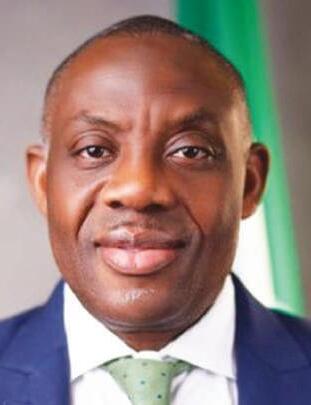
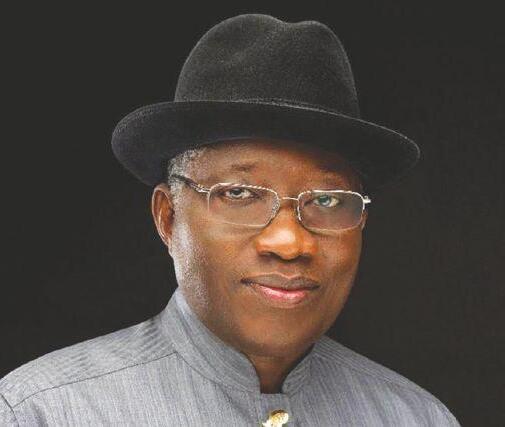
to seek their support.
One of the reports claimed that Jonathan met with former Nigerian military president, General Ibrahim Babangida (rtd.) last week in his Hilltop Mansion in Minna, Niger State, and briefed him on his desire to run for one term in 2027.
The current attempt to lure Jonathan into the presidential race is not the first attempt since he lost power to the All Progressives Congress (APC).
In 2023, a failed attempt was made to draft him into the race on the platform of the APC.
However, with the allegations and counter allegations of betrayals that trailed Jonathan’s defeat by Buhari in 2015, many doubt the authenticity of claims that he had succumbed to the PDP’s pressure.
While Jonathan felt betrayed by the members of the PDP in the 2015 presidential election, others accused him of not keeping to an unwritten agreement said to have been made in 2011 to do only one term.
He had denied entering such a pact and challenged his accusers to provide evidence.
In the book, ‘Against the Run of Play’,
written by the Chairman of THISDAY’s Editorial Board, Mr. Segun Adeniyi, the former president alleged that he was betrayed by the party leaders in the north, including the then National Chairman, Adamu Muazu.
“I felt really betrayed by the result from some northern states. Perhaps for ethnic purposes, even security agents colluded with the opposition to come up with spurious results against me,” Jonathan said.
“What happened was very sad not for me as a person, but for our democracy. Take, for instance, the PDP national chairman, Alhaji Adamu Mu’azu. I believe he joined in the conspiracy against me. For reasons best known to him, he helped to sabotage the election in favour of the opposition.”
However, in a post on his Facebook page in April 2017, Muazu denied the allegation. Jonathan, after the 2015 general election, shunned the activities of the PDP.
Speaking in July 2022 when he hosted members of Delta Central APC Leaders of Thought on a solidarity visit to his Abuja residence, the late Leader of Pan Niger Delta Forum (PANDEF), Chief Edwin Clark, explained that Jonathan no longer associated with the PDP because of the
betrayal and ill-treatment he received when he sought re-election in 2015.
Clark alleged that the PDP leaders from the north, including the governors and then national chairman, Mu’azu, worked against Jonathan, and also raised funds for Buhari, against Jonathan, their own presidential candidate.
However, a former vice chairman of the ACF, Senator Joseph Waku, had countered Jonathan and his supporters, insisting that he did not do his research before trusting those he later accused of betraying him, adding that “authentic northern leaders” made it clear from the beginning that they were not going to vote for him.
However, despite shunning the activities of the PDP after losing the 2015 presidential election, Jonathan had in April 2017 argued that the loss of the presidential election in 2015 did not in any way diminish the grassroots popularity and size of the main opposition party.
Jonathan made the remarks while receiving a delegation of the PDP Strategy Review and Inter party committee led by Professor Jerry Gana, who visited him to give him their report.
“PDP is still the biggest and the strongest party, irrespective of what happened in the 2015 general election. Yes, we lost the presidential election but that doesn’t diminish us,” he said.
The former president expressed optimism that the PDP would bounce back to reckoning by 2019, adding that the party still had the most penetrating structures in every part of the country. Unfortunately, PDP did not bounce back in the 2019 general election as he predicted.
Rather than bounce back, PDP’s political fortunes were further depleted by internal crises fueled by those masquerading as party leaders and members but working for the ruling APC.
Many believe that the high level of insecurity and economic hardship inflicted on Nigerians by the APC-led administrations since Jonathan lost power in 2015 has brightened his chances of return to power on the platform of the PDP.
But a former Kaduna Central lawmaker, Senator Shehu Sani, had advised him against contesting, warning that the PDP, which he rode to victory with in 2011, is now fragmented and weakened. Will Jonathan trust those that betrayed him and accept the party’s ticket? Can the PDP use Jonathan to regain power in 2027?
These are some of the questions agitating the minds of anxious Nigerians.
FG’s perceived Insensitivity to ASUU’s Demands
Last Tuesday, lecturers under the Academic Staff Union of Universities (ASUU) held protests across campuses nationwide, to press home their demands from the federal government.
The lecturers had fixed Tuesday, August 26 to conduct the nationwide protest across campuses, following a National Executive Council (NEC) meeting held at the Usmanu Danfodiyo University, Sokoto, between August 16 and 17.
ASUU’s President, Professor Christopher Piwuna, said the outcome of the August 28 meeting with the government would decide the next line of action of the union, which could be an industrial action.
Piwuna said the union had tried several strategies to resolve the dispute with the Nigerian government, including writing multiple letters, but the government failed to address the issues. He, therefore, called on
members to protest en masse.
The union had accused the federal government of dragging its feet on the implementation of the draftrenegotiated2009agreementsubmittedbythe Yayale Ahmed-led committee in February. It said the report was ignored for months until the government called ASUU for a meeting on August 11.
It also accused the government of attempting to subvert the principle of the Collective Bargaining Agreement (CBA) in addressing issues in the draft agreement.
ASUU had also lamented that President Bola Tinubu’s government failed to address other concerns of the union, including the payment of the remaining three and a half months salaries withheld in 2022, following the government’s declaration of a ‘No work, No Pay’ policy during the union’s eight months strike.
Tinubu paid four of the eight months’ salaries in 2024, but the union maintained it needed to be paid in full.
Also,renegotiationeffortsforthe2009agreement stalled since 2017 with multiple draft agreements between ASUU and the government-appointed committee ignored by the previous administration of the late Muhammadu Buhari.
The country’s economy is so bad that it would not be fair for students to be allowed to spend extra years in school.
Interestingly, President Tinubu, when he was campaigning for office, had promised that under his presidency, there would be no strike in Nigerian schools.
Itisthereforesurprisingthatthefederalgovernment has remained insensitive to the demands of the union.
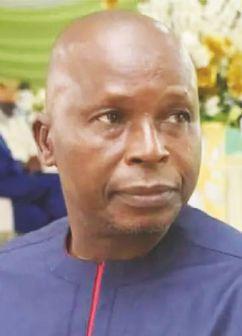
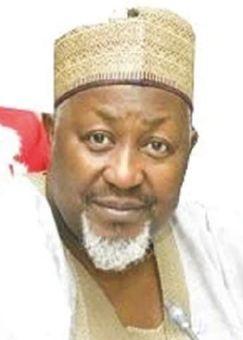
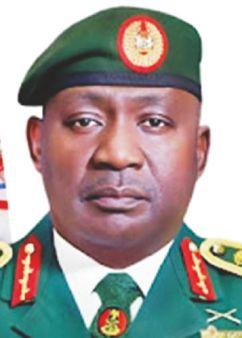
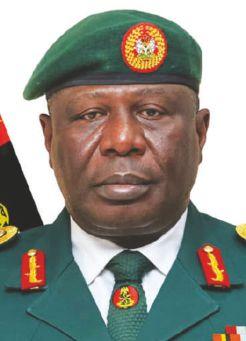
Eyes on Fagbemi to Give Justice to 38 Army Officers
Last week’s emphasis by the Minister of Justice and Attorney General of the Federation, Lateef Fagbemi, for justice to be fair and applied without bias, has validated the need for him to deliver justice to the 38 senior officers of the Nigerian Army who were unjustly retired in 2016 by mandating the military authorities to comply with the courts’ decisions on their cases
The Minister of Justice and Attorney General of the Federation (AGF), Mr. Lateef Fagbemi (SAN), last week, emphasised the need for justice to be fair and applied without bias to retain the credibility of the judicial system.
Speaking at the inauguration of a project titled: ‘Strengthening Right-Based Approach to Administration of Criminal Justice Act (ACJA) Framework and Advancing Women, Peace and Security (WPS) in Nigeria’ in Abuja, he said that there was the need to strengthen justice delivery, enhance accountability, and ensure protection of citizens’ rights.
The AGF, represented by the Assistant Director, Ministry of Justice, Mr. David Emmanuel, said justice remains central to Nigeria’s judicial system, adding that the Federal Ministry of Justice remained committed to supporting initiatives that promote the rule of law, protect human dignity, and entrench a rights-based approach in governance.
“The project being inaugurated is both timely and strategic as it seeks to advance two critical objectives: The full implementation of the ACJA in 12 states of the federation and the effective operationalisation of the women, peace, and security agenda in five states.
“The Act has already proven to be a transformative legal framework at the federal level, and extending its full application across the states will further deepen respect for human rights, promote spirituality, and reduce the incidence of prolonged detention,” he said.
On his part, the Administrator of the National Judicial Institute (NJI), Justice Babatunde Adejumo, noted that justice would lose its credibility when tilted in favour of or against any gender or person.
He stated that upholding gender neutrality in the administration of justice was essential to strengthening the rule of law, ensuring equal rights, and promoting public trust in the judiciary.
He called on judicial officers and other stakeholders to guard against stereotypes or prejudices that might influence legal outcomes, reiterating that justice must be guided strictly by facts, evidence, and the law. Adejumo also affirmed the judiciary’s commitment to promoting equity, fairness, and impartiality for all citizens, irrespective of gender.
It is common for Nigerian government officials to pontificate and preach what the
government does not practice.
Since Fagbemi assumed office in 2023 as the chief law officer of Nigeria, the 38 senior military officers whose careers were truncated by the former Chief of Army Staff, Lt-General Tukur Buratai (rtd.) in 2016 have been crying for his attention.
The officers were forced out of service without recourse to due process, fair hearing and rules of disengagement in the Nigerian military.
Most of the affected officers, who are still young and have a lot to offer Nigeria, were neither queried nor indicted by any panel or charged before any court-martial.
They were flushed out for reasons that smacked of high-level disregard for law and witch-hunting by authorities of the army.
The 38 officers subsequently petitioned the then President Muhammadu Buhari in line with the military’s rules to seek redress. But even after petitioning the former president, their fates still hang in the balance.
Having lost confidence in the ability of the military authorities to give them justice, several of the officers approached the National Industrial Court (NIC) to clear their names and rebuild their careers. As of the last count, the Army had lost all the cases as it could not provide any shred of evidence to substantiate the false accusations against the officers.
But despite the various courts’ judgments, which were all in favour of the officers, the Nigerian Army and former President Buhari refused to reinstate the soldiers, who are some of the country’s brightest in internal and external security operations.
One of the officers, Ojebo Ochankpa, died in 2017 while waiting for justice, leaving a widow and three children.
A security expert, Labaran Saleh, regretted that the stories of the personnel “remain a cautionary tale for the country.”
He noted that none of them faced any formal charge issued to them, or a court-martial panel before their dismissal.
Saleh said the Armed Forces Act prescribes steps to be taken in punishing offences but doesn’t empower the
Army Council to arbitrarily punish or retire officers. He warned that if the 38 officers do not receive justice, “the direct and proximate result is the destruction of the morale of those still in service, with the resulting impact on efficiency and commitment. The impact on the effectiveness, cohesion, and dedication of the Army is best imagined.”
“Why will the Nigerian Army not obey court orders? Are they above the law?” Saleh queried.
On July 27, 2023, one of the affected officers, Lt. Col. Abdulfatai Mohammed submitted a letter to President Bola Tinubu’s office, urging the president to prevail on the army to obey the court orders that declared his retirement illegal. Mohammed said he wrote the letter based on the “avowed commitment to justice” the president indicated in his “inauguration speech.”
His letter revealed a harrowing tale of woes, pains, hardship, difficulties, and injustices he and his colleagues had experienced. It displayed, particularly, the insensitivity and indifference of the Nigerian Army to their plight.
Mohammed is one of several officers who went to the NIC to clear his name. Others who obtained judgments ordering their reinstatement include Generals Ijioma and Saad, Colonels Hassan, Suleiman, Arigbe, Dazang and AS Mohammed.
Stakeholders have argued that the case of the 38 officers is a litmus test for this administration’s avowed commitment to the rule of law.
According to them, Tinubu should insist that the military authorities obey the rule of law by ensuring that the Nigerian Army complies with the valid and subsisting court orders
They noted that the Army has a history of revisiting wrongful retirements and correcting them by reinstating the affected officers.
They cited the case of Major General Ahmadu Mohammed who was reinstated in January 2016 after being compulsorily retired.
General Mohammed was the General Officer Commanding 7 Division in 2014 when his troops mutinied and fired at his vehicle.
The soldiers accused him of dereliction of duty and sending them to the battlefield with minimal logistics support thereby leading to many deaths. Most of those soldiers were court-martialled and sentenced to death.
Similarly, Amnesty International accused General Mohammed of ordering the deaths of many Boko Haram prisoners at the Maimalari Barracks and indicted him in their report
forwarded to the federal government.
However, in January 2016, the Nigerian Army recalled and reinstated him. In a press statement, the Nigerian Army’s spokesman at that time, Brig Gen SK Usman, said: “Although, it is not an aberration for the international human rights body to raise such an observation, however, it did not take into cognisance the circumstances leading to his illegal retirement and the legal procedure that was followed in his reinstatement. The compulsory and premature retirement of Major General Mohammed did not follow due process and was rather arbitrary. The senior officer was never charged, tried, let alone found guilty of any offence that justified his premature retirement.
“The action was therefore a clear violation of extant rules, regulations, as well as Terms and Conditions of Service of the Armed Forces of Nigeria. This obvious violation prompted the senior officer to seek redress using the appropriate legal means. Consequently, the realisation of these omissions called for a review of the case by the Army Council and his subsequent reinstatement into the service.”
Saleh noted that Mohammed’s case set a precedent that should be applied in the case of Army 38.
A retired senior officer, who pleaded anonymity said: “For me, it feels like a case of cheating. You see these young men have had their careers stolen from them. No one should ever be made to feel that way, it leaves a sour taste and that is unfair.”
The senior officer added that a letter was recently written by renowned human rights lawyer, Mr. Femi Falana (SAN), on the matter, yet nothing has been done.
With the Army exhausting its appeal on the judgments in favour of the officers, stakeholders have urged the AGF, in his capacity as the chief law officer of the country and the Minister of Defence to compel the Army to comply with the decisions in the interest of justice and fairness.
The AGF equally needs to let the Army know that it is ridiculing the courts by not obeying their decisions, and this is an indication of impunity and lawlessness on the part of the Nigerian Army.
Fagbemi needs to collaborate with the Minister of Defence to bring this issue to a quick resolution in the interest of justice. Nigeria cannot continue to be like a lawless country. Courts orders and judgments must be respected and obeyed, no matter what. This, the AGF must ensure.
Israel’s Genocidal Crimes against Journalists: Complicity and Implications for the United Nations
The conduct and management of contemporary international relations is increasingly done in disregard to international humanitarian law. States and citizens of the world consciously and unconsciously condone or promote the disregard. Those who disregard international law are majorly the big, powerful countries and their allies. Those who disregard it unconsciously are the weak countries that adopt laisser-faire policy.
In the Russian special military intervention in Ukraine, have there not been allegations of war crimes and genocide? If there are, who is prepared to challenge Russia? War crimes and genocidal crimes are outlawed in international law and relations but who bothers about the war infractions? What does Israel’s genocidal crimes mean to the United States? Who has time to challenge the United States that aids and abets Israel’s genocidal war against Palestinian- Gazans?
Israel’s war objective can be classified into two main groups: declared and undeclared. Declaratively, Israel wants to completely destroy the Hamas, free the Israelis taken into hostage on October 7, 2023, prevent Gaza from being a threat the security of Israel, and ensure the return of displaced residents of Northern Israel. Non-declaratively, Israel’s war behaviour clearly shows an objective of total neutralisation of Gaza, make it completely free from any Palestinian Hamas and facilitate the settlement of Israelis there. This undeclared objective requires also the neutralisation of any obstacles to the objective.
Thus, Israel consciously cares less about international humanitarian law obligations. In fact, the internationally-protected people, such as hospitals, non-combatants, children, etc. are the visible victims of Israel’s war crimes. It is precisely the journalists, particularly the war reporters, photo journalists covering conflicts that are increasingly targeted by Israel for killing. This is most unfortunate, especially with the silence over the genocidal attacks on the journalists who are reporting the genocidal attacks.
Israel’s Genocidal Crimes against Journalists Genocide is not simply about military shooting to kill, but also involves the instrumentality of genocidal acts. When people are deliberately denied access to needed good water, food or medical care, this cannot but be one path to genocide. Indeed, it is an element of genocide. The Israelo-Gaza conflict has been largely characterised by catastrophic hunger in every nook and cranny of Gaza.
It is useful to note at this juncture the importance of the geostrategic location of Gaza in international relations and why it has become the cynosure of Israeli eyes. As told by a French historian, Jean-Pierre Filiu, who is on record to have written the best-selling book on Gaza’s history, ‘Gaza has been since Antiquity a prosperous oasis and a commercial hub that served as a springboard for any Middle Eastern empire to conquer Egypt and for the Nile Valley-based power to attack the Levant.’
Additionally, and more importantly, the Columbia University has it that ‘this imperial pendulum went back and forth for centuries until the British Army, led by Allenby, entered Gaza in 1917, on the very day that the Balfour Declaration was made public in London. But worse was to come in 1948 with Gaza turning into enclave of a geographical strip and one quarter of the Arab population of Palestine now crowded on only 1% of their homeland, Since then, Israel has waged no less than 15 wars in Gaza, all won militarily but lost politically… except for the first Intifada that paved the way for the first Palestinian peace process.
With Israel’s genocidal attacks, the Hamas has lost much control of Northern Gaza Strip but still showing presence in Southern Gaza and still keeping more than 100 Israeli hostages. The international community has been cautiously condemning Israel over its widespread destruction and death toll but to no avail. The more problematic aspect of the death toll is the conscious targeting of professional journalists covering the war contrarily to provisions of international humanitarian law. Several national laws not only recognise, but also assigns specific roles
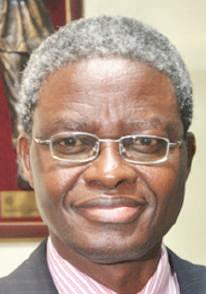
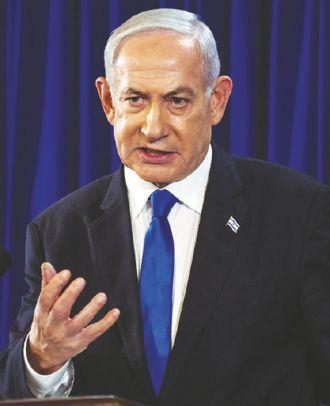
•Netanyahu
to professional journalists in the conduct and management of international peace and security beyond their basic roles of public information and education.
Again, when discussing the protection of individual journalists, it is important to differentiate between the state protection of journalistic information, the sources of such information, preventing obstacles to investigative journalism, and confidentiality, etc. on the one hand, and the safety and security of the individual journalist, on the other. Member Nations of the international community have regulatory provisions on the safety of journalist.
For example in Britain, there is the Human Rights Act of 1998 which protects the right to freedom of expression, that is, the right to receive and impart information which is a major pillar of journalism. The need to protect confidential journalistic sources is also recognised by British courts. In fact, there are also the Online Safety Act of 2023 and the National Security Act 2023, both of which are still generating much debate. The importance of the need to ensure the safety of journalists in Britain can be better appreciated in the context of the establishment of a National Committee for the Safety of Journalists.
In France, there are constitutional guarantees for free expression and media independence. France gives active support to international conventions and initiatives to safeguard journalists in armed conflicts. UNESCO’s efforts to establish national safety mechanisms
The United States is using its abuse of international law to strengthen Israel’s genocidal crimes. Nothing could be more shameful for the good American people who have been preaching the gospels of human rights, rule of law, constitutional democracy, fairness and justice to have a new America under Donald Trump that is now consciously throwing the principle of pacta sunt servanda into the dustbin of history. In diplomatic practice, every diplomatic mission is considered exterritorial in its receiving state, meaning that the municipal law of the host country is not applicable. This is why the 1961 Vienna Convention on Diplomatic Missions expressly provides for prior permission of an accredited Ambassador before his host government can enter his diplomatic mission. As such, the United Nations Headquarters in New York is not and cannot be subjected to the whims and caprices of American politics because it creates a political and administrative lull when people intending to attend UN meetings must first obtain US entry visas but are refused. True, the US has the sovereign right to issue or refuse its entry visas. The problem, however, is that the US does not have special entry visas for visitors to the UN headquarters. The US revocation of entry visa already issued to the Palestinian President, Mahmoud Abbas and 80 Palestinian officials allegedly for undermining peace efforts and for seeking ‘the unilateral recognition of a conjectural Palestinian state,’ to borrow the words of Marco Rubio, the US Secretary of State, is most unfortunate. This conflict between International law and the US municipal law is a resultant of the Israelo-Palestinian conflict and increasing criticisms of Israeli genocidal crimes against Palestinian Hamas and journalists. The genocide must stop unconditionally because of its many negative implications
and the European Media Freedom Act are also supported. Put differently, Article 34 of the French Fifth Republic Constitution provides for the freedom, pluralism, and independence of the media. And true enough, France not only upholds the European Media Freedom Act (EMFA), which protects journalists from political interference, enforce media editorial independence, and improve transparency in media ownership, but is also actively committed to the Council of Europe’s Recommendation CM/ Rec(2016)4 which deals with the prevention, protection, prosecution, and promotion of the safety of journalists. France is an active supporter of the Journalism Trust Initiatives by Reporters without Borders (RSF), which is fostering reliable information and ethical journalism.
At the level of international law and relations, there is no specific international convention on the safety and independence of journalists. What exist are frameworks of initiatives like the UN Plan of Action on the Safety of Journalists and the Issue of Impunity as well as the International Federation of Journalists that has drafted a Proposed Convention for the Safety and Independence of Journalists.
Without whiff of doubt, the United Nations has a Plan of Action on the Safety of Journalists. It is the primary framework meant to create a safe and free environment for journalists to ensure the prevention, protection and prosecution of crimes against journalists in the course of their professional duties. The official reports of the Director-General of the UNESCO are also noteworthy. They monitor attacks and assess the effectiveness of national protection frameworks.
In spite of the comprehensive frameworks aimed at protecting journalists worldwide and in spite of the provisions of international humanitarian law, how do we explain the little or no respect for the protection of journalists in international security relations?
The UN General Assembly is on record to have passed several resolutions calling for action to end impunity for crimes committed against journalists in the course of their official duties and call for action to strengthen the implementation of the UN Plan of Action. Why is Israel flagrantly engaging in genocidal crimes against the Hamas? Why is the world keeping mute on the aftermath of South Africa’s court case against Israel at the International Court of Justice (ICJ)? Why are countries in Africa keeping mute on the annihilation of professional journalists in the prosecution of their official duties? All journalists fall under the internationallyprotected citizens of the world. Why is the world not applying the rule of IR2P (International Responsibility to Protect) in this case of Israel’s glaring genocide? What really are the international obligations created by international law and why are they not respected but only respected in violations? What are the implications and particularly for the future of Africa. Like Nigeria, who has the foreign policy objective of respecting international law and treaty obligations?
Implications of International Silence
The first interpretation of non-action against impunity for genocide is deductive complicity or endorsement of the alleged genocidal crimes. Under normal circumstance, the UN Plan of Action is to be executed by UN Member States and all stakeholders. Professional associations and organisations, governmental and non-governmental organisations ought to work together to implement the UN Plan of Action. They are supposed to jointly ensure that all those who engage in genocidal crimes are brought to justice, as well as raising public awareness and advocating legislation and policies aimed at protecting journalists.
Even though the United Nations has designated every November 2 of each year as the International Day to End Impunity for Crimes against Journalists, the recidivist Israeli genocidal crimes against innocent journalists have become unacceptable. The implication of not seeking to end impunity is an express invitation to more genocidal crimes. It is a wrong signal that genocide is a permissible crime. Whenever it is committed, heaven will not fall is the belief. It is because heaven may not fall that explains why the International Federation of Journalists, in its draft International Convention on the Safety and Independence of Journalists and other Media Professionals (vide ifj.org) showed deep concerns in Article 12 of their Convention that ‘despite these various instruments and undertakings, media professionals continue to face barriers in the exercise of their professional role because of their investigative work, opinions and reporting, including killing, torture, violent attacks, forced disappearance, arbitrary arrest and arbitrary detention, expulsion, intimidation, harassment and threats of violence.’
Article 19 of the International Covenant on Civil and Political Rights (ICCPR) provides for the fundamental right of freedom of opinion and expression, that is, the right of holding opinion without interferences from others, seeking and receiving information, as well as imparting ideas, communicating information in various forms (oral, written, artistic, or any other chosen media). The ICCPR is a multilateral treaty done on 16 December, 1966 by the UNGAand which entered into force on March 23, 1976. It commits Member States to the respect of individual’s civil and political rights. Its basic principles include the right to life, prohibition of torture, freedom from slavery, liberty and security, equality before law, freedom of thought opinion and expression, freedom Read full article online - www.thisdaylive.com
FABLES, FANTASIES, FALLACIES AND FACTS
no. Conspicuously listed as item No 25 on the exclusive legislative list were “mines and minerals, including oilfields, oil mining, geological surveys and natural gas”. The exclusive list means only the federal government can legislate on such items. Yet, we are being told the constitution granted resource control! But don’t blame the 1963 Constitution — even 1960 placed these items as No 25 on the exclusive list. From the time Nigeria adopted the federal structure, mines and minerals, including oilfields, oil mining, geological surveys and natural gas have been on the exclusive list. Are we confusing derivation with resource control? Section 140 (1) of the 1963 Constitution said: “There shall be paid by the Federation to each Region a sum equal to fifty per cent of (a) the proceeds of any royalty received by the Federation in respect of any minerals extracted in that Region; and (b) any mining rents derived by the Federation during that year from within that Region.” It is a replica of 134 (1) of the 1960 Constitution: “There shall be paid by the Federation to each Region a sum equal to fifty per cent of (a) the proceeds of any royalty received by the Federation in respect of any minerals extracted in that Region; and (b) any mining rents derived by the Federation.”
The popular fable built on this is that the regions were paid 50 percent derivation on oil revenues. In truth, the 1963 Constitution provided for 50 percent derivation from “rents” and “royalties” — not “revenues”. The oil revenues — from petroleum profit tax (PPT) and corporate income tax (CIT) — went entirely to the federal government as the owner of the “mines and minerals” while host regions took half of the “rents” (on the oilfield)
THE ‘NEW’ PDP
It seems the leaders of the Peoples Democratic Party (PDP) have finally decided to say “enough is enough” in an effort to save their party from a certain extinction. They have confirmed Alhaji Umar Damagum as the acting national chairman, zoned presidency to the south, and scheduled the national convention for November to elect a new national working committee. If all goes to plan, the PDP will effectively be rescued from the paws of Chief Nyesom Wike, the FCT minister, and may mount a serious challenge in 2027 polls if it can go on to rebuild. Things have really gone south for the party (pun not intended) but it would be criminal for them to give up without a fight. Observing.
and “royalties” (a fixed sum on every barrel). Today, they get 13 percent of oil revenues. Also, they share from rents, royalties, PPT and CIT which are paid to the federation account, plus host community fund and contributions to the NDDC by the oil companies.
And now to the latest, fast-growing fallacy: that until there is a referendum on a constitution, it is not “We, the People” that wrote it. Who invented this fantasy? The world’s oldest written constitution — from which we borrowed plenty — is that of the US. Can you believe that most of the thinking and drafting was done by James Madison, often referred to as the “Father of the Constitution”? Can you believe the 1787 constitutional convention was attended by appointed (not elected) delegates? Can you believe only 55 delegates attended the convention and only 39 signed the document? Yet, our distinguished opinion leaders gleefully refer to the US Constitution as written by “We, the People”.
Of course, there is no constitution in the world written by “We, the People”. It is impossible. It is always a few people that draft constitutions before they are debated and adopted. Even the constitution of the Nigerian Bar Association (NBA) was not written by all lawyers. The US constitution was ratified in 1788 when New Hampshire cast the deciding vote to meet the threshold of nine out of the 13 states that existed then. That constitution has now been amended 27 times and NONE went through a referendum. As I have always argued, there is nothing wrong with amending a constitution to reflect contemporary realities. It is described as a “living document” for a reason.
In Nigeria, we have amended the 1999
Constitution five times. These are our own processes: a bill for amendment is proposed by (or at) the National Assembly, where there are 469 elected representatives of 230 million Nigerians (535 lawmakers represent 340 million Americans while a maximum of 550 represent 1.45 billion Indians); it is then subjected to the participation of “We, the People” via public hearings and submission of memoranda; two-thirds of the federal lawmakers are required to pass an amendment; at least 24 state houses of assembly are thereafter expected to ratify. Effectively, the amendment is considered passed, with presidential assent only a seal. In the US, an amendment requires two-thirds vote of both houses of Congress or two-thirds of the 50 states. It must then be ratified by three-fourths of the state legislatures or three-fourths of the ratification conventions called in each state. In India, the parliament can amend the constitution on their own, except the alteration will affect the states — in which case at least half of the 29 states must concur. In both federations, no referendum is required. Maybe I should repeat this: some countries, such as the UK and Israel, don’t even have any document called “constitution”. They are governed by conventions, acts of parliament and, above all, competent leadership. Just saying. Lest I forget, Awo was, in a sense, on the moon. Per credible sources, the fable was rooted in a half-truth: during Awo’s 1959 nationwide campaign, a chopper used flare technology to design his image with his iconic V sign across the sky at night. That created the fairytale passed on to generations. Incomplete information is deadly. I reckon that some of those campaigning for a new constitution have some knowledge but it is only
And Four Other Things…
WOMEN ONLY
A bill proposing to amend the constitution to create special legislative seats for women in the National Assembly is currently undergoing consideration. If it passes, there will be 74 new seats in the federal legislature and 108 in state assemblies to be contested only by women. This is to engender the gender agenda. But why do we always think making new legislations is the solution to our problems when all we need is political will? For a start, why don’t we promote gender equity in appointments, which are so easy to make? All we do is keep blowing up the size of government and the expenditure on public officers without thinking of where the money will come from. Absurd.
TARIBO’S TIRADE
Taribo West, one of the most patriotic Nigerians and dogged defenders to have worn the national colours, sounded very angry and bitter about the death of Peter Rufai, his former teammate, whom he felt was neglected at his point of need. He threatened to advise his own son not to play for Nigeria. I can understand his disappointment and fury. However, how can this problem be solved? How can retired professional players stop relying on charity? What is the sustainable way of achieving this? Could it be a special pension scheme? Or a private trust fund? I don’t know the best option, but I doubt the global practice is for government to sustain them in retirement. Unrealistic.
STILL ON RMAFC’S NEW FUNDING ARRANGEMENT
mentioned how stable and independent funding allowed the Internal Revenue Service (IRS) of the United States, the Canadian Revenue Agency (CRA) and the South African Revenue Service (SARS) to deploy modern technology, attract top professionals, and block leakages. It is possibly lost on him that the three institutions that he referenced are tax agencies, the equivalents of our Federal Inland Revenue Service (FIRS). Could it be that Mohammed wants RMAFC to replace FIRS? Is he admitting that RMAFC might be surplus to requirement in some areas? Or is he saying that those tax agencies started bringing in more revenue because they were monitored/supervised by institutions similar to RMAFC, his beloved revenue watchdog? And if this is what he meant, could he kindly oblige us the names of such watchdogs in those countries and how their oversight marked the turning point in revenue optimisation? And by the way, it is worth stating here that IRS, CRA and SARS are not funded through the special dispensations that have bestowed on RMAFC and our revenue-collection agencies. We will return to this too.
Mohammed disclosed some of the things RMAFC would splurge its windfall on: build data centres and monitoring hubs, deploy its staff nationwide to monitor revenue at source, set up a training institute, deploy advanced technology etc., etc. He managed, maybe unwittingly, to confirm the fears that the commission is set to embark on the usual binge and to find excuse to spend money simply because it is available. Before long, RMAFC will invent reasons to balloon its staff strength, to have offices in all states and possibly all local government areas of the country, to build a new headquarters, to buy countless operational vehicles, to undertake endless local and foreign trainings and study tours etc., —all in the name of being able to effectively discharge its “constitutional” mandates and to “save our democracy from fiscal predation.” It is the predictable pattern in which agencies stretch expenditure to match available revenue. It is a form of Parkinson’s Law.
Now, to the substantive issues. The first is the way most government agencies corral “inadequate funding” as a convenient excuse, then use their role
(even if tangential) in revenue mobilisation as a form of blackmail. The functions of RMAFC are spelt out in Section 32 of the Third Schedule of the 1999 Constitution and in Section 6 of the commission’s establishment act. There are basically four of them: to monitor revenue accruals to and disbursements from the Federation Account; to review revenue allocation formula; to set the salaries and allowances of political office holders; and to advise federal and state governments on measures for increasing revenue.
The budgetary allocation for RMAFC has been within the N2 billion to N3 billion range for a while. Let’s accept without conceding that an average of N2 billion annually is inadequate for RMAFC, does this really affect its capacity to carry out all its functions? The obsession, for obvious reasons, is about monitoring revenue and disbursements but the main responsibility of revenue commissions in a federal system is recommending, based on evidence and consultation, the review of the revenue allocation formula. How much is needed to do that? How many times has RMAFC recommended new formulas in the past 36 years of its existence? How has an average of N2 billion annually impeded the capacity of the commission to review emoluments of political office holders and to advise governments on how to increase revenue? How many of such has the commission undertaken? What aspect of its work has RMAFC exceeded expectations with the “little” it has had? Who has read any groundbreaking and policy-altering study done or commissioned by RMAFC on measures for improving revenue to the Federation and to the various tiers of government? And even on the part of its function that it has chosen to prioritise (and which is rarely the main focus of other countries’ revenue commissions), how has an annual budget of N2 billion impeded its work? I have not found a compelling reason that inadequate funding is what has undermined RMAFC’s capacity to effectively carry out basic functions such as reviewing revenue allocation formula or advising governments on revenue generation or even for tracking revenue accruals and disbursement, which it has conveniently elevated as its sole reason for being.
half — it can be as deadly as zero knowledge. On my part, I am determined to make sure we don’t pass these fallacies to future generations. I have been working on a book to address this disturbing trend. I hope to publish it in the first quarter of 2026, God willing.
Let me state here that not all the campaigners have a bad intention. Fairplay. Some genuinely believe in what they are doing. The problem is that they just take these received wisdoms as gospel without bothering to do their independent research or undertake a fact-check. Some dogmatically pontificate and advocate a position probably because it aligns with their sentiments and biases or serve their own agenda. Still, it is a fable to say the 1963 Constitution gave new or extraordinary powers to the regions. It is more baffling that the 1960 and 1963 constitutions are on the internet but many don’t care to read them. If you want to hide anything from gullible Nigerians, put it in the constitution!
I want to emphasise this: even though I am irrevocably committed to promoting one, united Nigeria because I am fully persuaded that our root problem is bad leadership and not ethnic diversity or amalgamation, I am no longer opposed to the disguised campaign for balkanisation. Nigeria would not be the first country to break up. The world won’t come to an end. Enough of the threats and emotional blackmail. It is getting boring. However, I will keep countering manipulative narratives. If we must break up, it shouldn’t be facilitated by a campaign built on fables, fantasies, falsehoods, fabrications and fallacies in place of facts. Otherwise, our latter end might be worse than the former.
NO COMMENT
President Tinubu recently travelled to Japan and Brazil for bilateral talks. My main interest is what he said in Brazil. “The reforms I’ve embarked upon since I took over in Nigeria have been very impactful. I can beat my chest for that. It was initially painful, but today the result is blossoming. It’s getting clearer to the people. We have more money for the economy — no more corruption,” he said. There is no more corruption in Nigeria? Jokes? Except he meant the corruption in petrol subsidy and forex management, I would only guess that Tinubu is trying to “spoil market” for Rt Hon Rotimi Amaechi who has promised that if elected president, he would end corruption within one month. Hahahaha.
I am not a bit convinced that increasing funding to RMAFC is what will make the revenue-generating agencies to bring more money to the Federation Account. It is not RMAFC that sets the targets for and supervises these agencies. FAAC has enjoyed significant increase in revenue in the last two years largely on account of the depreciation of the national currency, and that has nothing to do with RMAFC.
The second issue is about the appropriate way to make adequate provision for public institutions. There may not be just one right way of doing this, but there are certainly a few bad ways of doing it. Allocating agencies a fixed percentage of some revenue streams is one of such bad ways. It creates more problems than it solves. In trying to address the challenge of inadequate and unpredictable funding, we end up with special agencies that become governments within government, flush with more money than they need, and inexorably serving as avenues for off-budget spending, patronage, resource misallocation and even corruption. In the particular instance of RMAFC, what should have been done is to ascertain if indeed there is a funding gap and to bridge that gap in a reasonable way, including maybe by routing its increased funding through statutory transfers as done for the National Assembly, the National Judicial Council (NJC) and a few constitutional bodies.
But granting a portion of non-oil revenue to RMAFC is like giving it a blank cheque to do as it pleases. And without missing a beat, RMAFC chose to shore up its personnel budget by 565.94%, its overhead budget by 1,096% and its capital budget by a dizzying 36,538% from one year to the other. In theory, such exuberance would have been tamed by cool heads within the organisation and by the parliament. But we should know that theory and practice in this respect are worlds apart, and that it is sensible to avoid such temptations in the first place.
The third issue is related. We need to resolve whether the approval granted by the National Economic Council (NEC) is 0.05% or 0.5%. When Professor Charles Soludo, the governor of Anambra State, briefed the press after the NEC meeting of
12th December 2024, he mentioned that NEC approved for RMAFC to receive 0.05% of Federation’s non-oil revenue. NEC is an advisory body, not an approving authority. That notwithstanding, FAAC has been allocating 0.5% of non-oil revenue to RMAFC since April 2025. We need to know the authority behind what is going on. Did the President approve the recommendation by NEC and if he did, what percentage did he approve? Are the transfers from FAAC since April based on a new law, which according to a RMAFC commissioner was signed on 2nd April 2025 but is yet to be seen anywhere including on the commission’s website? If the disbursements are based on this law, is the percentage stipulated in the law, and is it 0.05% or 0.5%? Someone also needs to explain to the rest of us how we moved from 0.05% to 0.5%. It is public resources we are talking about, and we deserve to know how 0.05% became 0.5%, where and when. It should be noted that even 0.05% of non-oil revenue of the Federation would still have been a major boost for RMAFC. If 0.5% of non-oil revenue amounted to N105.14 billion, then it can be extrapolated that 0.05% of the same revenue handle would have translated to N10.51 billion. That would amount to more than tripling of the N3.27 billion that was allocated to the commission in the 2024 appropriation act. While I remain unconvinced that RMAFC needs more revenue based on its record even in basic things in the last 26 years and I do not support revenue earmarks, I will grudgingly concede that a budget of N10.51 billion in 2025 (which is 0.05% of Federation’s projected non-oil revenue) would have been more than appropriate. The difference of N94.63 billion between the N105.14 billion recently appropriated for the commission in 2025 and the N10.51 billion as 0.05% of non-oil revenue could be of better use across the country. Everything has an opportunity cost. I have tried to be as understanding as possible but I can’t find anything that justifies a 31-fold, year-on-year increase in revenue for RMAFC.
NOTE: Read full article online on www.thisdaylive.com
ENGAGEMENTS
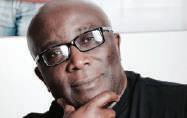
How Politics Kills Universities
In what has become a familiar ritual of Nigerian campus trade unionism, ASUU has served notice of an imminent work stoppage. It is all about long standing service agreements over benefits and allowances that have been lingering for the better part of the last few decade or more. In the popular imagination, any mention of our universities connotes an interminable disruption of academic activities and of course endless unplanned holidays for idle youth. Here we go again. The net impact of ASUU’s unpredictable labour union habits has been degrading to our university culture and its overall place in national development and culture.
The timing of this year’s ASUU strike notice is spectacularly dumb. This is the end of summer. For the last two months, pages of our newspapers have been filled with happy gleeful photos of notable Nigerians attending the graduation ceremonies of their children in Europe and American universities. These are the same people that ASUU expects to take political action to pay up their overdue allowances. They mostly have their children educated in prestigious Western universities. And here we have some academic destitutes threatening to go on strike over salaries for teaching the children of poor citizens who have no choice than to be stuck in our dilapidated campuses. And ASUU expects to get a hearing ?
In the 1970s and 1980s, the Nigerian university was at the centre of all serious discourse about national development and popular welfare. Governments, mostly military, paid attention to discourse on the campuses about desirable directions for national development. As undergraduates, we were attentive to national policy trends. We cared about petrol pump prices, about living standards, about the welfare of the masses, about primary health care and quality of education. Corruption in high places was a sensitive matter. We trooped out to engage the police and even the army on key national policy issues. We braved the tear gas and the truncheons and even live bullets to oppose the government of the day on issues that concerned the welfare of the masses. We were not just participants in domestic affairs. Those were the days of active foreign policy. Nigeria was in the forefront of Africa’s new foreign policy in the late decolonization era. Nigeria was a “frontline state”, in the forefront of the final phase of the anti colonial struggle and the crucial state of the anti apartheid struggle. As undergraduates, we took positions that were even more radical than the government on Angola, Mozambique, Namibia and Zimbabwe.
Those were the days of the anti imperialist struggle when the Cold Was defined the relations among nations. The ideological divide among nations, between the communist world and the capitalist world also defined discourse in the academia. The academia were divided between the right and the left. Our disputations were fiery and warlike. Most campuses were divided. Some were more so than others. ABU, Ife, UNIBEN and UNIPORT were the hotbeds of campus radicalism. The government was interested in our debates because it impinged directly on the government’s overall ideological leaning in the international system.
The political elite heard us. They came to understand the campuses as an extension of the larger discourse in society. More importantly, the campuses became a platform for the propagation of new and often controversial ideas. Each major university made its annual convocation lecture available to major politicians to air new ideas. At Nsukka in one year, Dr. Nnamdi Azikiwe tried to put to rest the then contentious issue of power sharing between the military and the political leadership of the country. He proposed the controversial theory of Diarchy.
At Ife in one year, Chief Obafemi Awolowo questioned the wisdom in probing previous governments since there had been no consequences in the past. In that controversial speech titled “Qui Bono?”, Awo argued that resources committed to the probes of the past were essentially wasted.
In sharp contrast, today’s Nigerian university is comatose on national issues and literally
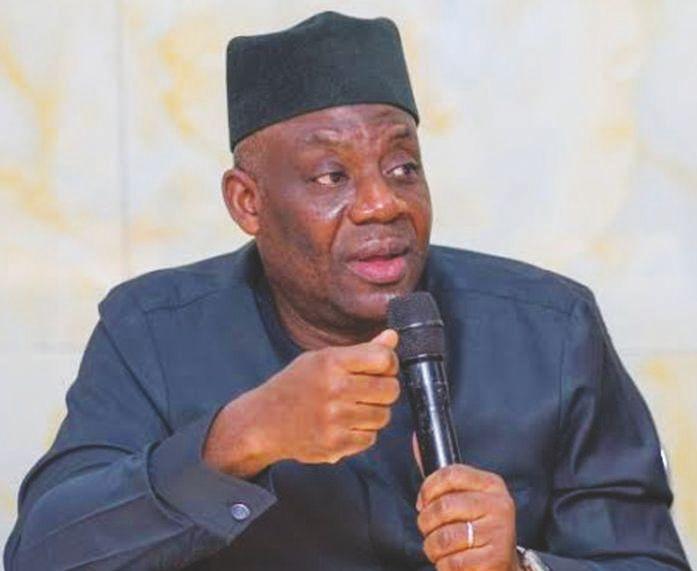
castrated in its attitude to governments and public policy. ASUU has over the decades drifted into bread and butter trade unionism. The Cold War has ended. Ideology has withered as a major source of contention. The role of government has shrunk to that of an employer of labour and a payer of salaries. ASUU’s relationship to government has been reduced to that of a perennial debtor. Government accountability has been reduced to its ability to honour its labour obligations to agreements reached with campus unions.
In return, student unionism has become consumed by the general exhibitionism and showmanship of the current political dispensation and culture. Crass partisanship has taken over student unionism. Student union officials now hire retinues of aides and officials with the same outlandish and foolish nomenclature as roadside politicians. They disturb the peace of campuses with the same noisy sirens as their partisan patrons and principals.
Among the students body, favourite pastimes now include cybercrimes, kidnapping, blackmail leading frequent suicides, ritual murder for body parts in return for quick cash. There is hardly any Nigerian campus today in which any serious issue of national policy is being canvassed. Instead, it is all about transactions that catapult paupers into billionaires, skit makers into mega tik tok entrepreneurs overnight. The same very students bring huge SUVs and outlandish automobiles to campus in which many lecturers are on foot. This is the landscape of the Nigerian university campus today. Perhaps a some what equivalent development is taking place on the American university campus since the onset of Trump’s second coming.
The return of Donald Trump to the White House has unpturned the tradition of university culture in America especially in relation to its role in national development and culture. Since the foundation of America, the university has played four vital roles: it has been a mirror of the culture and tradition of freedom of enquiry and political freedom; it has been the pillar of a science based free society in which the fruits of science and technology have complimented a free market economy to grow a free economy; an avenue for the propagation of the freedom of peoples all over the world for which America has been associated and universities have been associated with the freedom of entry and exist of persons into America to partake in the pursuit of the American dream as the magnet of a diverse immigration driven society.
Since his return to the White House, President Trump has driven a wedge among all these roles of the American university. He has sought to block funds for the endowments of major universities like Harvard, Yale and Princeton. He has used the immigration powers to block the visas of graduate students. He has sought to evict graduate students who hold known anti Semitic views. He has sought to curtail the entry of students from China and other destinations into American universities. Most dangerously, he assault on federal funding for scientific research in major universities has threatened America’s leading edge in global science and technology. He has even threatened free speech on university campuses especially to the extent that such exercise of freedom has to do with the interests of Israel.
In general, universities have a way of preserving the past and foreshadowing the future of the society that gives them life. We send the youth to acquire higher education to light up the pathway to a future. The dreams of a new society and the values that should inform future development are encapsulated in the dreams, aspirations of the young men and women that throng university campuses during
the foundation years of every society. The ideals of freedom and justice through enlightenment and knowledge to cut the frontiers of a new world embodied in the rise of America as a force of new world civilization were embodied in the culture of the university.
The American dream came to be anchored as well in the conquest of poverty that a college degree would guarantee. Most importantly, the freedom of enquiry, the endless quest for knowledge, the exploration of the unknown universe of science were part of the spirit of America. It was a spirit that encouraged the questioning of dogma and the interrogation of received dogma in all fields of human knowledge. The values that held society itself were not immune from the critical inquiry and rigorous interrogation which sustains university culture. Freedom of expression and inquiry are values shared by democracy and the university as an institution. When university campuses erupt in protest and revolt, something is wrong with the democratic environment. Since the re-emergence of Donald Trump in the White House, the turmoil and turbulence that has engulfed America’s governance has spread to even its most treasured campuses. Harvard, Princeton and Yale have not been spared the authoritarian incursions of Trump’s meddlesome and disruptive politics. University funds are being withheld. Admissions policies have come under the axe of bureaucratic intervention. The right of universities to teach certain courses as well as their right to admit students from certain parts of the world or students who hold certain views have all come under the investigative ambit of an all prying State Department.
Curiously, universities also live or die with the politics of the society that feeds them. If the American university declines in the wake of the Trump assault on American politics and culture, it will find a rough equivalent in the decadence of the Nigerian university following the decay of political values in Nigeria’s present political decadence.
Edited by: Duro Ikhazuagbe
email:duro.Ikhazuagbe@thisdaylive.com
S’Africa’s Foster Sends Warning Signal to Nigeria with Stunning Goal
Victor Osimhen replies with first goal of the season in Turkey
Duro Ikhazuagbe
South Africa’s striker, Lyle Foster, has alerted Nigeria of the danger he’s capable of inflicting on the Super Eagles when both country meet in a decisive 2026 World Cup qualifier in Bloemfontein on September 9.
But Victor Osimhen similarly replied the Bafana Bafana striker with his first goal of the new season for Galatasaray against Rizespor in the Turkish Super Lig on Saturday night. The Turkish capital city team won the clash 3-1.
In England, Foster scored a goal and had another disallowed for his English Premier League team, Burnley against Manchester United at Old Trafford. Although the struggling former giants of the English topflight, Manchester United, won the encounter 3-2, Foster is listed in Bafana Bafana’s final 23-man squad to play against Lesotho and Nigeria in the September World Cup qualifiers.
Foster was denied another goal in the clash with the Red Devils by VAR.
The big centre-forward posted a good performance overall in this entertaining clash that has brought temporary respite to United’s Ruben Amorim.
Current South Africa Head Coach, Hugo Broos, must be feeling satisfied with the form displayed by Foster yesterday as the Belgium-born gaffer continues to strategize on how to sustain the momentum of leading the World Cup Group C till last Match day.
The Super Eagles will confront the Amavubi of Rwanda in a Matchday 7 encounter at the Godswill Akpabio Stadium, Uyo on Saturday, 6th September before flying to Bloemfontein to take on South Africa in a Matchday 8 fixture on Tuesday, 9th September.
Bafana Bafana are leading
AHeAD wOrLD CUp QUALIFIer
the standings on 13 points, six points ahead of fourth-placed Super Eagles with four rounds of matches still to be played.
However, South Africa are at the risk of losing three points and three goals for fielding
an ineligible player against Lesotho. Should that happens, Bafana Bafana’s lead will be cut down to just three points advantage over Nigeria.
Meanwhile, Super Eagles Head Coach, Eric Chelle, on
Friday listed Captain William Ekong, midfielders Alex Iwobi and Raphael Onyedika, and forwards Ademola Lookman and Victor Osimhen in Nigeria’s final list of 23 players for next month’s 2026 FIFA World Cup qualifying matches against Rwanda and South Africa.
Surprisingly, injured Stanley Nwabali was listed just as defenders Calvin Bassey, Olaoluwa Aina and Bright Osayi-Samuel, midfielders Wilfred Ndidi, Fisayo DeleBashiru and Frank Onyeka, and forwards Simon Moses, Samuel Chukwueze and Cyriel Dessers made the cut.
Greece-based goalie Adeleye Adebayo returns to the group, alongside Unity Cup sensations Felix Agu and Benjamin Fredericks, and forwards Christantus Uche and Tolu Arokodare, who both impressed in the friendly with Russia in Moscow on 6th June this year.
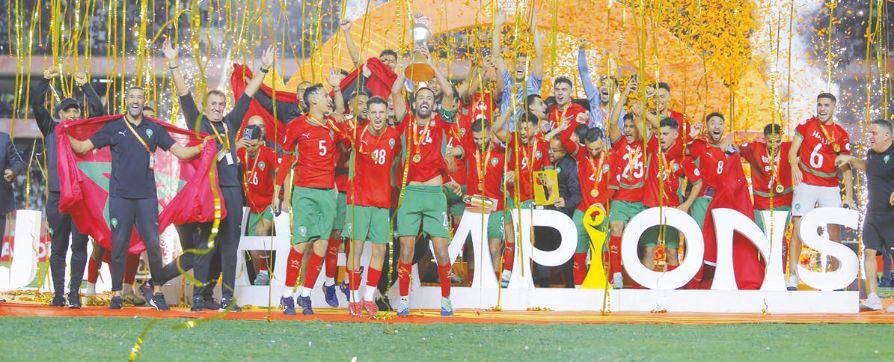
Lamlaoui Brace Seals Third Historic CHAN Trophy for Morocco
Morocco secured a record third African Nations Championship (CHAN) title after overcoming first-time finalists Madagascar 3-2 in a pulsating final at the Moi International Sports Centre, Kasarani, on Saturday.
The Atlas Lions, champions in 2018 and 2020, were tested to the limit by a spirited Malagasy side, but ultimately their pedigree and experience paid
Ikorodu City Aiming for Full Points against El Kanemi
Ikorodu City will be shaping up for their first home game of the Nigeria Premier Football League (NPFL) against El-Kanemi Warriors tonight inside the Mobolaji Johnson Arena, Onikan in Lagos with victory on their minds.
The Oga Boys pulled off a 0-0 draw at Kwara United last weekend despite featuring nine NPFL debutants and a new head coach in Ali Kandil after the departure of Aweroro to Shooting Stars.
El-Kanemi, on the other hand, started with a 2-0 win over Insurance in Maiduguri.
Last season, which was City’s
debut campaign in the NPFL, they scored 48 goals at home, 15 more than champions Remo Stars who netted the second highest number of goals at home. So, NPFL followers will expect this game to flow with goals considering Kandil was part of City’s coaching setup under Aweroro’s management and will want to continue with the same team ethos.
Both teams have met just twice in the NPFL and City are unbeaten on both occasions (W1 D1). Ikorodu City saw off El-Kanemi 2-0 in this same fixture with Ayomide Cole and Shola Adelani scoring second half goals.
off with their third title.
Star striker Oussama Lamlaoui was once again the difference, scoring twice — including a spectacular 40-yard effort — to finish as the tournament’s top scorer with six goals.
Victory earned Morocco the gold medal and USD3.5 million prize money, while Madagascar’s gallant run
re SULTS
NPFL
B’Insurance 1-1 3SC
TODAY
Warri Wolves v Rangers
Bayelsa United v Barau FC
Enyimba v Niger Tornadoes
Kano Pillars v Wikki Tourists
Plateau United v Katsina
United
Rivers United v Kwara United
Nasarawa United v Abia
Warriors
Ikorodu City v El-Kanemi
Warriors
Monday
Kun Khalifat FC v Remo Stars
Premier League
Chelsea 2-0 Fulham
Man Utd 3-2 Burnley
ended in silver and a USD1.2 million prize.
The final capped an extraordinary month-long tournament co-hosted by Kenya, Tanzania and Uganda, the first time CHAN has been staged across three countries. Nigeria’s
The 8th edition of the Lagos International Badminton Classics came to a thrilling close at the Okoya Thomas Indoor Hall, Teslim Balogun Stadium, as Indonesia emerged the undisputed star of the tournament, sweeping the podium across multiple categories in a final day packed with drama, passion, and top-class shuttle action.
Day four — the grand finale — lived up to its billing as fans and players witnessed an electric atmosphere befitting one of Africa’s biggest badminton showcases. With $17,500 in prize money at stake, the finals delivered a masterclass of skill, endurance, and national pride.
The day opened with the Mixed Doubles final, where Indonesia’s Prasetyo and Munggaren
overwhelmed India’s Ravat and Maneesha in straight sets (21-15,
Home-based Eagles crashed out from the group stage.
Stadiums were consistently full, atmospheres electric, and the football competitive until the last whistle.
As the fireworks lit up Nairobi, Morocco stood tallest once
again, their blend of resilience, organisation, and Lamlaoui’s brilliance proved decisive. For Madagascar, it was heartbreak but also a new dawn, their silver medal inspiring belief that fairytales can still be written in African football.
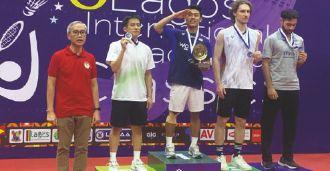
21-17) to be crowned champions. In the Men’s Singles, the much-anticipated duel between Japan’s Minoru Koga and Indonesia’s Pradiska Shujiwo had fans on edge. Koga showed grit but could not match Shujiwo’s
relentless firepower. The Indonesian secured a hard-fought 21-15, 21-17 win, boosting his international ranking from his current world No. 63 position and affirming himself as one of badminton’s rising stars.

HAPPY WEDLOCK…
Mr.
and
SIMO N KOLAWOLE
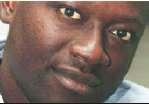
Fables, Fantasies, Fallacies and Facts
How would I ever forget 1983 in my life? My cousin (now of blessed memory) told us Chief Obafemi Awolowo said if he did not win the presidential election, he would relocate to the moon. After the disputed election, won by President Shehu Shagari, we gathered every night in our compound in the village to stare at the moon or into a bucket of water to see the reflection of the sage. And, trust me, we clearly saw Awolowo and his wife on the moon! We were so sure of our delusion. Mind you, I was already a secondary school student. Some of my relatives were much older than I was and were in higher classes. But we were all stupid enough to believe the fable, whose origin we didn’t know. What about 1986? I overheard my grandmother’s friend telling her something was going to happen on the night of March 8 and we must all stay indoors, otherwise all sorts of evil would come upon us. I obeyed and went to bed early. That was how, ladies and gentlemen, I missed the sighting of Halley’s comet — a spectacle most people see just once in their lifetime. It becomes
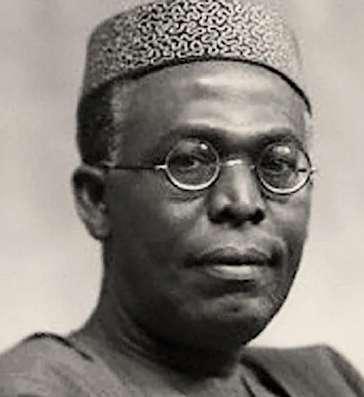
fell for the fable. In my defence, I didn’t know she was talking about Halley’s comet. The next sighting is around 2061. Are you thinking what I am thinking? Well, only God knows... Some fables are benign and serve entertainment purposes. I can live with that. The manipulative fantasies that scare me are the toxic ones that have destructive effects. The facts are so mangled that it is obvious the motive of the purveyors is purely malign, some intended to knock the head of one part of the country against the other: pitching ethnic group against ethnic group and religion against religion. The fables and fallacies ultimately promote bitterness and strife in national debate and damage the chances of building a virile nation. Sadly, these things are being promoted by some of the most respected, educated and influential Nigerians, so how would the people not believe them?
I will now proceed to discuss a few. Ye have heard that it hath been said by them of old time that the 1963 Constitution is the greatest thing since jollof rice. That constitution, ye have been told, had a better provision for derivation on oil revenues and more or less granted resource control to the regions, thereby giving us “true” federalism. Some
of the distinguished promoters of this narrative have fabricated so many fables, fantasies and fallacies around their pet project that you would think all we need to conquer the pervasive poverty, disease, conflict and unemployment in the Federal Republic of Nigeria is to go back to the 1963 Constitution. Our lives will never be the same again! But now I tell ye a “new” thing: there is NOTHING special about the 1963 Constitution on derivation. Thank God, I no longer swallow hook, line and sinker everything I hear from Nigerian elders. Like the Berean Christians who always fact-checked the apostles by diligently searching the scriptures to be sure they were not being told fables, I am wiser now. I have studied the 1963 Constitution inside out. It is a replica of the 1960 Constitution but for three key changes to (1) reflect that Nigeria had become a republic by decolonising the position of head of state (2) replace the UK Privy Council with the Supreme Court as Nigeria’s highest court (3) list the newly created Mid-Western Region. Now, did the 1963 Constitution grant control over mineral resources to regions? The answer is
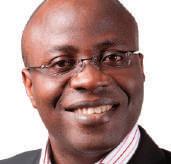
Still on RMAFC’s New Funding Arrangement
Last Sunday, I wrote about the stratospheric leap in the 2025 budget of the Revenue Mobilisation, Allocation and Fiscal Commission (RMAFC), arising from a new funding arrangement that might have issued from a good place but was clearly ill-considered and is guaranteed to lead to the usual profligacy and other abuses. RMAFC was recently handed a boon of 0.5% of the non-oil revenue of the Federation to run its operations. The immediate impact of this baffling upgrade is that the revenue of the commission was projected to jump from N3.27 billion in 2024 to N105.14 billion in 2025, a year-on-year increase of 3,115%. And not surprisingly, RMAFC planned and got legislative approval to spend the entire N105.14 billion in one year, notably by hovering up its capital spending from N206.07 million in 2024 to N75.5 billion in 2025, a staggering 36,538% increase from one year to the other.
One Ibrahim Mohammed, clearly at the instance of RMAFC, contested my position which he claimed is an “ill-conceived narrative” that betrays “a fundamental misreading of history, constitutional
design and Nigeria’s present fiscal challenges.” His rejoinder was published on Wednesday in THISDAY and entitled “RMAFC’s New Funding: A Strategic Safeguard for Nigeria’s Democracy and Federalism.” He made many fantastic claims about how RMAFC was conceived as “the referee of Nigeria’s federal compact.” He then argued that the 0.5% revenue earmark granted to the commission would correct past errors which “crippled Nigeria’s economy, stunted diversification, and left the Federation Account in perpetual crisis.”
Deploying a flurry of fine words, Mr. Mohammed created the impression that multiplying the funding for RMAFC is the panacea to everything that ails not just public finance but also economic growth, federalism and democracy in the country. There is a lot to process from his leaps of logic. But Mohammed is entitled to his views. He, however, veered into wilful misrepresentations, which might mislead those not paying close attention to certain things. I will quickly address a few of his distortions, then return to the substantive issues around RMAFC itself and the special but suboptimal ways through which we fund a few government agencies, and which we need to stop.
Mohammed waxed lyrical about how Nigeria’s “founding fathers and nationalists” conceived RMAFC and how the 1999 Constitution, “like previous constitutions,” made the commission a permanent constitutional body. The only problem with this fictional rendition of history is that RMAFC came into existence in 1989, a creation of the military via Decree 49 of that year. Mr. Mohammed will be factual only if we are ready to accept General Ibrahim Babangida and his military colleagues as Nigeria’s founding fathers and nationalists. Also, RMAFC was not listed in the constitutions that predated the 1999 Constitution. There is no way that Nigeria’s constitutions from 1922 to 1979 would have had a provision for RMAFC, which only came into being in 1989. It is possible though that Mohammed took poetic licence with the expression “… the 1999 Constitution, like previous constitutions, elevated RMAFC to the status of a permanent constitution body.”
It is true that Nigeria had eight revenue commissions/committees before RMAFC was established. But these commissions, from the Philipson Commission of 1946 to the Okigbo Commission of 1980, were all ad-hoc commissions/
committees and they were not written or elevated to permanent or even temporary bodies in any of the constitutions. Four of these commissions were set up pre-independence (Philipson, 1946; Hicks-Philipson, 1951; Chicks, 1953; and Raisman, 1958) and their existence couldn’t have been attributed to the visions of Nigeria’s founding fathers and nationalists, except Mohammed is granted the extraordinary liberty to use such words loosely. All the eight commissions pre-RMAFC had a few members, a limited timeframe, and a single agenda, which was to recommend new formulas for sharing revenue among the tiers of government within the Federation. It might be more optimal for the country to return to this ad-hoc format instead of having another permanent and forever evolving bureaucracy that will be insultingly brandished in our faces as the solution to everything and the one and only saviour of our federalism and democracy. We will return to this shortly.
To justify the 0.5% boon to RMAFC, Mohammed leaned on the usual crutch: global best practice. He
